Sites: news | india | latam | brasil | indonesia
Feeds: news | india | latam | brasil | indonesia
topic: Sharks
Social media activity version | Lean version
Undercover in a shark fin trafficking ring: Interview with wildlife crime fighter Andrea Crosta
- Worldwide, many of the key players in wildlife trafficking are also involved in other criminal enterprises, from drug smuggling to human trafficking and money laundering.
- In an interview with Mongabay, Andrea Crosta, founder of Earth League International, talks about the group’s new report on shark fin trafficking from Latin America to East Asia and the concept of “crime convergence.”
- International wildlife trafficking, including the illegal trade in shark fins, is dominated by Chinese nationals, Crosta says.
- Since smuggling routes often overlap and criminal groups frequently work together across borders, Crosta calls for field collaboration among countries and law enforcement agencies to fight wildlife crime, the world’s fourth-largest criminal enterprise.
CITES halts Ecuador’s shark trade; trafficking persists amid lack of transparency
- Ecuador is one of the top exporters of sharks in the world.
- In February, the Convention on International Trade in Endangered Species of Wild Fauna and Flora (CITES) suspended commercial trade in sharks and rays from Ecuador, after the country had failed to take measures to guarantee sharks were being fished sustainably.
- Protected species from Ecuador enter Peru through the cities of Tumbes and Piura. The fins are then sent to Asia, but the meat is sold in local markets.
- A lack of transparency has made it difficult to stem this criminal trade, according to experts consulted by Mongabay Latam.
Rewilding program ships eggs around the world to restore Raja Ampat zebra sharks
- A rewilding project aimed at saving endangered zebra sharks (Stegostoma tigrinum is sending eggs from aquarium sharks more than 12,000 kilometers (7,500 miles) away to nurseries in Raja Ampat.
- After hatching, the young sharks are kept in tanks until they are strong enough to release into the wild.
- Researchers hope to release 500 zebra sharks into the wild within 10 years in an effort to support a large, genetically diverse breeding population.
- A survey estimated the zebra shark had a population of 20 spread throughout the Raja Ampat archipelago, making the animal functionally extinct in the region.
Son of Cali Cartel leader tied to Colombia-Hong Kong shark fin trafficking
- Although Colombia banned the fishing and trading of sharks in early 2021, their fins — taken from sharks in Colombia and around the world — have continued to feed a global industry worth $500 million per year.
- This is the story of the largest seizure of its kind ever carried out in Colombian territory. A shipment of more than 3,400 shark fins destined for Hong Kong was intercepted at the airport in Bogotá in September 2021.
- For the first time, this investigation reveals the owner of this contraband: Fernando Rodríguez Mondragón. He is the son of the late Gilberto Rodríguez Orejuela, who was the leader of the Cali Cartel, once one of the largest drug trafficking organizations in the world.
- This investigation reconstructs the shipment’s route from the department of La Guajira, on the border with Venezuela, to Colombia’s capital, passing through the mountains in the department of Valle del Cauca.
Summit on migratory species sides with science, throws shade on deep-sea mining
- Representatives from 133 member states of the Convention on the Conservation of Migratory Species of Wild Animals (CMS) met in Samarkand, Uzbekistan, from Feb. 12-17 to discuss measures to protect migratory species on a global scale.
- Many decisions at the meeting, known as COP14, focused on the protection of marine species, including the listing of several species in the convention’s appendices, a draft decision on vessel strikes, and an updated resolution on climate change that urges parties to take measures to protect species from future threats.
- The convention also adopted a resolution urging parties not to engage with or support deep-sea mining until more scientific evidence is acquired. This resolution garnered criticism from the secretary-general of the International Seabed Authority (ISA), the U.N.-mandated body that governs deep-sea mining in international waters.
- While attendees say COP14 had many successes, some experts say that more action and resources are required to keeping species from sliding toward extinction.
In East Java, social media push against Indonesia shark & ray trade lacks bite
- Over a period of four months in late 2023, Mongabay spoke with fishers and traders dealing primarily in rays and sharks in Indonesia’s East Java province.
- Advertisements for shark and ray products continued to feature on social media platforms despite pledges by companies to prevent users from conducting transactions in wildlife.
- Indonesia’s fisheries ministry said more needs to be done to enhance traceability to crack down on trade in protected shark and ray species.
DNA probe uncovers threatened shark species in Thailand’s markets
- A shark DNA investigation has revealed the presence of shark species threatened with extinction in products commonly sold in Thailand’s markets.
- The study identified products derived from 15 shark species, more than a third of which have never been recorded in Thai waters, highlighting the scale of the international shark trade.
- Marine conservation groups say the findings underscore that consumers of shark fin soup and other shark products could well be complicit in the demise of threatened species that fulfill vital roles in maintaining ocean balance.
- Experts have called on Thai policymakers to improve traceability in shark trade supply chains, expand marine protected areas, and make greater investments in marine research.
Global shark deaths increasing despite finning bans, study shows
- A new study finds that shark mortality increased by 4% in coastal fisheries and decreased by 7% in pelagic fisheries, between 2012 and 2019, despite legislation to ban shark finning increasing tenfold over this period.
- Based on these findings, experts say shark finning regulations may not be effective in decreasing shark mortality, and may even create new markets for shark meat.
- However, the study also shows that successful management of shark fisheries can lead to a decrease in mortality; such is the case with retention bans and other measures taken by regional fisheries management organizations.
2023’s top ocean news stories (commentary)
- Marine scientists from six international research and conservation institutions share their list of the top ocean news stories from 2023.
- Hopeful developments this past year include a monumental global treaty to protect biodiversity on the high seas and the regulation of international trade in 97 species of sharks and rays under the Convention on International Trade in Endangered Species of Wild Fauna and Flora (CITES).
- At the same time, 2023 was the hottest year on record, with widespread bleaching of corals in the Caribbean and Great Barrier Reef, and many more hot years forecast as humanity’s emissions of greenhouse gases that cause global warming continue.
- This post is a commentary. The views expressed are those of the authors, not necessarily Mongabay.
Still on the menu: Shark fin trade in U.S. persists despite ban
- An Al Jazeera investigative report has revealed that the trade in shark fins is still happening in the U.S. despite legislation banning the activity.
- The report also showed illegal shark finning operations occurring in Peru, currently the world’s largest exporter of fins due to laws that make this export legal, and in Ecuador, where sharks are landed in high volumes.
- A year ago, the international convention on wildlife trafficking enacted shark trade bans, but this has not yet stamped out the global fin trade, prompting experts to call for better enforcement and scrutiny.
‘Shark dust’ helps researchers ID threatened species in Indonesia fish trade
- Researchers have developed a new tool to identify a wide range of threatened and protected sharks being processed at fish factories in Indonesia.
- The method relies on DNA analysis of “shark dust,” the tiny fragments of skin and cartilage swept from the floors of fish-processing plants and export warehouses.
- From 28 shark dust samples collected from seven processing plants across Java Island, they found the genetic sequences of 61 shark and ray species.
- About 84% of these are CITES-listed species, meaning there are official restrictions in place on the international trade in these species.
The ex-shark fishermen teaching schoolkids how to protect the environment
- Shark conservationist Kathy Xu joined with ex-shark fishermen on the Indonesian island of Lombok to launch The Dorsal Effect.
- The eco-enterprise teaches students about the marine environment through snorkeling trips, coral health checks and beach trash cleanups.
- The Dorsal Effect helps provide an alternative source of income for the former shark fishermen of Lombok and aims to stop the shark finning trade.
Congo’s waters are hotspot for endangered sharks & rays, reveals data from artisanal fishers
- A new shark census off the coast of the Republic of the Congo relied on hard-earned trust between researchers and artisanal fishermen.
- The team found endangered sharks and rays on potential nursery grounds, including juveniles and two species thought to be gone from the region.
- The authors recommend conservation strategies to protect endangered species without harming the livelihoods of Congolese fishermen.
Lethal or not? Australia’s beaches are a crucible for shark control methods
- For decades, Australia’s east-coast states have attempted to keep beachgoers safe from sharks by deploying entangling shark nets and culling species deemed dangerous.
- Recent figures published by the state of New South Wales reveal that almost all the animals caught in the nets during the 2022/23 summer season were “nontarget” species, including turtles, dolphins and endangered shark species, the majority of which died due to entanglement in the nets.
- In contrast, the west-coast state of Western Australia has abandoned a shark culling regime in favor of nonlethal alternatives, such as drone monitoring and “eco barriers,” swimming enclosures that keep marine life out but do not risk entanglement.
- Despite calls from environmental groups to exclusively adopt nonlethal technologies, shark control programs are continuing in both New South Wales and its northern neighbor, Queensland, during the 2023/24 Australian summer.
Indonesian illegal shark and ray exports remain rampant amid poor monitoring
- Indonesia allows the trade of some endangered shark and ray species, but illegal exports remain rampant and unchecked.
- Mongabay-Indonesia conducted an investigation earlier this year to learn about the regulations, the loopholes and the challenges within the complex trade and fisheries of sharks and rays.
- The investigation found that the lack of oversight in the field was the leading cause of illegal shark and ray trade in the country.
- Indonesia is home to more than a quarter of the world’s 400 known shark species; a fifth of all shark species are endangered.
Sharks deserve our appreciation and protection (commentary)
- Shark Awareness Day is celebrated on July 14 every year: though widely feared and sometimes vilified, sharks actually play a key role in ocean health and are rarely a threat to humans.
- “We must all take action to protect sharks, and raising awareness and educating others about the importance of sharks is a great spot to start,” a new op-ed argues.
- This article is a commentary. The views expressed are those of the author, not necessarily of Mongabay.
Brazil claims record shark fin bust: Nearly 29 tons from 10,000 sharks seized
- Brazilian authorities announced the seizure of almost 29 tons of shark fins, exposing the extent of what they described as illegal fishing in the country. The previous record for the largest seizure reportedly took place in Hong Kong in 2020, when authorities confiscated 28 tons of fins.
- The seized fins, reportedly destined for illegal export to Asia, came from an estimated 10,000 blue (Prionace glauca) and anequim or shortfin mako (Isurus oxyrinchus) sharks, according to Brazil’s federal environmental agency IBAMA. Shortfin makos recently joined the country’s list of endangered species.
- IBAMA is filing infraction notices and fines against two companies over the seized fins. Other firms remain under investigation for illegal shark fishing related to the seizure, according to the agency.
- Through detailed analyses of the origins of these fins, an IBAMA statement said the agency identified a wide range of irregularities, including the use of fishing authorizations for other species and the use of fishing gear to target sharks.
Several reef sharks at greater threat of extinction than thought, study shows
- A new study found that five key reef shark species — gray, blacktip, whitetip and Caribbean reef sharks, and nurse sharks — declined by 60-73% worldwide.
- It also indicated that all five species would qualify as endangered on the IUCN Red List.
- Early results from the study were used to escalate the status of two of the five species to endangered, but the others are still considered to have a lower extinction risk.
- The study also showed that well-governed or protected reefs had healthier shark populations.
Colombia: Scientists explore remote seamounts to protect hammerhead sharks
- Since 2000, the Malpelo and Other Marine Ecosystems Foundation has conducted 40 expeditions on and around Malpelo Island, a rocky outpost about 500 kilometers (310 miles) off Colombia’s Pacific coast.
- These expeditions have allowed the foundation to gather information about the area’s population of scalloped hammerhead sharks (Sphyrna lewini) and to discover this critically endangered species’ breeding areas.
- They’ve also influenced the expansion of the Malpelo Fauna and Flora Sanctuary and UNESCO’s declaration of it as a World Heritage Site.
- Malpelo Foundation researchers hope their new expeditions to the area’s seamounts, which form a vital corridor for migratory species, will inform the ongoing fight against illegal fishing that threatens the hammerheads and other marine fauna.
Uterine implants and underwater ultrasounds aim to demystify shark births
- For years, studying the reproductive biology of sharks has depended on capturing the animals and dissecting them.
- Scientists recently developed the Birth Alert Tag, an egg-shaped satellite transmitter that can be implanted in the uterus of pregnant sharks to document the location and timing of births.
- In another development, scientists took ultrasound readings of whale sharks and sampled their blood to detect if they were pregnant.
- The new methods aim to help researchers determine sharks’ pregnancy status and the location of shark births; one goal is to inform the establishment of corridors to protect the animals, which are among the most vulnerable vertebrates on Earth.
Maps of sharks’ journeys show marine protected areas alone won’t save them
- A team of scientists has monitored the movement of 47 silky sharks (Carcharhinus falciformis) tagged with satellite trackers in the Galápagos Marine Reserve off Ecuador.
- They observed that the sharks travel longer distances than previously known and spend long periods of time in unprotected areas that have a high degree of illegal, unreported and unregulated fishing.
- This leaves them vulnerable to fishing pressure, the researchers say. Silky sharks are the second most commonly sold species in the international shark fin trade.
- Although governments are expanding and connecting protected areas in the region, experts say better management of the oceans and of fishing is needed to save threatened shark species from extinction.
Costa Rica announces ban on fishing of hammerhead sharks
- Costa Rica announced an all-out ban on the fishing of hammerhead sharks, specifically the smooth hammerhead (Sphyrna zygaena), scalloped hammerhead (Sphyrna lewini) and great hammerhead (Sphyrna mokarran).
- Despite being critically endangered, hammerhead sharks have been bought and sold in Costa Rica for years, with demand being driven by shark fin soup.
- Although some conservation efforts have been made in the past, the government has been heavily criticized up to now for its relaxed approach to dealing with the overfishing of hammerheads.
Study: Paying fishers to ease off sharks and rays is cost-effective conservation
- Paying fishers in Indonesia to not catch sharks and rays could be a cost-effective way of conserving these species, a new study suggests.
- Interviews with fishers at two sites shows that payments of $71,408-$235,927 per year could protect up to 18,500 hammerheads and 2,140 wedgefish at those sites.
- Researchers say this money could come from dive tourism levies, and they are already carrying out a pilot project that has seen fishers release more than 150 hammerheads and wedgefish in eight months.
- An independent expert cautions that there need to be safeguards to prevent a perverse incentive where fishers are deliberately catching these species just so they can release them and claim payment.
Good fisheries management, if enforced, can help sharks and rays recover
- Effective fisheries management, strong regulations, enforcement, and monitoring can help conserve sharks and rays, according to new research.
- Researchers found that some shark populations in the northwest Atlantic recovered after the U.S. implemented a management plan in 1993, despite ongoing fishing, while populations in areas without sufficient management declined.
- A previous study found that overfishing threatens one-third of sharks, rays and chimeras with extinction, making them the second-most endangered vertebrate group, after amphibians.
More than half of reef sharks and rays threatened with extinction, study shows
- More than half of known species of coral reef sharks and rays are already threatened with extinction, mostly because of overfishing, according to new research.
- The researchers reported that population trends were declining for 94 coral reef shark and ray species; of the two groups, rays were more threatened than sharks.
- Reef sharks and rays are typically caught for human consumption, and to a lesser extent for use in apparel or accessories, in aquarium displays, as food for domestic animals, and in traditional medicine.
- The study calls for urgent urgent measures to improve regional fisheries and marine protected areas management.
Sharks received landmark protection to combat fin trade, but the culling must stop (commentary)
- CITES CoP19 marked a historic win for shark conservation and the fight against the global trade in shark fins and meat, but an equally critical issue that must be tackled is shark culling.
- For many decades, popular culture and media, through the choice of words and visual depictions, have portrayed sharks as a threat to humans. Several countries actively kill sharks in mass numbers to control their presence near beaches.
- While shark nets and drumlines can separate the sharks from the humans at beaches, they aren’t fully effective. There are new methods that use technology, like electric shark repellents and magnetic and visual stimuli, work better to prevent human-shark encounters.
- This post is a commentary. The views expressed are those of the author, not necessarily Mongabay.
Landmark bill will ban the shark fin trade in the US
- On Dec. 15, the U.S. Senate passed legislation that will ban the shark fin trade within the nation.
- It’s estimated that fins from as many as 73 million sharks annually end up in the global market, but it is difficult to fully grasp the size and severity of the shark fin industry since much of it is unregulated.
- This forthcoming ban follows other measures to protect sharks, including the listing of many shark species on the Convention on International Trade in Endangered Species of Wild Fauna and Flora (CITES) and a ban on gear that is used to target sharks in the Pacific.
Dalian Ocean Fishing, subject of Mongabay probe, now sanctioned by U.S.
- The U.S. Department of the Treasury’s Office of Foreign Assets Control recently announced sanctions on Chinese individuals and companies allegedly involved in human rights abuses and illegal, unreported, and unregulated (IUU) fishing while operating in distant waters.
- One sanctioned company, Dalian Ocean Fishing Co., Ltd. (DOF), was the subject of two Mongabay investigations: one uncovered widespread human rights abuses, and the other exposed extensive illegal shark-finning operations within the DOF fleet of longline fishing vessels.
- China, which operates the world’s largest distant-water fishing fleet and has a long history of fisheries offenses, denounced the sanctions, saying that it is a “responsible fishing country.”
Shark-fishing gear banned across much of Pacific in conservation ‘win’
- The Western and Central Pacific Fisheries Commission has outlawed shark lines and wire leaders, both of which aid industrial-scale fishers in targeting sharks.
- Shark numbers in the open ocean have dropped by roughly 71% in the past 50 years.
- Proponents consider the measure a potentially precedent-setting move that could precede similar bans in other regions.
‘It was a shark operation’: Q&A with Indonesian crew abused on Chinese shark-finning boat
- Rusnata was one of more than 150 Indonesian deckhands repatriated from the various vessels operated by China’s Dalian Ocean Fishing in 2020.
- Previous reporting by Mongabay revealed widespread and systematic abuses suffered by workers across the DOF fleet, culminating in the deaths of at least seven Indonesian crew members.
- In a series of interviews with Mongabay, Rusnata described his own ordeal in detail, including confirming reports that DOF tuna-fishing vessels were deliberately going after sharks and finning the animals.
- He also describes a lack of care for the Indonesian workers by virtually everyone who knew of their plight, from the Indonesian agents who recruited them to port officials in China.
Podcast: How reporters uncovered a massive illegal shark finning operation
- Podcast host Mike G. speaks with Mongabay reporters who conducted recent investigations revealing a major and illegal shark finning operation by one of China’s largest fishing fleets, and the involvement of a major Japanese company, Mitsubishi, in buying that fleet’s products.
- Through an exhaustive interview process with deckhands who worked throughout the company’s fleet, the team showed that Dalian Ocean Fishing deliberately used banned gear to target sharks across a huge swath of the western Pacific Ocean.
- The Western and Central Pacific Fisheries Commission is currently meeting to discuss policies that would crack down even further on use of this gear, and we speak with Phil Jacobson who is there covering the event.
- We also speak with Japan-based reporter Annelise Giseburt who was able to verify that the illegal operation benefited greatly from selling a massive share of its tuna catch to the Japanese conglomerate Mitsubishi.
As shark numbers plummet, nations seek ban on devastatingly effective gear
- The U.S. and Canada are seeking a ban in the Pacific on two fishing devices, known as wire leaders and shark lines, that have proven devastatingly effective at catching huge numbers of sharks.
- The Western and Central Pacific Fisheries Commission (WCPFC), which governs tuna fisheries in those waters, could vote on the proposal at its annual meeting next week in Vietnam.
- The commission currently allows boats to use either shark lines or wire leaders, but not both simultaneously, but advocates for banning say that’s a loophole taken advantage of by captains and companies that ignore the rules amid scant oversight.
- Banning wire leaders and shark lines would reduce fishing mortality of oceanic whitetip sharks by 40.5% and silky sharks by 30.8%, research has found.
New protections for sharks, songbirds, frogs and more at CITES trade summit
- The 19th meeting of the Convention on International Trade in Endangered Species of Wild Fauna and Flora, or CITES, known as CoP19, ended Nov. 25 in Panama, after two weeks of negotiations.
- Member states agreed on new trade regulations for more than 600 animal and plant species, including the protection of sharks, glass frogs, turtles, songbirds and tropical timber species.
- Experts say that while these new regulations are essential, implementing and enforcing the rules will have the most significant conservation impact.
No requiem for sharks just yet as nations push to protect species from trade
- Nations party to CITES, the global convention on the trade in endangered species, are supporting three proposals to list dozens of sharks and rays from three families onto Appendix II of the convention.
- While a CITES Appendix II listing would not prohibit trade outright, it would regulate it by requiring export permits, which would help mitigate overexploitation.
- A recent study found that more than a third of sharks, rays and chimeras are threatened with extinction, making them the second-most threatened vertebrate group, after amphibians.
- The proposals are up for discussion at CITES’s 19th Conference of the Parties, or CoP19, taking place from Nov. 14-25 in Panama.
How Mitsubishi vacuumed up tuna from a rogue Chinese fishing fleet
- Last week, Mongabay revealed a massive illegal shark finning operation across the fleet of a major Chinese tuna fishing firm.
- The company, Dalian Ocean Fishing, mainly serves the Japanese market. Most of its tuna has gone to Japan’s Mitsubishi Corporation and its seafood trading arm, Toyo Reizo.
- While the general outlines of their partnership are well-documented, tracing specific tuna flows from individual fishing boats to Mitsubishi’s supply chain is impeded by the murky nature of the supply chain.
- Experts say this lack of transparency must be solved in order to prevent illegal fishing and labor abuses at sea.
‘There are solutions to these abuses’: Q&A with Steve Trent on how China can rein in illegal fishing
- Earlier this week, Mongabay published an article uncovering a massive illegal shark finning scheme across the fleet of one of China’s largest tuna companies, Dalian Ocean Fishing.
- China has the world’s biggest fishing fleet, but oversight of the sector is lax, with many countries’ boats routinely found to be engaging in illegal and destructive practices, especially in international waters.
- Mongabay spoke with Steve Trent, the head of the Environmental Justice Foundation, which has also investigated the fishing industry, about DOF’s shark finning scheme and how China can better monitor its vessels.
Exclusive: Shark finning rampant across Chinese tuna firm’s fleet
- Dalian Ocean Fishing used banned gear to deliberately catch and illegally cut the fins off of huge numbers of sharks in international waters, Mongabay has found.
- Just five of the company’s longline boats harvested roughly 5.1 metric tons of dried shark fin in the western Pacific Ocean in 2019. That equates to a larger estimated shark catch than what China reported for the nation’s entire longline fleet in the same time and place.
- The findings are based on dozens of interviews with men who worked throughout the company’s fleet of some 35 longline boats. A previous investigation by Mongabay and its partners uncovered widespread abuse of crew across the same firm’s vessels.
- Campaigners said Dalian Ocean Fishing’s newly uncovered practices were a “disaster” for shark conservation efforts.
Greenland shark, world’s longest-living vertebrate, gets long-awaited protection
- In September, the Northwest Atlantic Fisheries Organization (NAFO), an intergovernmental organization that manages fisheries, prohibited the retention of Greenland sharks in international waters.
- This ban would apply to the intentional catching of Greenland sharks as well as the retention of the species as bycatch.
- However, bycatch exceptions could be made if countries prohibit the discarding of fish.
- Greenland sharks are known to be the longest-living vertebrate in the world, reaching ages of between 270 and 500 years.
Maldives shark-fishing ban tested by ebbing support from small-scale fishers
- A 2010 blanket ban on shark fishing in the Maldives doesn’t enjoy support from artisanal reef fishers, a new study suggests.
- Many fishers blamed sharks for stealing their catches, eating into their earnings, and damaging their fishing equipment — problems they perceive have worsened since the creation of a shark sanctuary.
- These negative perceptions could result in lower compliance with fishing restrictions and undermine efforts to revive shark populations in Maldivian waters.
- Pole-and-line skipjack tuna fishers reported the greatest support for the shark fishing ban because sharks corral tuna to the ocean surface, making them easier to catch.
Where do the guitarfish go? Scientists and fishers team up to find out
- In late March and early April of this year, a team of researchers and local fishers caught, sampled and released more than 50 sharks and rays in the Bijagós Archipelago of Guinea-Bissau, including several threatened species.
- A first for conservation, researchers tagged members of a critically endangered ray species, the blackchin guitarfish (Glaucostegus cemiculus), with satellite transmitters.
- Team leader Guido Leurs says the research will provide crucial information for policymakers to better protect sharks and rays in Guinea-Bissau.
- Fisheries management within the archipelago, which spans 12,950 square kilometers (5,000 square miles) and 88 islands, is a challenge for the West African nation.
‘Why sharks matter’: Q&A with author and shark biologist David Shiffman
- In a new book, conservation biologist David Shiffman explores the importance of sharks to the world’s marine ecosystems.
- An enthusiastic “deep dive” into the latest research, “Why Sharks Matter” also addresses the threats sharks face and what scientists, NGOs and the public can do to support shark conservation.
- Mongabay caught up with Shiffman just before the May 24 release of the book.
Study finds major brands selling cat food that contain protected sharks
- Researchers used DNA barcoding to find that cat food sold in Singapore from at least 16 different brands contained threatened species of sharks, including silky sharks (Carcharhinus falciformis) that are protected under CITES Appendix II.
- Leading brands such as Fancy Feast, Whiskas, and Sheba were amongst those found to contain silky sharks and other species.
- None of these cat food products were accurately labeled to show that they contained sharks.
- Global shark populations are in sharp decline, mainly due to destructive fishing practices.
‘They’re going to get worse and worse’: Marine heat wave persists off Sydney
- In November 2021, an unusual marine heat wave materialized off the coast of Sydney; sea surface temperatures in the area have yet to go down.
- This marine heat wave is just one of numerous events occurring across the global oceans as human-induced climate change heats up the oceans.
- While marine heat waves can be triggered by a range of atmospheric, oceanic and climatic drivers, climate change plays a key role in driving these events.
Belize shows how fishers and researchers can collaborate to protect sharks
- A new study found that Caribbean reef sharks (Carcharhinus perezi) experienced a decline between 2009 and 2019 at Glovers Reef Marine Reserve, a marine protected area off the coast of Belize.
- The researchers theorized that the decline had to do with legal shark fishing that had been permitted on the edges of the MPA since 2016.
- The researchers worked with government officials and the fishing community to implement no-take zones that extended 2 miles (3.2 kilometers) around Glover’s Reef Atoll, as well as around two other sites: Lighthouse Reef Atoll and Turneffe Atoll.
- While it’s too early to tell if the new restrictions are having a positive impact, experts say they’re hopeful that Caribbean reef sharks will bounce back.
In Argentina, sport fishers are reeling in threatened sharks to save them
- Half of the shark species that inhabit the southwest Atlantic are threatened with extinction, due mostly to sport fishing and bycatch.
- In Argentina, a campaign is underway to get sport fishers to tag and release any sharks they catch.
- The campaign, as well as a ban on the killing of captured sharks, is helping address the problem.
Ecuador to announce creation of Hermandad Marine Reserve off Galapagos (commentary)
- “Ecuador is proud to announce the creation of the Hermandad Marine Reserve in the coming days,” the country’s president announces in a statement shared with Mongabay.
- Safeguarding the critical migration routes of vital species like whale sharks and sea turtles will result in healthier and more abundant populations, he says.
- Covering an additional 60,000 square kilometers near the Galapagos, in addition to the existing 138,000 square kilometers, the new reserve will ensure a safe pathway for creatures traveling to and from Costa Rica’s Cocos Island.
- This post is a commentary. The views expressed are those of the author, not necessarily of Mongabay.
Geneticists have identified new groups of tiger sharks to protect
- New genetic studies revealed at least two distinct groups of tiger sharks in the Atlantic and Indo-Pacific ocean basins, plus a third smaller population near Hawaii.
- These results are a mild surprise, due to the versatility and long swimming ranges of tiger sharks.
- Fisheries managers should take precautions to protect these distinct genetic populations, researchers urge.
Advocates welcome halt to shortfin mako shark fishing, call for longer ban
- Nations have agreed to effectively ban the fishing of endangered shortfin mako sharks in the North Atlantic from 2022 to 2023.
- Conservationists say the retention ban — which means fishers will not be allowed to land the sharks, even those caught accidentally — is a positive step, but that it’s too short to adequately help the species recover.
- It’s estimated that shortfin mako shark populations in the North Atlantic will decline by 60% over the next decade.
Study shines a light on Indonesia’s murky shark fishery and trade
- Indonesia is home to one-fifth of known shark and ray species and to the world’s largest shark and ray fishery, but a recent study reveals gaps in fisheries regulations that facilitate illegal and unregulated trade.
- Earlier this year, scientists reported that shark and ray numbers have declined globally by some 70% over the last half century, lending fresh urgency to improving fisheries regulations and limits on landings.
- The recent study revealed major discrepancies between export and import figures between Indonesia and trading partners. It also documented the complex web of domestic trade in shark and ray products and a surge in live exports.
- Authorities face challenges with verifying the origin of a vast array of processed shark and ray products, from fins and cartilage to meat and oils; new techniques that enable authorities to use DNA barcoding to identify protected species have the potential to close regulatory loopholes and protect threatened species.
Sinking hope of justice as exporter of 26-ton shark fin cargo gets token fine
- In July 2020, Ecuadoran company FishChoez & Villegas S.A. applied belatedly to the fisheries ministry for a permit to export fins from protected shark species.
- The request raised suspicion among Ecuadoran authorities as the shipment had already been sent to Hong Kong some seven months earlier.
- A review of the documentation showed the cargo matched the 26 tons of fins seized in April of the same year by Hong Kong customs officers.
- Environmental and fisheries lawyers say it appears likely there will be no accountability in Ecuador for the massive trafficking attempt, with the exporter fined less than $4,000 — just 0.3% of the cargo’s estimated value of $1.1 million.
Worked to death: How a Chinese tuna juggernaut crushed its Indonesian workers
- One of China’s biggest tuna companies, Dalian Ocean Fishing, made headlines last year when four Indonesian deckhands fell sick and died from unknown illnesses after allegedly being subject to horrible conditions on one of its boats.
- Now, an investigation by Mongabay, Tansa and the Environmental Reporting Collective shows for the first time that the abuses suffered by workers on that vessel — most commonly, being given substandard food, possibly dangerous drinking water and being made to work excessively — were not limited to one boat, but widespread and systematic across the company’s fleet.
- Moreover, migrant fishers were subject to beatings and threats to withhold pay if they did not follow orders. Many have not received their full salaries or been paid at all.
- China has the world’s largest distant-water fishing fleet, and Indonesia is widely believed to be the industry’s biggest supplier of labor. In 2019 and 2020, at least 30 fishers from Indonesia died on Chinese long-haul fishing boats, often from unknown illnesses.
If you think sharks are scary, blame Hollywood, new study suggests
- A study analyzing 109 shark-related films from 1958 to 2019 has found that 96% of them overtly portrayed sharks as potentially threatening to humans.
- “Finding Dory” was the only film in that list not to portray sharks in a negative light.
- The study’s co-author says this sustained negative portrayal by the media and Hollywood “makes people more likely to want potentially lethal mitigation techniques” against sharks.
- Humans slaughter more than 100 million sharks each year, and more than 30% of all shark and ray species are considered threatened.
Protecting Colombia’s shark paradise: Q&A with Sandra Bessudo
- 500 kilometers off the Pacific coast of Colombia lies Malpelo Island, a barren rock that marks the center of the Malpelo Fauna and Flora Sanctuary World Heritage Site and is renowned for its biodiversity, especially its shark population.
- It was Malpelo’s world-class diving that first brought French-Colombian marine naturalist Sandra Bessudo to the island. Moved by its biodiversity as well as the threats from overfishing and damaging tourism practices, Bessudo went on to become Malpelo’s best-known advocate, founding the Malpelo Foundation and successfully pushing for the island’s listing as a World Heritage Site in 2006.
- Bessudo has also produced dozens of publications and documentaries, served as Colombia’s environment minister and a presidential advisor, and influenced conservation policy through her marine research.
- Bessudo spoke about her marine conservation efforts, the challenges facing oceans, and other topics during a recent interview with Mongabay founder Rhett A. Butler.
In Gabon, a new partnership protects sharks and rays
- The diversity of habitat in Gabon’s waters creates a perfect home for a wide range of shark and ray species: from whale sharks to giant manta rays, scalloped hammerheads, and guitarfish.
- A partnership between the government and conservation NGO Wildlife Conservation Society highlights a new global initiative to save the world’s sharks and rays, launched this World Ocean Day.
- The first new law fully regulates shark and ray catches and special authorization will now be needed to target sharks and rays, and a second adds a wide range of sharks and rays to Gabon’s list of fully protected marine species.
- This article is an analysis. The views expressed are those of the authors, not necessarily Mongabay.
Shark catastrophe points to failure to enact global biodiversity agreements
- A high-profile study published in Nature found a 70% decline in shark and ray populations over the last half century.
- Like many other taxonomic groups, shark and ray declines are driven by human actions — in this case, overfishing by commercial fisheries.
- Experts are calling for a retention ban by the EU to prevent the collapse of threatened shark populations.
Sharks on a knife’s edge as Maldives mulls lifting 10-year fishing ban
- Eleven years ago, the Maldives created a 90,000-square-kilometer (34,750-square-mile) sanctuary that banned shark fishing, but fisheries minister Zaha Waheed said recently that the government may be planning to lift the ban.
- Conservationists say reopening shark fisheries in the Maldives would have devastating effects on shark populations and adversely affect tourism, which brings millions of dollars into the country each year.
- There are unofficial reports the Maldivian government will not be lifting the shark fishing ban, possibly in response to the local and international outcry.
- But a local expert says there are still grounds for concern if long-line fisheries are allowed to operate in the shark sanctuary, or if a legislative loophole is introduced that would allow shark fishing to recommence in some capacity.
From penguins to sharks to whales, swimming in circles is a surprisingly common trait
- Many marine animals are intentionally swimming in circles consecutively at a relatively constant speed more than twice, according to a new study using data from movement trackers.
- The researchers say the behavior is surprising in part because swimming in a straight line is known to be the most efficient way to move about.
- They found some of the animals swim in circles during different activities, including foraging, courtship, navigation and even possibly geomagnetic observations.
Scientists discover three glow-in-the-dark sharks
- Researchers have discovered that three deep-sea shark species — the kitefin shark (Dalatias licha), the blackbelly lanternshark (Etmopterus lucifer), and the southern lanternshark (Etmopterus granulosus) — all have bioluminescent properties.
- The kitefin shark, which glows blue, is the largest known vertebrate to emit bioluminescence.
- Further research is needed to fully understand how and why these sharks emit light.
Human impacts leave reefs short on sharks and long on moray eels
- A new study found that moray eels are more abundant on reefs where sharks are absent due to human pressures.
- The paper hypothesizes that moray eels might be benefiting from a reduction in predators and competition for food, although this hasn’t been proven.
- The authors say a lot more research is needed to assess the relationship between sharks and moray eels, and to understand the ecological role moray eels play in the marine environment.
Whale shark stranding points to silting of Indonesia’s Kendari Bay
- Volunteers and officials successfully pushed a whale shark back out to sea after it got stranded in shallow water in Indonesia’s Kendari Bay.
- The incident, which one rescuer said was a first, has highlighted the consequences of the rapid silting of the bay amid a spate of development projects in the area.
- The clearing of land allows dirt to run into waterways, with the accumulated sediment halving the depth of Kendari Bay and making flood prevention more difficult.
- Amid the silting, fishing catches have declined and there are indications of heavy-metal contamination of the water.
More Indonesian sailors repatriated from deadly Chinese fishing fleet
- Indonesia’s Foreign Ministry says another 88 of its citizens have been repatriated from a Chinese fishing fleet where six of their compatriots died under harsh working conditions.
- At least 257 Indonesian crew members have now returned this year from working on board vessels owned by Dalian Ocean Fishing; six sailors are known to have died while working, one of them dumped at sea.
- The returning sailors allege dangerous and likely illegal working conditions on board the boats, including 18-hour workdays and being forced to catch and fin sharks, including protected species, despite the vessels being tuna-fishing boats.
- Officials from three Indonesian recruitment agencies have been charged with human trafficking in connection with the case.
Breaking: Deaths of 2 more Indonesian crew uncovered on board Chinese tuna fleet
- Official documents show the deaths of two Indonesian crew members of a Chinese fishing fleet went unreported amid an outcry over the deaths of four other men and allegations of forced labor and illegal fishing.
- Saleh Anakota, 22, died on Aug. 10, three months after the deaths of four of his compatriots aboard the same boat, the Long Xing 629, drew international condemnation; Rudi Ardianto, 30, died on Aug. 8 aboard another boat, the Tian Xiang 16, in the same fleet.
- Both deaths, attributed to an unknown “sickness,” are mentioned in Indonesian Foreign Ministry documents seen by Mongabay.
- The documents also show Indonesia and China are working to bring home 155 Indonesian crew members from the Long Xing 629 and 11 other vessels owned by Dalian Ocean Fishing (DOF), a major Chinese tuna-fishing company that supplies Japanese and Chinese markets.
Efforts to tackle shark fin trade need to focus closer to shore, study says
- A new study has found that shark fins being sold in Hong Kong, Vancouver, San Francisco and northern Brazil originated mostly from shark species in coastal waters, rather than the open ocean.
- The research team analyzed 500 shark fin samples using DNA barcoding techniques, and generated species distribution models to illustrate the areas in which these sharks were likely fished.
- While these findings can help focus conservation efforts in coastal regions, they can also introduce new challenges with fishing vessel monitoring efforts, the team says.
Shark fin trafficking ring busted as trade ban comes into effect in Florida
- Federal prosecutors unveiled an indictment Sept. 4 against 12 people who they allege were involved in a conspiracy to illegally ship shark fins to Hong Kong, among other crimes.
- The indictments came just weeks before Florida Governor Ron DeSantis signed a bill into law that bans the sale and possession of shark fins in the state.
- Conservationists are divided over the effectiveness of the ban, with some saying tough federal legislation is needed and others pointing to sustainable fishery management as a better solution for shark populations.
Landed by the thousands: Overfished Congo waters put endangered sharks at risk
- More than 100 commercial trawlers and about 700 smaller boats of the Republic of Congo’s artisanal fleet are putting intense pressure on 42 shark and ray species, according to a new survey by TRAFFIC, an NGO that tracks the global wildlife trade. All are on the IUCN red list.
- The 150-mile Congo coast makes up a tiny part of Africa’s shoreline, but overfishing is taking a heavy toll. One example: Ten thousand metric tons of hammerheads were reported caught in Congo from 2007 through 2017 — the equivalent weight of 10,000 small cars.
- Republic of Congo is a signatory of the Convention on International Trade in Endangered Species (CITES), but not one CITES-listed shark species is on the country’s endangered species list. A new law aimed at meeting international commitments has been in the works since 2018, but has not been ratified by the Parliament.
- A new international market incentivized shark fishing around 2000, with the arrival of Chinese companies in Congo. The fins are exported illegally to Asia for shark fin soup, but authorities say they have no idea how the shark fins are being smuggled out of the country. Without knowledge of export routes, little can be done to prevent the illegal trade.
Sharks nearby? A bottle of seawater can hold the answer, study says
- A new study has been able to identify the presence of blacktip sharks in the waters of Terra Ceia Bay in Florida through eDNA detection in water samples.
- The water samples contained more blacktip eDNA in the spring and summer months, which is when the species uses the bay as a nursery, and less eDNA in the fall, which is when the sharks start to leave the area.
- While the current technique indicates if sharks are present in the water, it isn’t sensitive enough to provide an accurate population count.
Sharks contaminated with plastic are ‘cause for concern’
- A new study investigated microplastic ingestion in four species of demersal sharks in the North Atlantic Ocean, and found that 67% of sampled sharks contained plastic particles and fibers, pointing toward the pervasiveness of plastic in the marine environment.
- A total of 379 microplastics were found in 46 sampled sharks, with the highest number of plastics inside a single bull huss, which had 154 polypropylene fibers inside its stomach and intestines.
- Many of the plastic particles found in the sharks were fragments of synthetic cellulose, the material found in polyester clothing and hygiene products like face masks, which have become commonplace during the COVID-19 pandemic.
- The demersal sharks likely ingested the plastic through a food source, such as crustaceans, or by directly ingesting sediment from the seafloor, the study suggests.
Sharks are ‘functionally extinct’ in many global reef systems, study finds
- A new study surveyed 371 coral reefs in 58 countries, and found sharks were virtually absent from 20% of the surveyed reefs, indicating that they were functionally extinct from these ecosystems.
- The research team collected 15,165 hours of video via baited remote underwater video stations (BRUVS), and used this data to analyze shark abundance on global reef systems.
- The absence of sharks was usually connected to poor governance of nearby human settlements, including unregulated and destructive fisheries.
- While sharks were missing from many reefs around the world, other locations boasted healthy shark populations due to rigorous conservation efforts.
Shark fin stories by major media ‘misleading’: Q&A with David Shiffman
- “There are many threats facing sharks, but [finning] gets the most attention,” says David Shiffman.
- Overfishing presents the greatest threat to sharks, not the practice of finning, he says, yet finning gets the most media coverage and that consequently skews popular opinion, and policy.
- An analysis of 10 years of media reports recently published by Shiffman et al in the journal iScience shows that 2/3 of all articles in the media about threats to sharks focused on finning, and the trade in shark fins.
- “The solution overwhelmingly supported by surveyed scientific experts is not banning fishing for sharks and trade in shark products, but making fishing more sustainable,” he says in this conversation with Mongabay.
Mercury with that? Shark fins served with illegal doses of heavy metals
- A new study has found that most processed shark fins have mercury and methyl-mercury levels five to 10 times higher than the legal maximum amount of 0.5 parts per million, as specified by the Centre for Food Safety (CFS) in Hong Kong.
- The research team tested shark fins from nine of the most common species used in shark fin soup, including blue sharks, silky sharks and great hammerheads.
- While little is known about the impacts of mercury on sharks themselves, humans can suffer serious health problems when they consume mercury-rich foods over a long period of time.
- The research team say they hope the Hong Kong government will begin its own testing processes and generate accurate warnings about the mercury levels in shark fins.
Mug shots and public pics join the dots of whale sharks’ Southeast Asian trips
- A study blending old and new techniques has recorded young whale sharks returning to the same spot in the Philippines after visiting Malaysia and Indonesia.
- Scientists recorded the second-biggest aggregation of whale sharks in the Philippines in Honda Bay in the province of Palawan.
- Compared to other whale shark groups in the Philippines, the one in Honda Bay is made up mostly of juvenile males that feed on small fish and krill.
- The discovery underscores the need for stronger collaboration between the Philippines, Malaysia and Indonesia, all part of the Sulu-Sulawesi Seascape Project under the Coral Triangle Initiative.
Chinese boat that dumped Indonesian crews at sea was also shark-finning: Reports
- A Chinese fishing company under scrutiny for the deadly labor abuses of its Indonesian boat crews was likely also engaged in illegal fishing, conservationists say.
- Jakarta has demanded answers for the slavery-like conditions under which the crew members worked on board a tuna boat belonging to the Dalian Ocean Fishing Co. Ltd.
- Four of the crew members died of illness, with three of them dumped at sea; photos provided by the surviving crew indicate the boat was engaged in the illegal finning of threatened shark species.
- “[Illegal] fishing and modern slavery practices at sea are two sides of the same coin,” said Greenpeace Indonesia oceans campaigner Arifsyah Nasution.
Authorities seize record 26 tons of illegal shark fins in Hong Kong
- Hong Kong customs officials have discovered a shipment of 26 tons of shark fins from CITES-protected species, the largest of its kind ever to be seized in the region.
- Officials identified the fins as belonging to 31,000 thresher sharks and 7,500 silky sharks, which are both listed as vulnerable species by the IUCN.
- Conservationists are concerned by the large volume of thresher and silky sharks in this consignment, especially as these species are slow to reproduce in the wild.
- More than 73 million sharks enter the global shark fin trade each year, primarily to make a luxury food item called shark fin soup, although conservationists believe the demand for this soup is waning in China and Hong Kong.
DNA detective work reveals where in the ocean shark fins came from
- A team of international researchers developed a method of using DNA analysis to trace the origins of shark fins, and to determine if vulnerable and endangered species were being trafficked.
- Sharks are highly valued for their fins, which are used in a luxury food item, shark fin soup, commonly sold in Hong Kong and China. The global trade of shark fins is responsible for killing more than 73 million sharks each year.
- Using DNA analysis, the researchers identified that scalloped hammerheads, a critically endangered species, were being fished out of the eastern Pacific Ocean between Baja California and northern Peru.
- The researchers are currently working with government agencies and NGOs to help inspectors conduct rapid in-port DNA testing on shark fins to identify species and location of origin.
As COVID-19 batters fishery, Indonesia’s sharks get a respite
- The shark and ray fishery in Indonesia has largely ground to a halt as a result of plummeting demand due to COVID-19-related export restrictions and a domestic lockdown that has hit the restaurant industry.
- West Nusa Tenggara province, the heart of the country’s shark fishery and home to one of the world’s biggest markets for the species, saw trade volume drop by 68% in the first quarter of the year.
- Conservationists say this is an opportunity to evaluate and improve the fishery by beefing up monitoring and traceability to protect the sustainability of wild populations, while also supporting fishers with alternatives sources of income.
- Indonesia, which has the world’s highest diversity of sharks, allows the catch of some endangered species for domestic consumption, but loopholes effectively allow the illegal export of protected species.
Pandemic staple: Report links top tuna company to forced labor, illegal fishing
- A new report based on interviews with migrant fishers on three tuna fishing vessels operating out of Taiwan suggests that forced labor and illegal fishing practices continue within major tuna supply chains, despite efforts by companies and governments to stamp them out.
- The fishers’ allegations included deception, physical violence, wage deductions, debt bondage, passport confiscation, and excessive working hours, according to the report by environmental NGO Greenpeace.
- The fishers also provided evidence that the vessels took part in unlawful fishing practices, such as shark finning and transferring shark fins between vessels, according to the report.
- Two of the vessels that interviewees accused of these practices supply tuna to the Taiwan-based Fong Chun Formosa Fishery Company (FCF), one of the world’s largest tuna traders and the new owner of major U.S. canned-tuna brand Bumble Bee.
Bid to get ‘aquatic wild meat’ off the menu and under protection
- The term “aquatic wild meat,” or “marine bushmeat,” refers to the hunting of marine mammals, reptiles, seabirds and now some sharks and rays.
- The hunting takes place all over the world and has increased in recent years as small-scale fishers have lost access to fish and other marine resources.
- Last week, delegates representing more than 80 countries took steps to address the issue of aquatic wild meat at the Convention on the Conservation of Migratory Species of Wild Animals conference in Gandhinagar, India.
- Other outcomes of the conference included adding 10 new species to the convention’s protected lists, including the jaguar and Asian elephant, recognizing the culture of wild animals, and calling for migratory species to be considered in national climate and energy policies.
Investigation reveals loopholes for illegal shark fin exports from Indonesia
- An undercover reporting initiative by Indonesian media has highlighted loopholes that allow protected sharks to be sold abroad.
- Shark products, mostly fins, end up being exported to Hong Kong, China, Singapore, Japan and Thailand.
- In Indonesia, some endangered shark species are allowed for limited catch, but not for export, but traders find their way around this prohibition by concealing the fins from customs authorities.
- Indonesia is home to more than a quarter of the world’s 400 known shark species; a fifth of all shark species are endangered.
Recreational fishers are increasingly targeting sharks and rays, and researchers are concerned
- New research estimating the haul of recreational fishers around the world finds that sharks and rays are increasingly being targeted, and that has researchers worried.
- As of 2014, researchers estimate, about 900,000 metric tons of fish were extracted from marine waters by recreational fishers. That’s up from 280,000 metric tons in the 1950s, but still less than 1% of total global marine catches.
- The researchers found that catches of cartilaginous fish like sharks and rays has increased steadily over the past six decades, and now comprises some 54,000 metric tons, or about 6% of the annual catch for recreational purposes.
Photos: Top 15 new species of 2019
- In 2019, Mongabay covered several announcements of new-to-science species.
- The “discovery” of a new-to-science species is always an awe-inspiring bit of news; the outcome of dogged perseverance, months or years of field surveys, and long periods of sifting through hundreds of museum records.
- In no particular order, we present our 15 top picks.
Whitetip sharks declared critically endangered, but gain no protections in Pacific
- This week, the International Union for Conservation of Nature classified oceanic whitetip sharks (Carcharhinus longimanus) as “critically endangered,” citing “steep population declines” in all oceans.
- The Western and Central Pacific Fisheries Commission, a multilateral body, manages fisheries in a vast swath of the Pacific Ocean, including the large and lucrative tuna fishery that accidentally kills tens of thousands of whitetips each year.
- Whitetip sharks are predicted to become extinct in the western and central Pacific under current management practices, their numbers having declined there by around 95% since 1995.
- The commission met this month in Port Moresby, Papua New Guinea. It adopted several conservation measures, but took no new steps to protect whitetip sharks, as many scientists and conservationists had hoped.
In Indonesian waters, filter feeders can ingest dozens to hundreds of microplastic particles every hour
- Researchers looked at plastic pollution in three coastal feeding grounds in Indonesia that are frequented by manta rays (Mobula alfredi) and whale sharks (Rhincodon typus): Nusa Penida Marine Protected Area, Komodo National Park, and Pantai Bentar, East Java.
- After estimating the amount of microplastic particles that are present in the waters of their three study areas, the researchers were then able to determine how much of that plastic might find its way into the digestive tracts of reef manta rays and whale sharks.
- They found that reef manta rays may eat up to 63 pieces of plastic per hour when feeding in Nusa Penida and Komodo National Park, while whale sharks could be consuming up to 137 pieces per hour during seasonal aggregations in Java.
Can a national management plan halt Madagascar’s shark decline?
- Sharks once were plentiful in Madagascar’s waters, but a spike in demand for shark fins dating to the 1980s has led to heavy exploitation and a reduction in the fishes’ abundance and size.
- Madagascar has no national laws that specifically protect sharks. In June, though, the country released a new national plan for the sustainable management of sharks and rays.
- The plan calls for a shark trade surveillance program, a crackdown on illegal industrial fishing, more “no-take” zones, and a concerted effort to collect better data.
- Conservationists welcomed the plan as an important step — provided the country can enforce its provisions.
Education, compensation, and spiritual outreach protect threatened whale sharks
- In the 1980s and 90s, whale sharks were being killed in their hundreds off the western coast of India. Demand for the shark’s fins and meat in south-east Asia meant a fisherman could earn as much as $7,000 for a large shark.
- In 2001, India declared the whale shark a protected species. In 2004, the Whale Shark Conservation Project began its effort to spread awareness of the ban among the fishermen in the state of Gujarat, where the killing was taking place, and to convert the fishermen from hunters to protectors of the fish.
- Through a combination of community outreach, participation of a popular spiritual leader, and financial compensation, the community was convinced to stop killing the sharks. Since then, 710 whale sharks have also been rescued after getting entangled in fishing nets, while scientists have been able to tag eight sharks for research purposes.
Sri Lanka scales up its domestic campaign to protect sharks with a global push
- With the killing of sharks and rays on the rise, Sri Lanka played a lead role in pushing three proposals to extend global protection to 18 species at the recently concluded CITES wildlife trade summit in Geneva.
- Sixty-three sharks and 42 ray species are found in Sri Lankan waters, and are threatened by overexploitation driven by an ever-increasing demand for sharks fins, meat, and liver oil.
- While five species of sharks currently enjoy legal protection against the species trade in Sri Lanka, conservationists see an urgent need to extend protection to all reef sharks and other endangered shark and ray species.
With record support, rhino rays and world’s fastest sharks get new trade protections
- Governments from around the world have voted to strictly regulate the international trade in two species of mako sharks, six giant guitarfish species, and 10 species of wedgefish — sharks and rays that have been declining rapidly in recent years.
- All 18 species have now been formally approved for listing on Appendix II of the Convention on International Trade in Endangered Species (CITES), which mandates that countries track their exports of the listed sharks and rays, and show that fishing them will not threaten their long-term survival in the wild.
- With majority of the global trade in sharks and rays and their products, especially shark fins and meat, being unregulated, conservation groups and researchers have welcomed this decision.
- The three shark and ray proposals received the highest number of co-sponsors in the history of CITES convention with 61 countries supporting at least one of the three proposals.
Jumping the Shark: The Decline of the North Atlantic’s Shortfin Mako
- Conservation scientists have recommended a total fishing ban on shortfin mako sharks (Isurus oxyrinchus) to allow the species’ population in the North Atlantic to recover from decades of overfishing.
- The shortfin mako has a slow breeding cycle, making overfishing particularly deletirious and recovery a slow process.
- A decision on whether to ban fishing of the species will be made in October by nations that are party to the International Commission for the Conservation of Atlantic Tunas (ICCAT), but past decision have often veered away from scientific recommendations.
Information is key – but lacking for sharks and rays in the Western Indian Ocean (commentary)
- Due to overexploitation, at least 27 percent of the 222 different shark and ray species found in the Western Indian Ocean (WIO) are considered threatened, meaning that they are classified as either Vulnerable, Endangered or Critically Endangered by the International Union for Conservation of Nature’s (IUCN) Red List of Threatened Species. These species face a high risk of extinction and need urgent conservation intervention.
- Although the majority of sharks and rays pose no threat to humans, we pose a major threat to them, primarily through fisheries. Shark fisheries have existed for many decades, although historically they were primarily caught as unwanted bycatch. However, they are now increasingly being targeted due to the high demand for meat for local consumption and export, and for their fins for the global shark (and ray) fin trade.
- Ensuring that sharks and rays are sustainably managed is important not only because they provide an important source of food and income for many coastal communities, but also because they serve an important function in maintaining balanced and healthy ecosystems through their roles as apex and meso predators, and as food for other, larger marine species. However, information needed to sustainably manage shark and ray populations is sorely lacking in the WIO.
- This post is a commentary. The views expressed are those of the author, not necessarily Mongabay.
Thousands of sharks and rays are likely entangled in plastic polluting Earth’s oceans
- Scientists at the UK’s University of Exeter examined existing scientific literature and took to Twitter to find documented instances of shark and ray entanglements.
- They ended up finding reports of more than 1,000 entangled animals — and they say the actual number of sharks and rays snarled in plastic is likely to be far higher, as few studies have focused specifically on the issue.
- “Entanglement in marine debris is symptomatic of a degraded marine environment and is a clear animal welfare issue,” the authors write in the study. But they add that entanglement is “likely a far lesser threat” to shark and ray populations than the threat posed by commercial fishing.
What happens to an ecotourism town when the wildlife doesn’t show?
- Since the mid-1990s, the town of Donsol in the Philippines has based its economy around tourists viewing whale sharks.
- Whale sharks are migratory fish. And while they showed up in reliable numbers during the first decade of Donsol’s venture into shark tourism, their numbers have become highly unpredictable in the past decade for reasons still unknown.
- Tourism has declined as well, with 2018 registering the fewest visitor arrivals since whale shark tourism started. The local economy, which it had buoyed, is now flagging, although 2019 seems off to a strong start for both whale sharks and tourists.
- Wildlife tourism, by nature, is susceptible to biodiversity loss and changes in animal behavior; it places host communities on a thin line between profit and loss.
Study suggests MPAs and fisheries closures can benefit highly migratory marine species
- Conventional wisdom holds that marine protected areas don’t offer much in the way of protections to highly migratory species of marine life, given that those species are unaware of the imaginary borders humans draw on maps to delineate such areas.
- New research finds that, to the contrary, large MPAs can confer benefits on migratory marine species — but only when they are carefully designed, strictly enforced, and integrated with sustainable fisheries management.
- The study, published last month in the journal Marine Policy, explores whether or not there are any benefits of “targeted spatial protection” measures, including large-scale fisheries closures and marine protected areas (MPAs), for highly migratory species like billfishes (such as swordfish and marlins), pelagic sharks (such as blue, great white, mako, silky, and thresher sharks), and tuna — and highlights ways that spatial protection for migratory pelagic species can be improved.
For migrating songbirds, ‘baby shark’ is more than just an annoying tune
- Researchers who opportunistically examined the stomach contents of tiger sharks in the northern Gulf of Mexico over eight years found that the sharks had been eating land-dwelling songbirds.
- The months during which the researchers encountered tiger sharks with birds in their guts coincided with the peak timings for coastal bird sightings for 11 species of songbirds, suggesting that the shark-bird interactions could be linked to the annual migration of these terrestrial birds.
- Surprisingly, most of the recorded shark-bird interactions occurred during the fall, when the migrating songbirds are about to start crossing the Gulf of Mexico and are presumably well-rested.
- The researchers speculate that unpredictable storms could be forcing the migratory birds to the water, making them easy prey, especially for baby tiger sharks that are yet to learn how to forage.
The health of penguin chicks points scientists to changes in the ocean
- A recent closure of commercial fishing around South Africa’s Robben Island gave scientists the chance to understand how fluctuations in prey fish populations affect endangered African penguins (Spheniscus demersus) absent pressure from humans.
- The researchers found that the more fish were available, the better the condition of the penguin chicks that rely on their parents for food.
- This link between prey abundance in the sea and the condition of penguin chicks on land could serve as an indicator of changes in the ecosystem.
’Unprecedented’ loss of biodiversity threatens humanity, report finds
- The U.N.’s Intergovernmental Science-Policy Platform on Biodiversity and Ecosystem Services released a summary of far-reaching research on the threats to biodiversity on May 6.
- The findings are dire, indicating that around 1 million species of plants and animals face extinction.
- The full 1,500-page report, to be released later this year, raises concerns about the impacts of collapsing biodiversity on human well-being.
Mobile app encourages Indian fishers to free entangled whale sharks
- When whale sharks in waters off the Indian state of Gujarat get trapped in fishing nets, a new mobile app lets fishers easily document their release.
- Conservationists and fishers alike hope the app will speed up the compensation fishers receive for damaged nets.
- However, fishers say the compensation, a maximum of 25,000 rupees ($360), should be increased to reflect the true loss of their revenue during their downtime without nets.
Killer whale vs. great white? No contest — the shark always flees
- Both the great white shark and the killer whale or orca are fearsome top predators. But of the two massive animals, the killer whale may be the more formidable one, a new study has found.
- Researchers monitoring white sharks, lion seals and orcas around California’s Southeast Farallon Island have found that every time orcas pass through the area, the great white sharks vanish and don’t return to their hunting grounds until the next season.
- The researchers aren’t sure why the sharks move away as soon as orcas arrive. It could be because orcas may be targeting white sharks as prey, or the killer whales could be bullying their competition out of the way to gain access to the island’s elephant seals.
Scientists urge overhaul of the world’s parks to protect biodiversity
- A team of scientists argues that we should evaluate the effectiveness of protected areas based on the outcomes for biodiversity, not simple the area of land or ocean they protect.
- In a paper published April 11 in the journal Science, they outline the weaknesses of Aichi Biodiversity Target 11, which set goals of protecting 17 percent of the earth’s surface and 10 percent of its oceans by 2020.
- They propose monitoring the outcomes of protected areas that measure changes in biodiversity in comparison to agreed-upon “reference” levels and then using those figures to determine how well they are performing.
Fishing for sharks in Honduras’s sanctuary seas: Q&A with biologist Gabriela Ochoa
- In 2011, Honduras declared the creation of a shark sanctuary encompassing all its waters.
- A 2016 decree allows for the sale of sharks caught incidentally, but in the absence of monitoring and inspection, hundreds of sharks are still being caught daily during certain seasons to supply an Easter-time demand for dried fish.
- Mongabay spoke with marine biologist and conservationist Gabriela Ochoa, who studies Honduras’s ongoing shark fishery, about the trade.
Study maps where tunas, sharks and fishing ships meet
- By analyzing the trails of 933 fishing vessels and more than 800 sharks and tunas in the northeast Pacific, researchers have identified regions where the two tend to overlap in a new study.
- While the ships could be traced back to 12 countries, most that operated within the high seas part of the study region belonged to just five countries: Taiwan, China, Japan, Mexico and the United States.
- The study found that 4 to 35 percent of all the species’ core habitats overlapped with commercial fishing ships. But where they overlapped differed: for species like the salmon shark, most of the overlap occurred within the exclusive economic zone (EEZ) or domestic waters of the U.S. and Canada, while 87 percent of blue shark overlap with fishing occurred in the high seas
- Such fish-fishing overlap maps would be particularly useful for guiding fisheries management in the high seas, researchers say.
World’s fastest shark, and many others, edge toward extinction
- Seventeen species of sharks and rays have joined the list of those threatened with extinction, according to the latest updates from the Shark Specialist Group (SSG) of the IUCN, which recently assessed the population trends of 58 shark and ray species.
- Among them is the shortfin mako, the world’s fastest known shark, whose threat status has been uplisted from vulnerable to endangered, as well as its cousin, the longfin mako.
- Three shark species — the Argentine angelshark, whitefin swellshark and smoothback angelshark — have been uplisted to critically endangered from lower threat categories.
Indonesia investigates mass shark deaths at captive-breeding facility
- An investigation is underway after 127 sharks died at a captive-breeding facility in a marine national park in Indonesia.
- Experts suspect poor water quality may have triggered the die-off.
- The breeding facility, operating since 1960 and a key attraction inside Karimunjawa National Park, was shut in June 2018 after a visitor swimming in one of the floating cages was bitten by a shark.
Wikipedia searches reveal how people’s interests in wildlife change
- By analyzing Wikipedia pages corresponding to nearly 32,000 species across 245 Wikipedia language editions, researchers have found that pageviews for more than a quarter of the species show seasonal patterns. This suggests people are paying attention to the animals and plants around them, researchers say.
- The study also found that views for species-related pages showed a lot more seasonality than random, non-species-related pages, suggesting that people tend to interact with wildlife in a more seasonal way than other aspects of their lives.
- The study, while identifying some interesting patterns, does not dig into the potential causes driving those patterns.
- What it does uncover are patterns of when, where and how people interact with nature, which, researchers say, can help guide conservation education and marketing campaigns.
Something smells fishy: Scientists uncover illegal fishing using shark tracking devices
- Sharks become unlikely detectives as marine ecologists discover a link between their acoustic telemetry data and the presence of illegal fishing vessels.
- Researchers acoustically tagged 95 silvertip and grey reef sharks to assess whether the creation of the British Indian Ocean Territory (BIOT) Marine Protected Area was helping to protect these species.
- Detailed in a recently released paper, the almost simultaneous loss of 15 acoustic tags coincided with the capture of two illegal fishing vessels, arrested for having 359 sharks on board.
- While helping to map sharks’ movements around the reef, scientists expect that they will be able to use data collected from the acoustic tags to predict the presence of illegal fishing vessels.
You’re gonna need a smaller boat: Media obscures shrinking ‘newsworthy’ fish
- The sizes of certain species of fish that qualify as “newsworthy” have diminished over time, a new study has found.
- The authors scoured English-language newspapers going back to 1869, searching for terms like “massive” and “giant” in mentions of noteworthy fish landings, and compared the reported lengths with the largest specimens on record for that species.
- They found that for some “charismatic megafish,” such as whale sharks and manta rays, the size that qualified as large has declined over time.
- That shifting baseline could pose a problem for conservation efforts because it gives the impression that “there are still a lot of very large fish in the sea,” marine ecologist Isabelle Côté said.
Fries with that shark? U.K. chippies found selling threatened species
- Researchers tested DNA from tissue samples collected from fish-and-chip shops and fishmongers in the U.K. and found that majority originated from the threatened spiny dogfish (Squalus acanthias), frequently sold under generic names like rock, huss, and rock salmon.
- The study also analyzed shark fins from wholesalers in the U.K., and found that many of them had come from the endangered scalloped hammerhead shark.
- Seafood should come with accurate, complete species information for consumers to make informed choices, the researchers write, instead of ambiguous, “umbrella” terms that cover multiple species.
Latam Eco Review: Resistance, hope and camera traps
 The recent top stories from Mongabay Latam, our Spanish-language service, include a call to cover climate change, the dangers of opposing Colombia’s largest hydropower plant, and the most inspiring conservation news of 2018. ‘We are not doing enough’: 25 media groups commit to cover climate change “Journalists across the continent have a profound obligation to […]
The recent top stories from Mongabay Latam, our Spanish-language service, include a call to cover climate change, the dangers of opposing Colombia’s largest hydropower plant, and the most inspiring conservation news of 2018. ‘We are not doing enough’: 25 media groups commit to cover climate change “Journalists across the continent have a profound obligation to […]
10 ways conservation tech shifted into auto in 2018
- Conservation scientists are increasingly automating their research and monitoring work, to make their analyses faster and more consistent; moreover, machine learning algorithms and neural networks constantly improve as they process additional information.
- Pattern recognition detects species by their appearance or calls; quantifies changes in vegetation from satellite images; tracks movements by fishing ships on the high seas.
- Automating even part of the analysis process, such as eliminating images with no animals, substantially reduces processing time and cost.
- Automated recognition of target objects requires a reference database: the species and objects used to create the algorithm determine the universe of species and objects the system will then be able to identify.
DNA test helps officials spot dodgy shark shipments
- Researchers have developed a rapid DNA testing method to detect the presence of nine trade-restricted shark species in shipments of wildlife products.
- When tested on shark fins collected from retail markets in Hong Kong, the protocol reliably detected the presence of these species in less than four hours, at a cost of less than $1 per sample.
- The protocol doesn’t determine which specific CITES-listed species is illegally present, only that at least one is, which is sufficient to justify customs officials holding a shipment for more detailed inspection.
- The approach enables amplification and detection of long DNA fragments, which ultimately allows customization to detect for other types of wildlife that cannot be visually identified.
Bits of DNA in ocean water can reveal white sharks swimming nearby
- Environmental DNA in small samples of seawater can show whether white sharks are in an area.
- In a pilot study, researchers found genetic material from white sharks along two southern California beaches where drones and tagging data indicated white sharks were present.
- Refining this technique could minimize dangerous human-shark interactions and improve shark conservation efforts.
Latam Eco Review: Jail time for jaguar traffickers
 The top stories from our Spanish-language service, Mongabay Latam, looked at jail sentences for wildlife traffickers in Bolivia; conserving river dolphins in Venezuela and culling lionfish in Colombia; and shark bycatch in Chile. Jaguar-tooth traffickers get up to four years’ prison in Bolivia A Bolivian court has set a legal precedent by sentencing traffickers in […]
The top stories from our Spanish-language service, Mongabay Latam, looked at jail sentences for wildlife traffickers in Bolivia; conserving river dolphins in Venezuela and culling lionfish in Colombia; and shark bycatch in Chile. Jaguar-tooth traffickers get up to four years’ prison in Bolivia A Bolivian court has set a legal precedent by sentencing traffickers in […]
Latam Eco Review: Rampant roadkill and shrinking seaweed stocks
 The top stories from our Spanish-language service, Mongabay Latam, investigated Colombia’s roadkill rates; Chile’s marine forests; and Chinese energy projects in Ecuador. Mammals pay highest toll on Colombia’s highways Plans to double Colombia’s highway network by 2035 represent a major threat to wildlife conservation. A roadkill app and research have documented some 11,000 roadkill incidents, […]
The top stories from our Spanish-language service, Mongabay Latam, investigated Colombia’s roadkill rates; Chile’s marine forests; and Chinese energy projects in Ecuador. Mammals pay highest toll on Colombia’s highways Plans to double Colombia’s highway network by 2035 represent a major threat to wildlife conservation. A roadkill app and research have documented some 11,000 roadkill incidents, […]
PNG to create 7,500 square kilometers of new marine protected areas in Bismarck Sea
- Papua New Guinea has announced its commitment to creating 7,500 square kilometers of marine protected areas in the Bismarck Sea by 2021.
- The new MPA network will encompass 2,500 square kilometers of coastal areas around Tikana and Lavongai islands including key coral reef systems in the Bismarck Sea, as well as 5,000 square kilometers of offshore areas identified as high priorities for marine conservation in New Ireland Province.
- The PNG government has pledged to triple the coverage of its current MPA network, and this new 7,500-square-kilometer (nearly 2,900-square-mile) commitment will achieve that goal. According to WCS president and CEO Cristián Samper, the new MPAs will also help the country meet its Aichi Target goal of protecting 10 percent of its territorial waters and coastline by the year 2025.
Latam Eco Review: Killing jaguars for arthritis creams and wine
 The top stories last week from our Spanish-language service, Mongabay Latam, followed the fate of Suriname’s hunted jaguars, Bogota’s urban forest preserve, and Chile’s Humboldt Archipelago. Suriname’s jaguars killed for arthritis creams and wine Suriname’s jaguar population is being decimated for the Asian market in arthritis cream, soap, aphrodisiacs and even wine, according to an […]
The top stories last week from our Spanish-language service, Mongabay Latam, followed the fate of Suriname’s hunted jaguars, Bogota’s urban forest preserve, and Chile’s Humboldt Archipelago. Suriname’s jaguars killed for arthritis creams and wine Suriname’s jaguar population is being decimated for the Asian market in arthritis cream, soap, aphrodisiacs and even wine, according to an […]
Latam Eco Review: Kissable sharks and spectacled bears
 The most popular stories from our Spanish-language service, Mongabay Latam, followed a new green-eyed shark species in Belize, salmon farms in Patagonia, blast fishing in Peru, a cocaine-laden plane in a Peruvian park, and an Andean bear mystery, also in Peru. Belize’s tiny sixgill shark species at risk “A little shark so adorable, you want […]
The most popular stories from our Spanish-language service, Mongabay Latam, followed a new green-eyed shark species in Belize, salmon farms in Patagonia, blast fishing in Peru, a cocaine-laden plane in a Peruvian park, and an Andean bear mystery, also in Peru. Belize’s tiny sixgill shark species at risk “A little shark so adorable, you want […]
Latam Eco Review: Shark ceviche, bat-friendly tequila, and protein-rich worms
 Recent top stories from our Spanish-language service, Mongabay-Latam, revealed Peruvians’ hidden shark diet, new species in Colombia’s Chiribiquete National Park, dire predictions from Mexico’s “Batman,” and more. Peruvians are eating shark and don’t know it Three out of four Peruvians recently surveyed were found to have eaten shark meat without knowing it. The problem stems […]
Recent top stories from our Spanish-language service, Mongabay-Latam, revealed Peruvians’ hidden shark diet, new species in Colombia’s Chiribiquete National Park, dire predictions from Mexico’s “Batman,” and more. Peruvians are eating shark and don’t know it Three out of four Peruvians recently surveyed were found to have eaten shark meat without knowing it. The problem stems […]
Scientists say endangered whale sharks can live up to 130 years
- Scientists at Nova Southeastern University (NSU) in the United States led a team of researchers who used minimally invasive methods for examining the growth patterns of whale sharks in the South Ari Atoll of the Maldives. The team repeatedly took measurements of free-swimming sharks over a 10-year period using three different approaches: visual, laser, and tape measures.
- The team built models of whale shark growth patterns based on the measurements they had taken from 186 encounters with 44 sharks and determined that male whale sharks reach maturity at about 25 years of age, can grow to nearly 62 feet in length, and can live as long as 130 years.
- Approximately 75 percent of the global whale shark population lives in the Indo-Pacific region of Earth’s oceans, with the other 25 percent occurring in the Atlantic Ocean. According to the IUCN Red List, combined data from both regions shows that the global whale shark population has likely declined by more than 50 percent over the past 75 years.
‘Biological passports’ show whale sharks travel less than we thought
- A study looking at chemical signatures in whale shark tissue and using photographic identification has revealed that young sharks in three countries along the western rim of the Indian Ocean don’t typically stray more than a few hundred kilometers from their feeding sites.
- Of the more than 1,200 sharks photographed, only two traveled between different feeding sites — in this case, about 2,000 kilometers (1,240 miles) between Mozambique and Tanzania.
- The authors of the study say their findings demonstrate that local conservation of these populations is important because if whale sharks are wiped out in an area, they’re unlikely to repopulate it later on.
New tagging tech for great white shark tracking in New York waters
- Mongabay editor Erik Hoffner joined a research team studying juvenile great white sharks (Carcharodon carcharias) just offshore of Long Island, New York, an area that has been identified as a great white ‘nursery.’
- Some of the technology being deployed via tags on sharks for this study will return unprecedented information on the species.
- Here we present a series of images from the program and of this particular shark’s capture and release.
Shark fisheries hunting dolphins, other marine mammals as bait: Study
- Global shark fisheries have for decades engaged in the deliberate catch of dolphins, seals and other marine mammals to use as bait for sharks, a new study has found.
- The researchers found the practice picked up when prices for shark fin, a prized delicacy in Chinese cuisine, went up from the late 1990s onward.
- The researchers have warned that the targeting of these species could hit unsustainable levels, and have called for more studies into the species in question as well as better enforcement of existing law protecting marine mammals.
Bust of shark smugglers in Galápagos waters leads to breakthrough in global transshipment data
- Global Fishing Watch, a publicly available platform launched by the NGOs Oceana and SkyTruth in partnership with Google, adds a new layer to its map today on “encounters” at sea.
- The new layer gives unprecedented visibility to the practice of transshipment, which is when vessels meet at sea to transfer fish or even people from one to the other. Transshipment is often used to disguise illegal fishing.
- Global Fishing Watch now also contains a layer that shows clusters of night lights out at sea where they’re not expected.
Fishing gear poses the greatest danger to young great whites off the West Coast of the U.S.
- Fishing lines and nets pose the most significant threat to the survival of young white sharks in the waters off Mexico and southern California, according to a new study.
- A team of scientists used a relatively “untapped” but ubiquitous storehouse of data to develop a statistical model for the survival rates of juvenile white sharks.
- The researchers calculated that 63 percent of young white sharks living in this part of the Pacific survive annually, but that nearly half probably come in contact with gillnets set by commercial fishers.
- The findings point to best practices, such as barring gillnets from inshore “nurseries” and asking fishers to check their nets for trapped sharks more regularly, that could help protect great whites.
Longest recorded whale shark migration eclipses 20,000 kilometers
- Scientists followed the movements of a whale shark for nearly two and a half years as she swam more than 20,000 kilometers (over 12,000 miles) from the coast of Central America to the Marianas Trench near Asia.
- Whale sharks, whose numbers have dropped by more than half in the past 75 years according to the IUCN, are taken by fishing boats for their fins, cartilage, meat and teeth, and studies have shown that boats bringing tourists to swim with the largest fish in the ocean change the species’ behavior.
- Given these threats, scientists hope studies such as this one will help guide conservation policy aimed at protecting these animals throughout their migrations.
You don’t need a bigger boat: AI buoys safeguard swimmers and sharks
- A new tech-driven device may help reduce harmful interactions with sharks and improve people’s tolerance of one of the ocean’s top predators.
- The system, called Clever Buoy, combines sonar to detect a large object in the water, artificial intelligence to determine that the object is a shark close enough to threaten beachgoers, and automated SMS alerts to lifeguards that enable them to take action.
- Local governments have deployed the system at popular beaches and surfing sites to test its capacity to protect swimmers and surfers without harming marine wildlife.
Study reveals the Pacific Garbage Patch is much heftier than thought — and it’s growing
- A recent survey of the Great Pacific Garbage Patch revealed that the aggregated plastic there weighs in at 79,000 metric tons (87,100 short tons).
- The plastic is floating across an area larger than Mongolia at 1.6 million square kilometers (618,000 square miles).
- Around 75 percent of the pieces that are larger than 5 centimeters (2 inches) in length, and old fishing nets make up a minimum of 46 percent of the total mass.
- The scientists calculated that 94 percent of the 1.8 trillion pieces of plastic in the patch are microplastics.
Microplastic pollution in world’s oceans poses major threat to filter-feeding megafauna
- A study published in the journal Trends in Ecology & Evolution last month looks at how filter-feeding marine animals like baleen whales, manta rays, and whale sharks are impacted by microplastic pollution in the world’s oceans.
- Filter-feeding megafauna must swallow hundreds to thousands of cubic meters of water every day in order to catch enough plankton to keep themselves nourished. That means that these species are probably ingesting microplastics both directly from polluted water and indirectly through the consumption of contaminated plankton prey.
- Microplastic particles can block nutrient absorption and damage the digestive tracts of the filter-feeding marine life that ingest them, while toxins and persistent organic pollutants (POPs) found in plastic can accumulate in the bodies of marine wildlife over time, changing biological processes such as growth and reproduction and even leading to decreased fertility.
Do catch and release-induced abortions harm shark and ray populations?
- Female sharks and rays are more susceptible to aborting their young after being captured than previously realized, according to a recent review of scientific literature.
- The review found that 88 species that bear live young were susceptible. Among a subset of those species for which adequate data was available, researchers estimated that an average of 24 percent of pregnant females abort their offspring when captured.
- The authors argue that the phenomenon may be responsible for lost generations of threatened species.
- However, outside researchers consulted for this story say that the killing of adult sharks poses a much bigger threat to species survival.
Belize imposes offshore oil moratorium to protect reefs
- Belize stopped the exploration for oil in its waters as of Dec. 29, 2017.
- Environmentalists and local businesses opposed a 2016 plan to begin wider oil exploration around Belize, halting those plans within weeks.
- Tourism directly contributed about 14 percent of the country’s gross domestic product in 2016, according to the World Travel and Tourism Council, and 50 percent of Belize’s 360,000 people depend on tourism or fishing for their livelihoods.
- Conversely, WWF estimated that an oil spill would cost $280 million in cleanup costs.
Where one predator meets another: tracking sharks and fishing effort
- Fishing boats kill over 100 million sharks each year, many of which are caught unintentionally (bycatch) and may be discarded at sea without being recorded, so data on their mortality are poor.
- Researchers used satellite telemetry and publicly available global fishing locations in Global Fishing Watch to compare movements of 10 blue sharks to fishing activity in the northwest Atlantic Ocean.
- Within a 110-day period, two of the 10 tagged sharks surfaced near three different boats that were likely fishing, based on their movement patterns.
- The research team wants to better understand how fishing fleets can limit fishing in areas when and where sharks and other non-target species gather or migrate each year.
‘Record’ number of migratory species protected at October wildlife summit
- The Convention on Migratory Species adopted 34 proposals to protect species threatened with extinction.
- Attendees adopted proposals to bolster protections for chimpanzees, giraffes, leopards, lions and whale sharks.
- India will host the next such meeting in 2020.
Audio: Indonesian rainforests for sale and bat calls of the Amazon
- This episode of the Mongabay Newscast takes a look at the first installment of our new investigative series, “Indonesia for Sale,” and features the sounds of Amazonian bats.
- Mongabay’s Indonesia-based editor Phil Jacobson joins the Newscast to tell us all about “Indonesia for Sale” and the first piece in the series, “The palm oil fiefdom.”
- We also speak with Adrià López-Baucells, a PhD student in bat ecology who has conducted acoustic studies of bats in the central Amazon for the past several years. In this Field Notes segment, López-Baucells plays some of the recordings he used to study the effects of Amazon forest fragmentation on bat foraging behavior.
‘SALT’ alliance aims to tackle illegal fishing on a global scale
- The Seafood Alliance for Legality and Traceability (SALT) alliance announced today at the Our Ocean conference in Malta aims to bring together representatives from seafood companies and seafood-producing and -consuming countries to decrease illegality in the fishing sector.
- Scientists reported that between 11 million and 26 million metric tons (12.1 million and 28.7 million tons) of the worldwide catch is illegal or unreported, costing as much as $23.5 billion a year.
- A year-long process headed by the NGO FishWise that will seek input from a variety of stakeholders begins this month.
Trade in silky and thresher sharks now to be strictly regulated
- All three species of thresher sharks and the silky shark were included under Appendix II of CITES in 2016.
- Countries were granted a one-year grace period “put the necessary regulations and processes into place”. The trade restrictions came into force yesterday.
- However, merely listing the species under CITES will not protect the sharks, some conservationists warn.
Audio: Legendary musician Bruce Cockburn on music, activism, and hope
- Music has a unique ability to inspire awareness and action about important issues — and we’re excited to welcome a living legend onto the program to discuss that very topic.
- Bruce Cockburn, well known for his outspoken support of environmental and humanitarian causes, appears on this episode of the Mongabay Newscast.
- Our second guest is Amanda Lollar, founder and president of Bat World Sanctuary, a wildlife rehabilitation center in Texas.
- All that plus the top news!
DNA barcoding helps identify endangered species from market specimens of sharks and rays
- Researchers using DNA barcoding technology found that over 70% of shark fins and ray gill plates, collected from sellers in multiple countries, came from threatened species.
- They determined the species of 129 dried commercial fin and gill samples, which are otherwise difficult to identify, by comparing genetic material in the samples with samples in two reference databases.
- The study’s findings support the use of DNA barcoding as a tool to help enforcement agencies determine whether processed specimens derive from legal or illegal species.
- Their identification of at least 20 shark and 5 ray species, 12 of which are under trade restrictions, suggests that current global shark and ray fishing is unsustainable and merits a strong conservation response.
Fishing mortality of mako sharks ten times higher than fisheries’ estimates
- For the first time, researchers used satellite tags attached to the fins of 40 juvenile shortfin mako sharks to directly quantify fishing mortality in the Northern Atlantic.
- Over the course of three years, 12 (30 percent) of the sharks were harvested, mostly by longline fisheries from five countries.
- Fishing mortality was ten times higher than estimates based on catch data reported by the fisheries, and 15 to 18 times higher than the rate associated with maximum sustainable yield, suggesting substantial overfishing.
Will banning trade in fins help endangered sharks? Some experts say no
- The Shark Fin Sales Elimination Act of 2017, introduced before Congress on March 9, would terminate the possession and trade of shark fins in all 50 U.S. states and 16 territories.
- Activists and advocacy groups often cheer these bans as a way to protect sharks. Internationally about 70 of the planet’s 400-plus shark species now face extinction, often due to overfishing..
- However, some experts argue that better tracking to determine whether imported fins were caught sustainably, followed by trade restrictions on those that weren’t, represent the best steps toward saving threatened shark species.
- Some go so far as to argue that a U.S. trade ban may do more harm than good, by crushing a domestic industry that exports sustainably caught fins to markets in Asia and allowing less-sustainable fisheries to take up the slack.
Reef Market Economy: Energetics key to keeping fish in the sea and the store
- Many coral reefs have lost their top predators due to overfishing, changing the structure of their food chains.
- Researchers have found that when top predators are overfished, medium-sized predators benefit, but to the overall detriment of the ecosystem.
- Local communities worldwide depend on coral reef fisheries for income and easily accessible protein, but better management is needed for these fisheries to last.
Singapore is world’s second largest shark-fin trader: TRAFFIC
- In 2012-2013, Singapore exported $40 million worth of shark fins, closely following Hong Kong’s $45 million, and imported $51.4 million worth of fins, following Hong Kong’s $170 million.
- More than 72 percent of Singapore’s shark fin exports went to Hong Kong, mainland China and Japan in 2012-13.
- Spain, Namibia and Uruguay were the top three sources of shark fins during this period, accounting for more than 66 percent of Singapore’s imports.
Military base-building destroys coral reefs in the South China Sea
- The Spratly Islands, located in the South China Sea, are an underwater biodiversity hotspot.
- But China’s military base-building on these islands has destroyed huge expanses of coral reef.
- A new study finds up to a 70 percent reduction in coral reef cover on atolls with military bases
2016’s top 10 developments for the world’s oceans
- Marine scientists from University of California, Santa Barbara share their top 10 list of game changing developments for the ocean in 2016.
- Massive new ocean protected areas and transformative policies to fight illegal fishing brought hope.
- The world’s worst coral bleaching event, record sea ice lows, and coastal flooding revealed the ever-growing influence of climate change.
- This post is a commentary. The views expressed are those of the author, not necessarily Mongabay.
Over 50% of sharks and rays in the Mediterranean Sea are at risk of extinction
- Nearly 40 of the 73 species of sharks and rays assessed are threatened, with 31 of them evaluated as Critically Endangered and Endangered.
- The conservation status of the sharks and rays in the Mediterranean Sea show no sign of improvement, experts warn.
- This rapid decline in the number of shark and ray species in the Mediterranean waters is mainly due to overfishing, with most species being taken as bycatch, according to the report.
A data trove to support a hoped-for shark sanctuary in Indonesia
- Growing international demand for shark fins has caused a massive increase in shark catches.
- Local groups in the Gili Islands want the government to create a sanctuary for sharks there. It would be Indonesia’s first.
- To build their case, conservationists are gathering data about the abundance of species in the area, which they hope will convince the government to establish the sanctuary.
CITES CoP17 closes after key votes on elephants, lions, pangolins, rosewood, and more
- Numerous proposals and measures related to elephants and the ivory trade were debated at CoP17, including one that resulted in a call for the closure of domestic markets that contribute to the illegal ivory trade.
- The CITES Parties adopted enhanced traceability mechanisms that are crucial to efforts to develop sustainable fisheries for sharks and rays.
- Nine African lion range states had proposed that the African lion be uplisted from Appendix II, which permits commercial trade, to Appendix I, under which all commercial trade is prohibited, but that proposal was rejected.
Leonardo DiCaprio launches global campaign to protect sharks and rays
- The Global Partnership for Sharks and Rays (GPSR) is collaborative effort supported by the Leonardo DiCaprio Foundation, Paul G. Allen Family Foundation, Paul M. Angell Family Foundation, the Leona M. and Harry B. Helmsley Charitable Trust, and Oceans 5.
- The campaign aims to “halt the global overexploitation of sharks and rays, prevent species extinction, and restore shark and ray populations worldwide.”
- The GPSR fund will target coastal fishing countries that have some of the largest direct and incidental take of sharks and rays, have a significant domestic demand, and high biodiversity; as well as countries that have outsized demand for shark and ray products.
Indonesia must do more to protect whale sharks, conservationists say
- Most whale sharks live in the Indo-Pacific, where Indonesia lies.
- The giant fish is a protected species in Indonesia, but that hasn’t stopped poachers from hunting it for its fins, skin and oil.
- Advocates want the Indonesian government to crack down on traffickers and do more to promote sustainable ecotourism that contributes to the creature’s conservation.
400-year-old Greenland shark might be oldest vertebrate on Earth
- By carbon dating the eyes of Greenland sharks, researchers estimate that the oldest of the sharks was 392 years old when it was caught four years ago.
- Given a wide margin of error of 120 years, the study estimates that the sharks likely have lifespans of 272 to 512 years.
- The previously known longest living vertebrate — the bowhead whale — can live for around 211 years, which is still less than the lower estimate of a Greenland shark’s lifespan.
Whale sharks inch closer to extinction
- Whale shark numbers have plummeted by more than 50 percent in the last 75 years.
- Threats to the whale shark include habitat destruction, accidental entanglement in fishing nets, vessel collisions, and hunting for their meat, fins and oil.
- Numbers of the winghead shark have also declined by at least 50 percent in the last 40 years, mostly due to unregulated fishing.
Cathay Pacific bans shark fin shipments
- Airline Cathay Pacific joined a growing number of air carriers to ban shipments of shark fin.
- More than 30 passenger airlines ranging from American Airlines to Emirates have banned shark fin cargo.
- Tens of millions of sharks are killed each year for their fins.
Protected areas grow populations of shark — and disenfranchised fishers
- Globally, sharks are likely not reproducing fast enough to maintain stable populations in the face of widespread fishing.
- Indonesia is the world’s largest source of shark fins and fishers targeting sharks.
- A new study based on 2012 research found more sharks in two no-take zones compared with an open-access fishing area in West Papua, Indonesia, justifying a regency-wide ban on shark fishing implemented the same year.
- However, fishermen and other members of fishing communities interviewed for the study felt marginalized by the process of protecting sharks and the study authors conclude that shark conservation measures may inadvertently result in displacing fishing effort to unprotected regions.
Top 10 stories you should be aware of this World Oceans Day, according to Carl Safina
- Safina’s latest book, Beyond Words: What Animals Think and Feel, came out in 2015, and is due for a paperback release on July 12 via Picador.
- “It’s about the thought and emotional range of non-human animals, but including humans,” Safina told Mongabay.
- Safina’s list of stand-out stories includes several oceans and marine life stories, a couple that just show how similar to humans animals can really be, and a few that will interest anyone concerned with the plight of the natural world.
Sharks have personalities just like you and me
- A team of researchers from Macquarie University in Australia who observed the behavior of sharks off the east coast of Australia found that individual sharks had distinct and consistent responses when exposed to an unfamiliar environment or stressor.
- This stable set of behaviors, the researchers say, shows that each of the animals have personalities all their own.
- Documenting animal personality is a new frontier in behavioral ecology studies, and so far “personalities” have been demonstrated to exist in various species of amphibians, birds, fishes, insects, mammals, molluscs — and now sharks.
Tracking technologies help to identify key marine areas for basking sharks
- We briefly compare the satellite tracking systems and tags deployed by the Basking Shark Satellite Tagging Project in the UK to track basking shark movements and understand their ranging behaviors.
- These tags and tracking systems are used on other marine species, as well as turtles, penguins, and other birds.
- A three-year tracking project of basking sharks highlights the importance and potential efficacy of a marine protected area in the Sea of Hebrides.
Australia launches shark-tracking drones and ‘smart’ drum lines to prevent shark attacks
- Drone trials will track sharks, and transmit their GPS coordinates back to the drone operators, according to a press release by the government.
- The government also announced installation of “smart” drum lines to physically catch, tag and release sharks.
- However, some conservation groups have concerns about “smart” drums negatively impacting non-target species like harmless sharks, marine turtles and dolphins.
Could these technologies reduce shark attacks and culls?
- This year a record-breaking number of shark attacks occured in places such as Hawaii, North Carolina, and New South Wales, Australia, raising an outcry from some communities for their governments to kill off sharks.
- Recent summits convened to investigate the latest shark-deterring technologies have concluded that culling is not the answer.
- Among the new shark-deterrents under study are methods that exploit the animals’ electric, magnetic, visual, olfactory, and auditory sensory systems.
Mystery sharks captured in New Guinea river
- The two adult specimens caught by CSIRO researchers at the mouth of the Wenlock River in Queensland, Australia were a male that measured 2.3 meters in length and a female that was 2.2 meters.
- Until now, no one even knew how big a fully mature speartooth shark could get.
- Each of the sharks was fitted with satellite tags that will collect data on the sharks’ movements, as well as the depth, salinity and temperature of the waters the sharks frequent.
Galapagos “gold rush” feeds global hunger for shark fins, sea cucumbers
- The Galapagos Marine Reserve (GMR) is one of the most biodiverse regions in the world, and an example of a fishery being drained by China’s insatiable demand for gourmet delicacies.
- Illegal sea food trafficking is a long standing problem in the Reserve, with an estimated 12,000 sharks killed annually, largely to provide shark fin soup for Asia.
- Less charismatic species, such as sea cucumbers, are a high-value catch that have incited a new trafficking craze that has swept across the GMR and other tropical coasts like a virus.
Scientists launch global shark and ray census
- Scientists estimate that each year, up to 73 million sharks have their fins sliced off to make shark fin soup — a Chinese delicacy.
- A growing appetite for shark fins and meat is considered the leading cause of sharply declining shark populations.
- An international initiative that will assess the health of populations of sharks and rays in 400 different locations over a period of three years has been launched.
Cuba moves to protect sharks
- After years of economic isolation, Cuba contains some of the region’s most pristine marine habitats.
- The plan enacts new protections for the country’s most vulnerable shark species and measures to prevent overfishing of all sharks in Cuban waters. It also anticipates a series of protected zones for critical shark habitats.
- Since sharks migrate thousands of miles, the plan should have a positive effect on shark populations in the U.S., Mexico, and Caribbean.
Shrinking Indonesian shark fisheries spur a national action plan
- Indonesia has the world’s highest diversity of sharks, with 118 species.
- It also has the world’s largest shark fishery. With recent landings topping 50,000 tons, the fishery focuses on species classified as “vulnerable” or “endangered.”
- Under international pressure, the country is developing a national plan of action to conserve its sharks and rays.
Fracas over Costa Rican shark-fin exports leads American Airlines to stop shipping fins
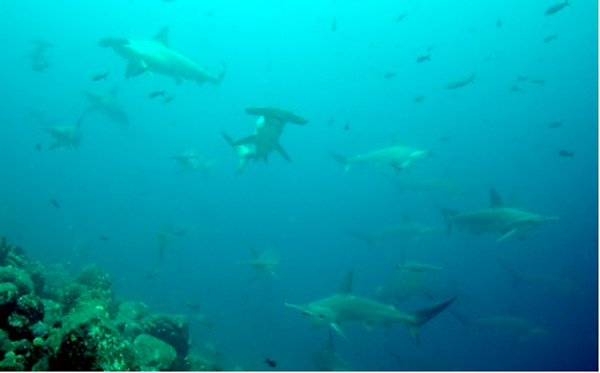 Shipments of hammerhead shark fins were approved by the Costa Rican government in violation of an international treaty, conservation groups allege. A school of hammerhead sharks swim near the Galapagos Islands. Costa Rica has been exporting two species of hammerheads whose trade is limited under Appendix II of CITES. Photo: Alex Hearn. On December 24, […]
Shipments of hammerhead shark fins were approved by the Costa Rican government in violation of an international treaty, conservation groups allege. A school of hammerhead sharks swim near the Galapagos Islands. Costa Rica has been exporting two species of hammerheads whose trade is limited under Appendix II of CITES. Photo: Alex Hearn. On December 24, […]
Madagascar establishes a sanctuary for sharks
.jpg) Zebra Shark (Stegastoma fasciatum). Photo credit: Jürg Brand The government of Madagascar has established the Indian Ocean island’s first shark sanctuary in an area famous for its marine biodiversity, reports the Wildlife Conservation Society (WCS). The new marine protections apply to Antongil Bay, which is located in northwestern Madagascar and is known for its coral […]
Zebra Shark (Stegastoma fasciatum). Photo credit: Jürg Brand The government of Madagascar has established the Indian Ocean island’s first shark sanctuary in an area famous for its marine biodiversity, reports the Wildlife Conservation Society (WCS). The new marine protections apply to Antongil Bay, which is located in northwestern Madagascar and is known for its coral […]
Shark pups may not survive climate change
 Researchers find that warming ocean and acidification could hit young sharks hard Fierce predatory sharks rule the oceans from the apex of the food pyramid. But climate change may be tougher than these marine hunters, a new study suggests. As oceans warm and their waters become more acidic, fewer sharks may survive their infancies. No […]
Researchers find that warming ocean and acidification could hit young sharks hard Fierce predatory sharks rule the oceans from the apex of the food pyramid. But climate change may be tougher than these marine hunters, a new study suggests. As oceans warm and their waters become more acidic, fewer sharks may survive their infancies. No […]
Demand for shark fin plunging
 Shark fins are usually sliced off the animal while its still alive. Photo by: WildAid/Hilton. Shark fin demand has dropped precipitously in China in just a few years, according to a new report by WildAid. The wildlife NGO has spearheaded a major media campaign, incorporating celebrities like Yao Ming, to raise awareness about the impacts […]
Shark fins are usually sliced off the animal while its still alive. Photo by: WildAid/Hilton. Shark fin demand has dropped precipitously in China in just a few years, according to a new report by WildAid. The wildlife NGO has spearheaded a major media campaign, incorporating celebrities like Yao Ming, to raise awareness about the impacts […]
Weird and mysterious: scientists find new shark species
 A long snout with teeth jutting from the sides? Check. Catfish-like barbels dangling from its chin? Got them. Gills on the side of its body? It has those, too. These are characteristics of a bizarre group of sharks known as sawsharks (family Pristiophoriforidae). And until recently, only seven species were recognized. However, following examination of […]
A long snout with teeth jutting from the sides? Check. Catfish-like barbels dangling from its chin? Got them. Gills on the side of its body? It has those, too. These are characteristics of a bizarre group of sharks known as sawsharks (family Pristiophoriforidae). And until recently, only seven species were recognized. However, following examination of […]
Saving sharks one sandwich at a time: conservationists target ‘shark bake’
 Thousands of Carnival revelers in Trinidad wouldn’t think of missing the chance to go to Maracas Beach, the most famous strip of sand on the small Caribbean island off the northeast coast of Venezuela. Beachgoers might not think twice about eating a favorite food called “shark bake” either – at least, until now. But this […]
Thousands of Carnival revelers in Trinidad wouldn’t think of missing the chance to go to Maracas Beach, the most famous strip of sand on the small Caribbean island off the northeast coast of Venezuela. Beachgoers might not think twice about eating a favorite food called “shark bake” either – at least, until now. But this […]
35 pictures of the sharkfin trade that will shock and dismay you
 Shark catch in Kesennuma, Japan. Photo by Shawn Heinrichs Last month scientists released a study warning that one quarter of all sharks and rays are threatened with extinction. The research, published in the open-access journal eLife on January 21, was the result of collaboration between 300 scientists from 64 countries. It concluded that overfishing is […]
Shark catch in Kesennuma, Japan. Photo by Shawn Heinrichs Last month scientists released a study warning that one quarter of all sharks and rays are threatened with extinction. The research, published in the open-access journal eLife on January 21, was the result of collaboration between 300 scientists from 64 countries. It concluded that overfishing is […]
Investigation finds Chinese factory slaughters 600 whale sharks a year
 Living whale shark. All photos courtesy of WildLifeRisk A four-year investigation by WildLifeRisk, a Hong Kong-based marine conservation group, has found that a single factory in China’s Zhejiang Province slaughters some 600 whale sharks a year to produce oil for cosmetics and health supplements. While trade in whale shark products is prohibited under the the […]
Living whale shark. All photos courtesy of WildLifeRisk A four-year investigation by WildLifeRisk, a Hong Kong-based marine conservation group, has found that a single factory in China’s Zhejiang Province slaughters some 600 whale sharks a year to produce oil for cosmetics and health supplements. While trade in whale shark products is prohibited under the the […]
One quarter of sharks and rays threatened with extinction
 Great white shark off South Africa. Photo by Rhett A. Butler One quarter of all shark and ray species are threatened with extinction, according to a new study published in the open-access journal eLife. The paper analyzed the threat and conservation status of 1,041 species of chondrichthyans—the class of fish whose skeletons are made of […]
Great white shark off South Africa. Photo by Rhett A. Butler One quarter of all shark and ray species are threatened with extinction, according to a new study published in the open-access journal eLife. The paper analyzed the threat and conservation status of 1,041 species of chondrichthyans—the class of fish whose skeletons are made of […]
The smoothtooth blacktip shark and four other species rediscovered in markets
 Scientific American magazine recently ran an article on the rediscovery of the smoothtooth blacktip shark (Carcharhinus leiodon) in a Kuwaiti fish market. Believed extinct for over 100 years, the smoothtooth had not been seen since the naturalist Wilhelm Hein returned from a trip to Yemen in 1902. With its reappearance, scientists scoured Kuwaiti markets and […]
Scientific American magazine recently ran an article on the rediscovery of the smoothtooth blacktip shark (Carcharhinus leiodon) in a Kuwaiti fish market. Believed extinct for over 100 years, the smoothtooth had not been seen since the naturalist Wilhelm Hein returned from a trip to Yemen in 1902. With its reappearance, scientists scoured Kuwaiti markets and […]
Environmental groups: top secret Pacific trade agreement to sacrifice wildlife, environment
 Environmental groups have blasted draft text of the Trans-Pacific Partnership (TPP) released yesterday by WikiLeaks as potentially devastating to the environment and wildlife. The massive 12-nation free trade agreement has been negotiated in secret now for almost four years, and the information release by WikiLeaks shows that key environmental safeguards in the agreement are being […]
Environmental groups have blasted draft text of the Trans-Pacific Partnership (TPP) released yesterday by WikiLeaks as potentially devastating to the environment and wildlife. The massive 12-nation free trade agreement has been negotiated in secret now for almost four years, and the information release by WikiLeaks shows that key environmental safeguards in the agreement are being […]
Top 10 HAPPY environmental stories of 2013
 Also see our Top 10 Environmental Stories of 2013. The discovery of a new tapir species is number seven in our first ever Top 10 List of Happy Environmental Stories. Pictured here is a pair of Kobomani tapirs caught on camera trap. The individual on the left is a female and on the right a […]
Also see our Top 10 Environmental Stories of 2013. The discovery of a new tapir species is number seven in our first ever Top 10 List of Happy Environmental Stories. Pictured here is a pair of Kobomani tapirs caught on camera trap. The individual on the left is a female and on the right a […]
China bans shark fin, bird’s nest soup from state banquets
 Great white shark in South Africa. China has banned shark fin and bird’s nest soup from being served at official state banquets, reports Chinese state media. The move, announced Sunday via a notice from the Community Party’s Central Committee and the State Council, is part of a broader move to crack down on corruption and […]
Great white shark in South Africa. China has banned shark fin and bird’s nest soup from being served at official state banquets, reports Chinese state media. The move, announced Sunday via a notice from the Community Party’s Central Committee and the State Council, is part of a broader move to crack down on corruption and […]
Indonesia’s national airline carrier bans shark fins
 Indonesia’s flag carrier won’t transport shark fins any more Indonesia’s national carrier Garuda Indonesia has joined a growing number of airlines looking to curb the international shark fin trade by banning the transport of shark fins and other shark products on their aircraft. WWF-Indonesia, which helped campaign for the ban, called the new Garuda policy […]
Indonesia’s flag carrier won’t transport shark fins any more Indonesia’s national carrier Garuda Indonesia has joined a growing number of airlines looking to curb the international shark fin trade by banning the transport of shark fins and other shark products on their aircraft. WWF-Indonesia, which helped campaign for the ban, called the new Garuda policy […]
Fishermen get crafty to circumvent shark fin ban
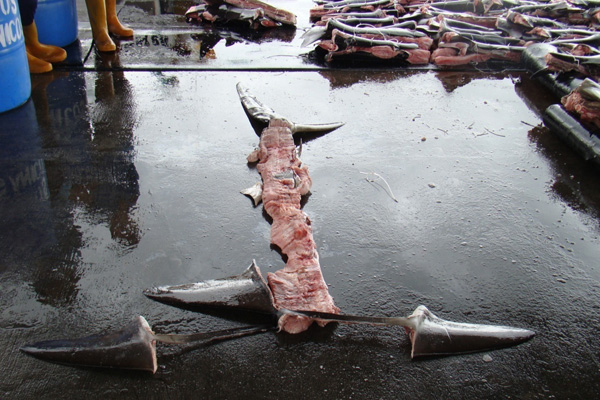 Authorities in Costa Rica have identified a new method used by fishermen to circumvent a ban on killing sharks for their fins. According to an INTERPOL alert, fishermen are now leaving a band of skin to keep the fin attached to the spine when they kill sharks. This approach takes advantage of an apparent loophole […]
Authorities in Costa Rica have identified a new method used by fishermen to circumvent a ban on killing sharks for their fins. According to an INTERPOL alert, fishermen are now leaving a band of skin to keep the fin attached to the spine when they kill sharks. This approach takes advantage of an apparent loophole […]
Fishermen illegally killing dolphins for shark-bait in Peru (video)
 Peruvian fishermen slaughtered dolphins to use as bait for shark fishing, an undercover investigation has revealed. Footage showed infant and adult dolphins being harpooned then stabbed and clubbed before, in some cases, being cut open and butchered while still alive. The slaughtered dolphins were cut up and used as bait. Dolphins are also killed for […]
Peruvian fishermen slaughtered dolphins to use as bait for shark fishing, an undercover investigation has revealed. Footage showed infant and adult dolphins being harpooned then stabbed and clubbed before, in some cases, being cut open and butchered while still alive. The slaughtered dolphins were cut up and used as bait. Dolphins are also killed for […]
Shark overfishing hurts coral reefs
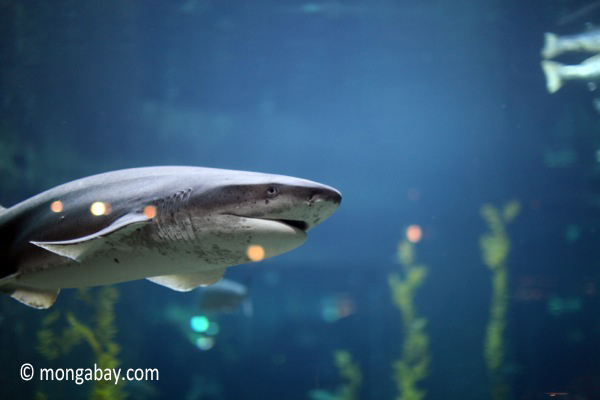 Overfishing for sharks is having detrimental effects on coral reefs, finds a new study published in the journal PLOS One. The research is based on long-term monitoring reefs off northwestern Australia. The authors, led by Jonathan Ruppert, formerly of the University of Toronto and now with York University, compared community structure between several atoll-like reefs. […]
Overfishing for sharks is having detrimental effects on coral reefs, finds a new study published in the journal PLOS One. The research is based on long-term monitoring reefs off northwestern Australia. The authors, led by Jonathan Ruppert, formerly of the University of Toronto and now with York University, compared community structure between several atoll-like reefs. […]
Video: scientists discover new walking shark species in Indonesia
 A species of shark that uses its fins to “walk” along the bottom of the ocean floor has been discovered off the coast of Indonesia. The shark, Hemiscyllium halmahera, uses its fins to wiggle along the seabed and forage for small fish and crustaceans, scientists from Conservation International said on Friday. The shark, which has […]
A species of shark that uses its fins to “walk” along the bottom of the ocean floor has been discovered off the coast of Indonesia. The shark, Hemiscyllium halmahera, uses its fins to wiggle along the seabed and forage for small fish and crustaceans, scientists from Conservation International said on Friday. The shark, which has […]
Whale shark mapping: scientists uncover global distribution for the largest fish in the world
 Polka-dotted and striped. Massive but docile. That’s the whale shark for you – the largest fish and shark in the world. But despite being major tourist attractions, the lives of these awe-inspiring creatures of the ocean remain far from being demystified. However, a team of researchers from Australia may now have some answers to where […]
Polka-dotted and striped. Massive but docile. That’s the whale shark for you – the largest fish and shark in the world. But despite being major tourist attractions, the lives of these awe-inspiring creatures of the ocean remain far from being demystified. However, a team of researchers from Australia may now have some answers to where […]
Zoos call on governments to take urgent action against illegal wildlife trade (photos)
 Warning: some photos may be disturbing or graphic. In a single night in March, a band of heavily-armed, horse-riding poachers slaughtered 89 elephants in southern Chad, thirty of which were pregnant females. The carnage was the worst poaching incident of the year, but even this slaughter paled in comparison to the 650 elephants killed in […]
Warning: some photos may be disturbing or graphic. In a single night in March, a band of heavily-armed, horse-riding poachers slaughtered 89 elephants in southern Chad, thirty of which were pregnant females. The carnage was the worst poaching incident of the year, but even this slaughter paled in comparison to the 650 elephants killed in […]
Monster shark sparks talk of overfishing
 A giant mako shark caught by a sports-fisherman in California Monday has spurred a conversation about declining shark populations worldwide, reports the Associated Press. The female shark caught Monday off Huntington Beach by Jason Johnston of Mesquite, Texas, weighed in at 1,323 pounds and measured 11 feet long and eight feet around at its midsection. […]
A giant mako shark caught by a sports-fisherman in California Monday has spurred a conversation about declining shark populations worldwide, reports the Associated Press. The female shark caught Monday off Huntington Beach by Jason Johnston of Mesquite, Texas, weighed in at 1,323 pounds and measured 11 feet long and eight feet around at its midsection. […]
Heavy metal shark meat: dangerous lead levels found in sharks used as fish food
 Blue shark (Prionace glauca) off southern California. Photo by: Mark Conlin/NMFS. A recent study published in mongabay.com’s open access journal Tropical Conservation Science raises concerns about levels of heavy metals, particularly lead (Pb), present in shark meat, as well as the decline of shark abundance due to global fishing pressures. Sharks are primarily caught as […]
Blue shark (Prionace glauca) off southern California. Photo by: Mark Conlin/NMFS. A recent study published in mongabay.com’s open access journal Tropical Conservation Science raises concerns about levels of heavy metals, particularly lead (Pb), present in shark meat, as well as the decline of shark abundance due to global fishing pressures. Sharks are primarily caught as […]
Sharks and rays win protections at CITES
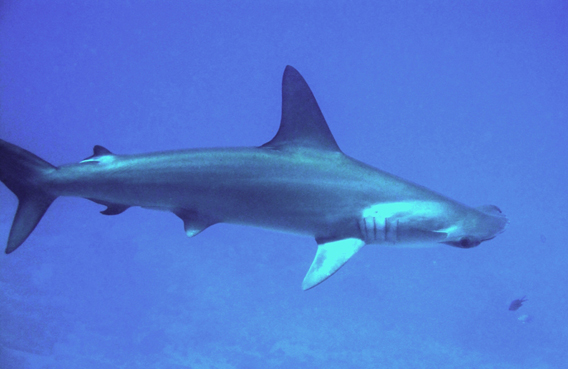 The scalloped hammerhead shark is one of five sharks and two manta rays that won protection today at CITES, so long as it isn’t overturned. Photo by: Stacy Jupiter/WCS. Today, for the first time, sharks and rays have won the vote for better protection under CITES (the Convention on International Trade in Endangered Species), the […]
The scalloped hammerhead shark is one of five sharks and two manta rays that won protection today at CITES, so long as it isn’t overturned. Photo by: Stacy Jupiter/WCS. Today, for the first time, sharks and rays have won the vote for better protection under CITES (the Convention on International Trade in Endangered Species), the […]
Has shark fin consumption peaked at 100M dead sharks per year?
 Scalloped hammerheads (Sphyrna lewini) off Cocos Island, Costa Rica. This species is up for protection by CITES this month if nations votes in its favor. Photo by: Barry Peters. While a new study warns that up to 100M sharks are killed annually, there are signs out of China that demand for shark fin may be […]
Scalloped hammerheads (Sphyrna lewini) off Cocos Island, Costa Rica. This species is up for protection by CITES this month if nations votes in its favor. Photo by: Barry Peters. While a new study warns that up to 100M sharks are killed annually, there are signs out of China that demand for shark fin may be […]
Saving manta rays from the fin trade
 The 3rd Annual New York Wildlife Conservation Film Festival (WFCC.org) runs from January 30 – February 2, 2013. Ahead of the event, Mongabay.com is running a series of Q&As with filmmakers and presenters. For more interviews, please see our WCFF feed. Mobula Rays at Isla Mujeres, Mexico in 2012. Photo by Shawn Heinrichs Tens of […]
The 3rd Annual New York Wildlife Conservation Film Festival (WFCC.org) runs from January 30 – February 2, 2013. Ahead of the event, Mongabay.com is running a series of Q&As with filmmakers and presenters. For more interviews, please see our WCFF feed. Mobula Rays at Isla Mujeres, Mexico in 2012. Photo by Shawn Heinrichs Tens of […]
Jeff Corwin talks sharks
 Sharks are among the most feared of all the world’s predators, yet humans kill tens of millions of sharks for every person who falls victim to shark attack. Part of our fear stems from lack of understanding. A new eBook however tries to change that. Jeff Corwin, an Emmy Award Winning TV host, has this […]
Sharks are among the most feared of all the world’s predators, yet humans kill tens of millions of sharks for every person who falls victim to shark attack. Part of our fear stems from lack of understanding. A new eBook however tries to change that. Jeff Corwin, an Emmy Award Winning TV host, has this […]
Pledge to end wildlife trafficking for Wildlife Conservation Day
 A forest elephant, which is considered by some to be a distinct species of elephant in Africa, in Gabon. Both forest elephants and savannah elephants are increasingly killed for their tusks. The Wildlife Conservation Society (WCS) estimates that 30,000 elephants will be killed this year along for the black market trade. Photo by: Rhett A. […]
A forest elephant, which is considered by some to be a distinct species of elephant in Africa, in Gabon. Both forest elephants and savannah elephants are increasingly killed for their tusks. The Wildlife Conservation Society (WCS) estimates that 30,000 elephants will be killed this year along for the black market trade. Photo by: Rhett A. […]
Pictures of the day: sea turtle and whale shark release in China
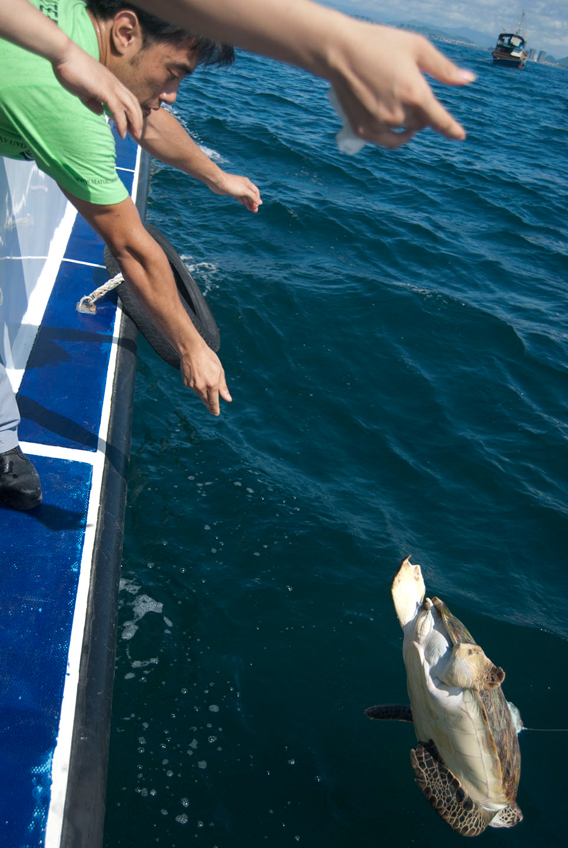 Green sea turtle released back into its natural habitat after being raised for 10 months. Photo by: Sea Turtles 911. Earlier this month, Sea Turtles 911, a conservation organization in China, released two green sea turtles (Chelonia mydas) and a juvenile whale shark (Rhincodon typus) back into the wild. “These two animals share the ocean, […]
Green sea turtle released back into its natural habitat after being raised for 10 months. Photo by: Sea Turtles 911. Earlier this month, Sea Turtles 911, a conservation organization in China, released two green sea turtles (Chelonia mydas) and a juvenile whale shark (Rhincodon typus) back into the wild. “These two animals share the ocean, […]
Clever whale shark video goes viral
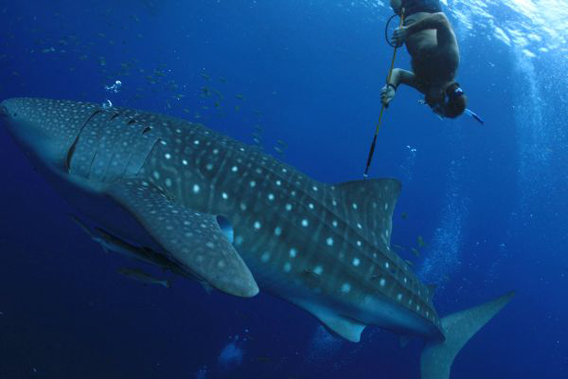 Brent Stewart tags a whale shark with a radio-frequency identification (RFID) tag in Indonesia. Photo: © CI/Mark Erdmann. Researchers have a caught a juvenile—though still massive—whale shark on camera sucking fish out of a hole in an Indonesian fishing net. Posted on YouTube.com, the video has gone viral and has been viewed by 1.2 million […]
Brent Stewart tags a whale shark with a radio-frequency identification (RFID) tag in Indonesia. Photo: © CI/Mark Erdmann. Researchers have a caught a juvenile—though still massive—whale shark on camera sucking fish out of a hole in an Indonesian fishing net. Posted on YouTube.com, the video has gone viral and has been viewed by 1.2 million […]
Bad science journalism: articles spread misinformation about whale sharks
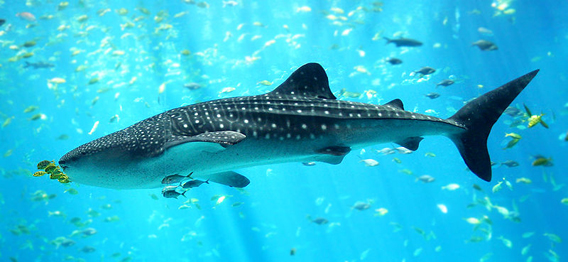 Captive whale shark in the Georgia aquarium. Photo by: Zac Wolf. The death of one of the world’s largest recorded whale sharks (Rhincodon typus) in the Arabian Sea provoked a sudden global interest in these massive shark. Weighing 14.5 tons, the fish in question made ‘whale shark ‘whale shark’ the number 3 top search in […]
Captive whale shark in the Georgia aquarium. Photo by: Zac Wolf. The death of one of the world’s largest recorded whale sharks (Rhincodon typus) in the Arabian Sea provoked a sudden global interest in these massive shark. Weighing 14.5 tons, the fish in question made ‘whale shark ‘whale shark’ the number 3 top search in […]
Genetic analysis reveals 79 new species of sharks and rays, many likely endangered
 Leopard Shark (Triakis semifasciata). Photo by Rhett Butler. Analyzing the DNA sequences of 4,383 specimens of sharks and rays, researchers have discovered 79 potentially new species, raising both the known diversity of this predacious family and concerns that many species are likely more imperiled than thought. Already 32 percent of open ocean sharks and rays […]
Leopard Shark (Triakis semifasciata). Photo by Rhett Butler. Analyzing the DNA sequences of 4,383 specimens of sharks and rays, researchers have discovered 79 potentially new species, raising both the known diversity of this predacious family and concerns that many species are likely more imperiled than thought. Already 32 percent of open ocean sharks and rays […]
Manta rays tracked by satellite
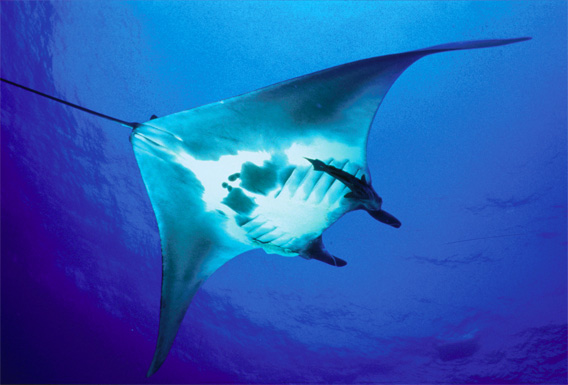 Researchers from the Wildlife Conservation Society, the University of Exeter, and the Government of Mexico have published the first-ever satellite telemetry study on the manta ray, the world’s largest ray species. The findings will help inform ecosystem-based management plans for the rays, which are in decline worldwide due to fishing and accidental capture. Photo credit: […]
Researchers from the Wildlife Conservation Society, the University of Exeter, and the Government of Mexico have published the first-ever satellite telemetry study on the manta ray, the world’s largest ray species. The findings will help inform ecosystem-based management plans for the rays, which are in decline worldwide due to fishing and accidental capture. Photo credit: […]
Camera traps go under the ocean, seeking sharks
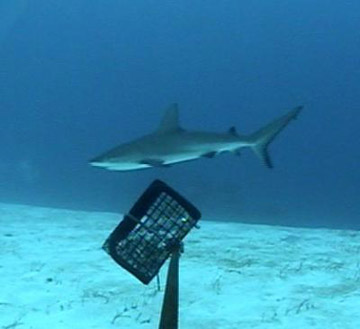 Remote camera traps, which have become a hugely important conservation tool on land during the past decade, have now gone underwater. Marine biologists have used underwater video camera traps to compare the population of Caribbean reef sharks (Carcharhinus perezii) in Belize’s protected areas versus fishing areas in a new study in the open-access journal PLoS […]
Remote camera traps, which have become a hugely important conservation tool on land during the past decade, have now gone underwater. Marine biologists have used underwater video camera traps to compare the population of Caribbean reef sharks (Carcharhinus perezii) in Belize’s protected areas versus fishing areas in a new study in the open-access journal PLoS […]
Top 10 Environmental Stories of 2011
 Victories won by activists around the world tops our list of the big environmental stories of the year. In this photo: a young woman is placed in handcuffs and arrested for civil disobedience against the Keystone XL Pipeline in the U.S. In all, 1,252 people were arrested in the two week long action. Photo by: […]
Victories won by activists around the world tops our list of the big environmental stories of the year. In this photo: a young woman is placed in handcuffs and arrested for civil disobedience against the Keystone XL Pipeline in the U.S. In all, 1,252 people were arrested in the two week long action. Photo by: […]
Matt Miller: don’t oversimplify issues in environmental debates
 Matt Miller is director of communications for The Nature Conservancy in Idaho, a position he’s held for ten years. He is responsible for the chapter’s publications and digital media. He writes for the Conservancy’s blogs Cool Green Science and Idaho Nature Notes. He has also completed two conservation fellowships for the Conservancy’s programs in Colombia […]
Matt Miller is director of communications for The Nature Conservancy in Idaho, a position he’s held for ten years. He is responsible for the chapter’s publications and digital media. He writes for the Conservancy’s blogs Cool Green Science and Idaho Nature Notes. He has also completed two conservation fellowships for the Conservancy’s programs in Colombia […]
Picture of the day: Ocean in Focus photo contest winner
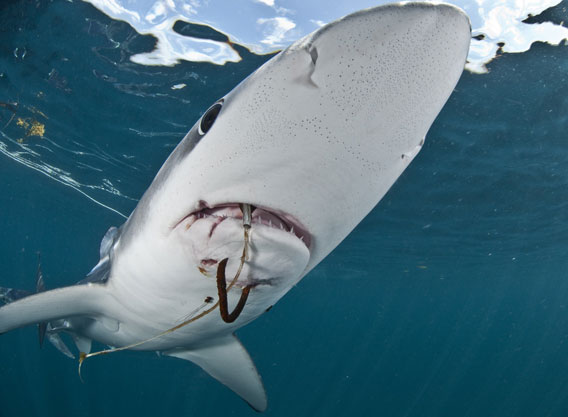 Blue shark with longline hook. Photo by: Terry Goss. A photo of a shark with a rusting hook in its maw is the grand prize winner of the Ocean in Focus photo contest, which seeks to raise awareness for conservation issues in the oceans. The image is of a blue shark (Prionace glauca) taken off […]
Blue shark with longline hook. Photo by: Terry Goss. A photo of a shark with a rusting hook in its maw is the grand prize winner of the Ocean in Focus photo contest, which seeks to raise awareness for conservation issues in the oceans. The image is of a blue shark (Prionace glauca) taken off […]
Costa Rican fishermen plundering Colombian waters for sharks
Costa Rican fishermen have killed some 2,000 sharks in Colombian waters off Malpelo island, a protected area renowned for its marine life, reports Colombia Reports. Sandra Bessudo, special advisor on biodiversity to Colombia President Juan Manuel Santos, said that Costa Rican boats have been setting long lines near Malpelo. The fishermen cut off the fins […]
California governor signs ban on shark fin trade
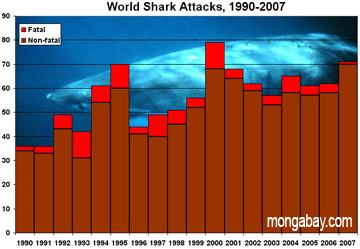 California governor Jerry Brown on Friday signed legislation banning the the importation, possession and sale of shark fins in California. The move follows similar bans in Washington, Oregon and Hawaii and comes as shark populations are on the decline worldwide. In signing the legislation, Brown called the practice of shark finning “cruel” and damaging to […]
California governor Jerry Brown on Friday signed legislation banning the the importation, possession and sale of shark fins in California. The move follows similar bans in Washington, Oregon and Hawaii and comes as shark populations are on the decline worldwide. In signing the legislation, Brown called the practice of shark finning “cruel” and damaging to […]
Marshall Islands creates world’s biggest shark park
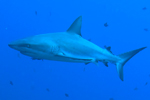 The Republic of the Marshall Islands has created the world’s biggest shark reserve: so large that all of Mexico could fit comfortably inside. With new legislation, commercial shark fishing is now completely banned in Marshall Islands’ 768,547 square miles (1,990,530 square kilometers) of ocean. The new shark sanctuary not only bans commercial fishing, but deems […]
The Republic of the Marshall Islands has created the world’s biggest shark reserve: so large that all of Mexico could fit comfortably inside. With new legislation, commercial shark fishing is now completely banned in Marshall Islands’ 768,547 square miles (1,990,530 square kilometers) of ocean. The new shark sanctuary not only bans commercial fishing, but deems […]
California moves closer to banning shark fin trade
 Leopard Shark (Triakis semifasciata). Photo by Rhett Butler. California moved a step closer to banning the sale and trade of shark fin with the passage Tuesday of Senate Bill 376. The bill, which passed 25-9, now goes the governor, whose approval would make the ban law. The bill was introduced to the California State Assembly […]
Leopard Shark (Triakis semifasciata). Photo by Rhett Butler. California moved a step closer to banning the sale and trade of shark fin with the passage Tuesday of Senate Bill 376. The bill, which passed 25-9, now goes the governor, whose approval would make the ban law. The bill was introduced to the California State Assembly […]
Honduras protects sharks in all its waters
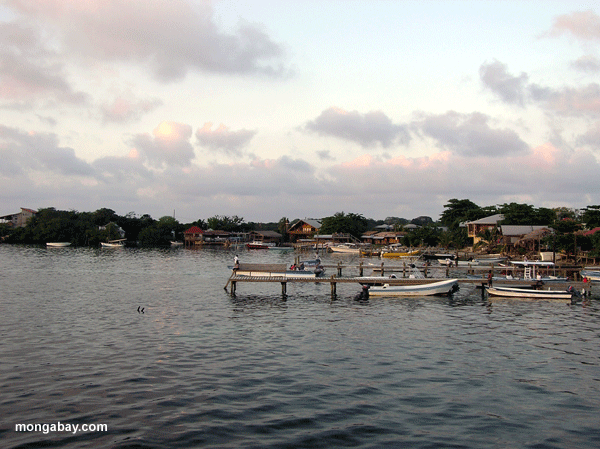 The Honduran island of Roatan. Photo by: Rhett A. Butler. Endangered sharks are finding more sanctuaries. Honduras has announced that commercial shark fishing will be banned from its 92,665 square miles (240,000 square kilometers) of national waters. Honduras says the ban, which follows a moratorium on shark fishing, will bring in tourism revenue and preserve […]
The Honduran island of Roatan. Photo by: Rhett A. Butler. Endangered sharks are finding more sanctuaries. Honduras has announced that commercial shark fishing will be banned from its 92,665 square miles (240,000 square kilometers) of national waters. Honduras says the ban, which follows a moratorium on shark fishing, will bring in tourism revenue and preserve […]
Left alive and wild, a single shark worth $1.9 million
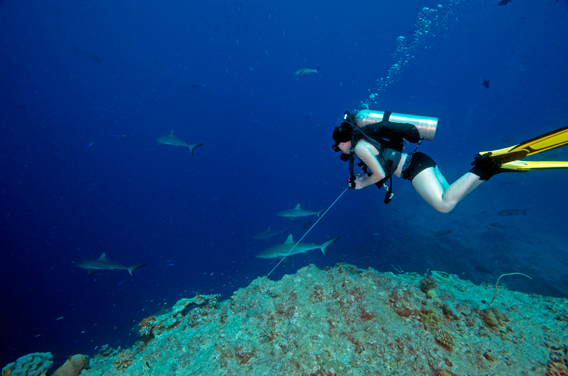 Tourism in Palau makes sharks worth more alive than dead finds a new study. Here a diver in Palau swims with five reef sharks. Photo by: Todd Essick. For the Pacific island nation of Palau, sharks are worth much more alive than dead. A new study by the Australian Institute of Marine Science (AIMS) has […]
Tourism in Palau makes sharks worth more alive than dead finds a new study. Here a diver in Palau swims with five reef sharks. Photo by: Todd Essick. For the Pacific island nation of Palau, sharks are worth much more alive than dead. A new study by the Australian Institute of Marine Science (AIMS) has […]
California proposes ban on selling shark fin
 Last year Hawaii banned the sale of shark fins; California may be next. Bill 376, introduced by two Democrats, would outlaw the sale of shark fins, including the popular Asian delicacy shark fin soup, in the US’s most populous state. One of the bill’s sponsors, Paul Fong, said at a new conference as reported by […]
Last year Hawaii banned the sale of shark fins; California may be next. Bill 376, introduced by two Democrats, would outlaw the sale of shark fins, including the popular Asian delicacy shark fin soup, in the US’s most populous state. One of the bill’s sponsors, Paul Fong, said at a new conference as reported by […]
U.S. passes legislation to protect sharks
The U.S. Senate has passed the Shark Conservation Act, legislation that bans shark finning in U.S. waters. The move was welcomed by marine conservationists. “The Senate has acted decisively today to help protect sharks, the predators at the top of the global marine food chain,” said Matt Rand, director of the Pew Environment Group’s Global […]
New legislation places US at forefront of shark conservation
 Last week the US Senate passed the Shark Conservation Act, which bolsters the prohibition of shark-finning in US waters and puts the US at the forefront of shark conservation. Finning involves catching a live shark, cutting off its fins, then dumping it back into the water where it suffers a slow death of asphyxiation on […]
Last week the US Senate passed the Shark Conservation Act, which bolsters the prohibition of shark-finning in US waters and puts the US at the forefront of shark conservation. Finning involves catching a live shark, cutting off its fins, then dumping it back into the water where it suffers a slow death of asphyxiation on […]
Massive shark sanctuary declared in the Coral Triangle
A shark sanctuary has been declared around the Raja Ampat islands in Indonesia. Larger than Denmark, the new sanctuary covers 17,760 square miles (46,000 square kilometers) of one of the world’s richest marine biodiverse region, the Coral Triangle. Protections not only cover sharks, but dugongs, marine turtles, mobulas, and manta rays as well. In addition, […]
What do wolves and sharks have in common?
 Sharks dwell in the ocean, wolves on land; sharks are a type of fish, wolves are a mammal; sharks go back some 400 million years, wolves only some 2 million years. So, these animals should have little in common, right? However, a new study in Frontiers in Ecology and the Environment points to surprising similarities […]
Sharks dwell in the ocean, wolves on land; sharks are a type of fish, wolves are a mammal; sharks go back some 400 million years, wolves only some 2 million years. So, these animals should have little in common, right? However, a new study in Frontiers in Ecology and the Environment points to surprising similarities […]
Island nation announces Ukraine-sized sanctuary for whales and dolphins
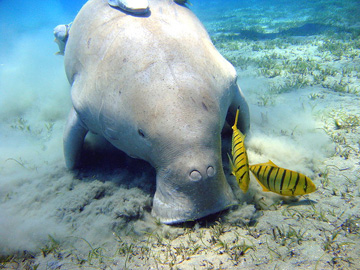 Dolphins, whales, and dugongs will be safe from hunting in the waters surrounding the Pacific nation of Palau. At the Convention on Biological Diversity (CBD) in Nagoya, Japan, Palau’s Minister of the Environment, Natural Resources and Tourism, Harry Fritz, announced the establishment of a marine mammal sanctuary covering over 230,000 square miles (600,000 square kilometers) […]
Dolphins, whales, and dugongs will be safe from hunting in the waters surrounding the Pacific nation of Palau. At the Convention on Biological Diversity (CBD) in Nagoya, Japan, Palau’s Minister of the Environment, Natural Resources and Tourism, Harry Fritz, announced the establishment of a marine mammal sanctuary covering over 230,000 square miles (600,000 square kilometers) […]
Shark attack victims: save sharks!
 Shark attack survivors urged the United Nations to take measures to protect sharks, which are increasingly threatened by unsustainable fishing practices. Brought together by the Pew Environment Group, nine shark attack victims—Achmat Hassiem of South Africa, Paul de Gelder of Australia, James Elliott of Britain, Yann Perras of France, Vincent Motais de Narbonne of Réunion, […]
Shark attack survivors urged the United Nations to take measures to protect sharks, which are increasingly threatened by unsustainable fishing practices. Brought together by the Pew Environment Group, nine shark attack victims—Achmat Hassiem of South Africa, Paul de Gelder of Australia, James Elliott of Britain, Yann Perras of France, Vincent Motais de Narbonne of Réunion, […]
Coral reef survival depends on the super small, an interview with Forest Rohwer
 If you take a teaspoon and dip it into the ocean what will you have? Some drops of lifeless water? Only a few decades ago this is what scientists would have said, however, the development of increasingly powerful microscopes have shown us a world long unknown, which has vital importance for the survival of one […]
If you take a teaspoon and dip it into the ocean what will you have? Some drops of lifeless water? Only a few decades ago this is what scientists would have said, however, the development of increasingly powerful microscopes have shown us a world long unknown, which has vital importance for the survival of one […]
The biology and conservation of declining coral reefs, an interview with Kristian Teleki
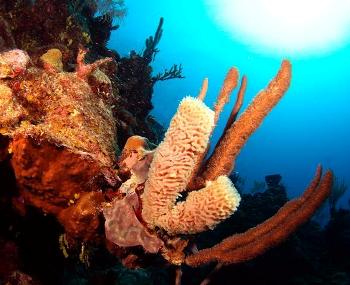 Kristian Teleki, Vice President for Science Initiatives for SeaWeb and former Director of the International Coral Reef Action Network (ICRAN), spoke with Laurel Neme on her “The WildLife” radio show and podcast about the biology of corals, threats to coral reefs, and what can be done to halt their decline. This interview originally aired May […]
Kristian Teleki, Vice President for Science Initiatives for SeaWeb and former Director of the International Coral Reef Action Network (ICRAN), spoke with Laurel Neme on her “The WildLife” radio show and podcast about the biology of corals, threats to coral reefs, and what can be done to halt their decline. This interview originally aired May […]
Citibank’s shark fin soup promotion draws ire, ends early
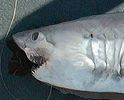 Citibank Hong Kong has canceled its promotion of shark fin soup after activists cried foul, according to the New York Times. The branch had offered Citibank card holders 15 percent off a shark fin soup dinner at Maxim’s Chinese Cuisine for the month of July. But the bank has since canceled the promotion early after […]
Citibank Hong Kong has canceled its promotion of shark fin soup after activists cried foul, according to the New York Times. The branch had offered Citibank card holders 15 percent off a shark fin soup dinner at Maxim’s Chinese Cuisine for the month of July. But the bank has since canceled the promotion early after […]
Hawaii bans shark fin soup
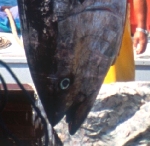 Governor of Hawaii, Linda Lingle, has signed into law a ban on shark-fin soup beginning July 1st, 2011, according to Reuters. The soup is currently served in a number of Chinese restaurants in Hawaii, but the trade has decimated certain shark species due to overfishing. Restaurants will be allowed to finish their inventory of shark […]
Governor of Hawaii, Linda Lingle, has signed into law a ban on shark-fin soup beginning July 1st, 2011, according to Reuters. The soup is currently served in a number of Chinese restaurants in Hawaii, but the trade has decimated certain shark species due to overfishing. Restaurants will be allowed to finish their inventory of shark […]
World failing on every environmental issue: an op-ed for Earth Day
 The biodiversity crisis, the climate crisis, the deforestation crisis: we are living in an age when environmental issues have moved from regional problems to global ones. A generation or two before ours and one might speak of saving the beauty of Northern California; conserving a single species—say the white rhino—from extinction; or preserving an ecological […]
The biodiversity crisis, the climate crisis, the deforestation crisis: we are living in an age when environmental issues have moved from regional problems to global ones. A generation or two before ours and one might speak of saving the beauty of Northern California; conserving a single species—say the white rhino—from extinction; or preserving an ecological […]
History repeats itself: the path to extinction is still paved with greed and waste
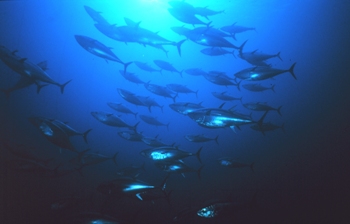 As a child I read about the near-extinction of the American bison. Once the dominant species on America’s Great Plains, I remember books illustrating how train-travelers would set their guns on open windows and shoot down bison by the hundreds as the locomotive sped through what was left of the wild west. The American bison […]
As a child I read about the near-extinction of the American bison. Once the dominant species on America’s Great Plains, I remember books illustrating how train-travelers would set their guns on open windows and shoot down bison by the hundreds as the locomotive sped through what was left of the wild west. The American bison […]
CITES chooses ‘commerce’ over sharks, leaving endangered species vulnerable
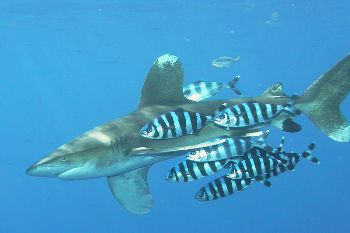 Only the porbeagle shark received protection today from the Convention on International Trade in Endangered Species (CITES). Seven other shark species failed to win international protection despite plummeting populations due to overfishing. Once again, Japan led the opposition to regulating the trade in white-tipped sharks and scalloped hammerheads, including two look-alike species: the great hammerhead […]
Only the porbeagle shark received protection today from the Convention on International Trade in Endangered Species (CITES). Seven other shark species failed to win international protection despite plummeting populations due to overfishing. Once again, Japan led the opposition to regulating the trade in white-tipped sharks and scalloped hammerheads, including two look-alike species: the great hammerhead […]
Sharks lose out at UN meeting
An effort to bolster conservation measures for plummeting shark populations was defeated yesterday at the Convention on International Trade in Endangered Species (CITES), according to the AP. The nonbinding measure would have increased transparency in the shark trade and produced research on illegal fishing for sharks. The measure was taken down largely by China, Japan […]
Sharks swim safe around the Maldives
 Sharks that dwell in the Maldives can breathe a sigh of relief: the island nation has declared 90,000 square kilometers of the Indian Ocean a safe-haven for sharks, banning shark fishing as well as any trade in shark fins. “The Maldives were one of the first countries to recognize that sharks were a key reason […]
Sharks that dwell in the Maldives can breathe a sigh of relief: the island nation has declared 90,000 square kilometers of the Indian Ocean a safe-haven for sharks, banning shark fishing as well as any trade in shark fins. “The Maldives were one of the first countries to recognize that sharks were a key reason […]
With increased protection, Gulf of California marine life could recover
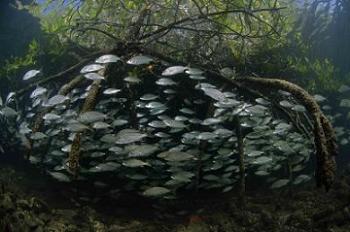 The Gulf of California’s once rich marine ecosystem is in trouble. Surveys from 1999 and 2009 revealed that during the ten-year-period 60 percent of the areas showed signs of degradation, including the loss of top predators necessary to keep an ecosystem healthy, for example sharks, groupers, and snappers. “In these studies, whether reefs or mangroves, […]
The Gulf of California’s once rich marine ecosystem is in trouble. Surveys from 1999 and 2009 revealed that during the ten-year-period 60 percent of the areas showed signs of degradation, including the loss of top predators necessary to keep an ecosystem healthy, for example sharks, groupers, and snappers. “In these studies, whether reefs or mangroves, […]
UN to protect seven migratory sharks, but Australia opts out
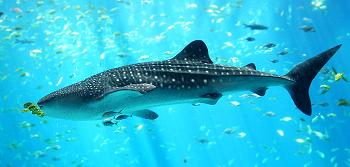 One hundred and thirteen countries have signed on to an agreement to protect seven migratory sharks currently threatened with extinction byway of the Convention on the Conservation of Migratory Species of Wild Animals (CMS), according to the UN Environment Program (UNEP). The agreement prohibits hunting, fishing, or deliberate killing of the great white shark, basking […]
One hundred and thirteen countries have signed on to an agreement to protect seven migratory sharks currently threatened with extinction byway of the Convention on the Conservation of Migratory Species of Wild Animals (CMS), according to the UN Environment Program (UNEP). The agreement prohibits hunting, fishing, or deliberate killing of the great white shark, basking […]
Actions taken to save sharks ‘disappointing’
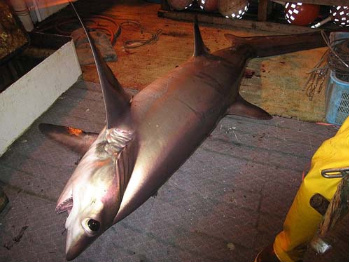 Environmentalists say that the International Commissions for the Conservation of Atlantic Tuna (ICCAT) did not do enough in their yearly meeting to protect the ocean’s sharks. Member countries of ICCAT agreed on a ban big eye thresher sharks. However, Mexico was granted an exemption, allowing it to catch 110 big eye threshers, which is classified […]
Environmentalists say that the International Commissions for the Conservation of Atlantic Tuna (ICCAT) did not do enough in their yearly meeting to protect the ocean’s sharks. Member countries of ICCAT agreed on a ban big eye thresher sharks. However, Mexico was granted an exemption, allowing it to catch 110 big eye threshers, which is classified […]
California’s great white sharks are a distinct population
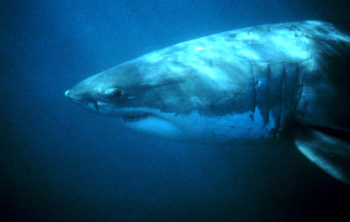 Great white sharks tracked swimming underneath Golden Gate bridge. Researchers have long thought that white sharks migrated across oceans, but a new study in the Proceedings of the Royal Society B shows that the population in the northeastern Pacific Ocean, along California, hasn’t mixed with other white sharks for tens of thousands of years. “White […]
Great white sharks tracked swimming underneath Golden Gate bridge. Researchers have long thought that white sharks migrated across oceans, but a new study in the Proceedings of the Royal Society B shows that the population in the northeastern Pacific Ocean, along California, hasn’t mixed with other white sharks for tens of thousands of years. “White […]
New species of ghostshark discovered off California’s coast
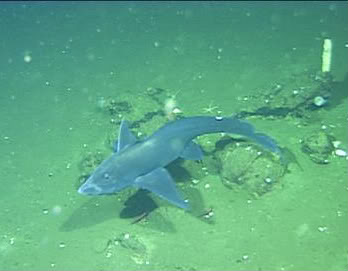 The discovery of Eastern Pacific black ghostshark Hydrolagus melanophasma is notable for a number of reasons. It is the first new species of cartilaginous fish—i.e fish whose skeletons are made entirely of cartilage, such as sharks, rays, and skate—to be described in California water since 1947. It is also a representative of an ancient and […]
The discovery of Eastern Pacific black ghostshark Hydrolagus melanophasma is notable for a number of reasons. It is the first new species of cartilaginous fish—i.e fish whose skeletons are made entirely of cartilage, such as sharks, rays, and skate—to be described in California water since 1947. It is also a representative of an ancient and […]
20-foot-long washes up on New York beach
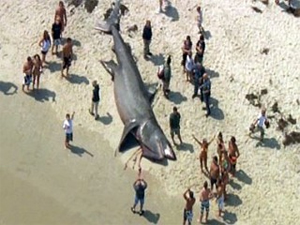 A 20-foot-long, 5,000 pound basking shark washed up on a Long Island beach yesterday, reports CNN. The shark died shortly after authorities arrived on the scene. The cause of death is unknown, although the possibility of a boat strike has been ruled out. Basking sharks can reach a length of 35 feet and weigh up […]
A 20-foot-long, 5,000 pound basking shark washed up on a Long Island beach yesterday, reports CNN. The shark died shortly after authorities arrived on the scene. The cause of death is unknown, although the possibility of a boat strike has been ruled out. Basking sharks can reach a length of 35 feet and weigh up […]
Over 30 percent of open ocean sharks and rays face extinction
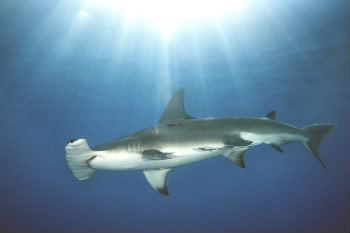 The first global study of open ocean (pelagic) sharks and rays found that 32 percent of the species are threatened with extinction largely due to overfishing and bycatch, making pelagic sharks and rays more threatened than birds (12 percent), mammals (20 percent), and even amphibians (31 percent), which are considered to be undergoing an extinction […]
The first global study of open ocean (pelagic) sharks and rays found that 32 percent of the species are threatened with extinction largely due to overfishing and bycatch, making pelagic sharks and rays more threatened than birds (12 percent), mammals (20 percent), and even amphibians (31 percent), which are considered to be undergoing an extinction […]
Secret movements of the basking shark uncovered
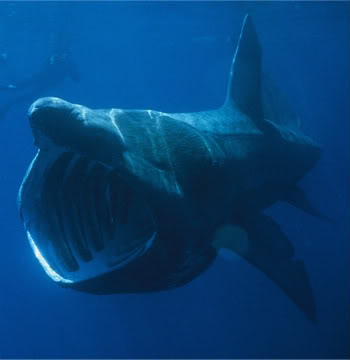 Researchers with the Massachusetts Mariner Fisheries have uncovered the secret life of the world’s second largest fish, known for its cavernous mouth. The basking shark, which measures over 10 meters and weighs as much as seven tons, has long baffled scientists by disappearing from view half of every year. A new study from Current Biology […]
Researchers with the Massachusetts Mariner Fisheries have uncovered the secret life of the world’s second largest fish, known for its cavernous mouth. The basking shark, which measures over 10 meters and weighs as much as seven tons, has long baffled scientists by disappearing from view half of every year. A new study from Current Biology […]
Whale sharks threatened by interbreeding
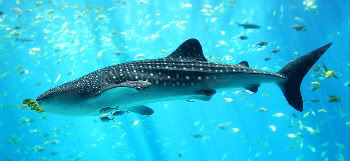 The world’s largest living fish, the whale shark, is threatened by interbreeding, according to a new study in PLoS ONE. Comparing the DNA of 68 individual whale sharks from eleven locations across the globe, geneticists found that the whale sharks had little genetic variation between the populations. “Our data show that whale sharks found in […]
The world’s largest living fish, the whale shark, is threatened by interbreeding, according to a new study in PLoS ONE. Comparing the DNA of 68 individual whale sharks from eleven locations across the globe, geneticists found that the whale sharks had little genetic variation between the populations. “Our data show that whale sharks found in […]
Hundreds of rare and bizarre marine species discovered
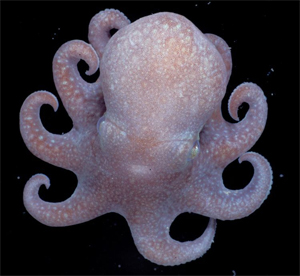 Photos: Hundreds of strange and unknown marine species discovered Hundreds of rare and bizarre marine species discovered Jeremy Hance, mongabay.com November 9, 2008 More discoveries from the Census of Marine Life
Photos: Hundreds of strange and unknown marine species discovered Hundreds of rare and bizarre marine species discovered Jeremy Hance, mongabay.com November 9, 2008 More discoveries from the Census of Marine Life
Sharks in trouble after nations fail to create sustainable management programs
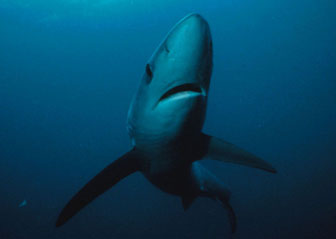 Sharks in trouble after nations fail to create sustainable management programs Sharks in trouble after nations fail to create sustainable management programs Jeremy Hance, mongabay.com November 6, 2008
Sharks in trouble after nations fail to create sustainable management programs Sharks in trouble after nations fail to create sustainable management programs Jeremy Hance, mongabay.com November 6, 2008
The long-ignored ocean emergency and what can be done to address it
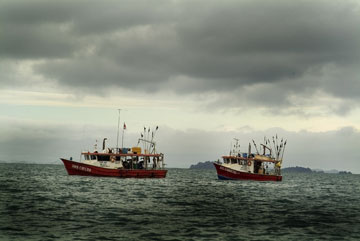 This year has been full of bad news regarding marine ecosystems: one-third of coral species threatened with extinction, dead-zones spread to 415 sites, half of U.S. reefs in fair or bad condition, increase in ocean acidification, tuna and shark populations collapsing, and only four percent of ocean considered pristine. Jeremy Jackson, director of the Scripps […]
This year has been full of bad news regarding marine ecosystems: one-third of coral species threatened with extinction, dead-zones spread to 415 sites, half of U.S. reefs in fair or bad condition, increase in ocean acidification, tuna and shark populations collapsing, and only four percent of ocean considered pristine. Jeremy Jackson, director of the Scripps […]
Large shark populations fall 97% in the Mediterranean
 Large shark populations fall 97% in the Mediterranean Large shark populations fall 97% in the Mediterranean mongabay.com June 12, 2008 Populations of some shark species in the Mediterranean have plunged by more than 97 percent over the past 200 years, report researchers writing in the journal Conservation Biology. Several species are at risk of extinction. […]
Large shark populations fall 97% in the Mediterranean Large shark populations fall 97% in the Mediterranean mongabay.com June 12, 2008 Populations of some shark species in the Mediterranean have plunged by more than 97 percent over the past 200 years, report researchers writing in the journal Conservation Biology. Several species are at risk of extinction. […]
Fatal San Diego Shark Attack a Rare Event
 Fatal San Diego Shark Attack a Rare Event Fatal San Diego Shark Attack a Rare Event mongabay.com April 25, 2008 Friday morning a 66-year-old swimmer was attacked and killed by a shark off Solana Beach in San Diego county. It was the first fatal shark attack in San Diego since 1994. According to the San […]
Fatal San Diego Shark Attack a Rare Event Fatal San Diego Shark Attack a Rare Event mongabay.com April 25, 2008 Friday morning a 66-year-old swimmer was attacked and killed by a shark off Solana Beach in San Diego county. It was the first fatal shark attack in San Diego since 1994. According to the San […]
Shark-repelling fishing gear in the works
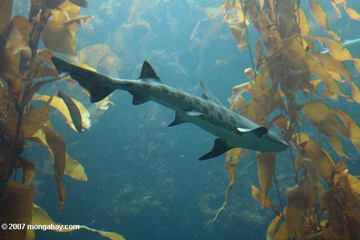 Shark-repelling fishing gear in the works Shark-repelling fishing gear in the works mongabay.com April 23, 2008 Fishing gear that produces an electric field in sea water could help prevent sharks from becoming accidental bycatch, say scientists at NOAA. Introducing palladium neodymium, an electropositive alloy, to a tank full of juvenile sandbar sharks “clearly altered the […]
Shark-repelling fishing gear in the works Shark-repelling fishing gear in the works mongabay.com April 23, 2008 Fishing gear that produces an electric field in sea water could help prevent sharks from becoming accidental bycatch, say scientists at NOAA. Introducing palladium neodymium, an electropositive alloy, to a tank full of juvenile sandbar sharks “clearly altered the […]
Expedition finds inverted pyramid where sharks dominate marine ecology
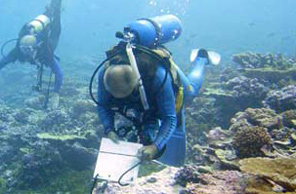 Expedition finds inverted pyramid where sharks dominate marine ecology Expedition finds inverted pyramid where sharks dominate marine ecology mongabay.com February 25, 2008 A survey of a remote Pacific archipelago turned up pristine coral reefs that could offer a “baseline” for measuring the human impact on reefs worldwide, report researchers from the Scripps Institution of Oceanography […]
Expedition finds inverted pyramid where sharks dominate marine ecology Expedition finds inverted pyramid where sharks dominate marine ecology mongabay.com February 25, 2008 A survey of a remote Pacific archipelago turned up pristine coral reefs that could offer a “baseline” for measuring the human impact on reefs worldwide, report researchers from the Scripps Institution of Oceanography […]
Mysteries of the Great White Shark unveiled
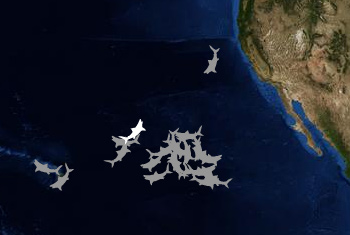 Mysteries of the Great White Shark unveiled by researchers Mysteries of the Great White Shark unveiled Jeremy Hance, mongabay.com February 17, 2008 [corrected 2/18] The Great White Shark’s distinct populations never meet according to new research The Great White Shark has always been a creature of mystery. The world’s third largest shark has long fascinated […]
Mysteries of the Great White Shark unveiled by researchers Mysteries of the Great White Shark unveiled Jeremy Hance, mongabay.com February 17, 2008 [corrected 2/18] The Great White Shark’s distinct populations never meet according to new research The Great White Shark has always been a creature of mystery. The world’s third largest shark has long fascinated […]
Warming could bring sharks to Antarctica with devastating ecological consequences
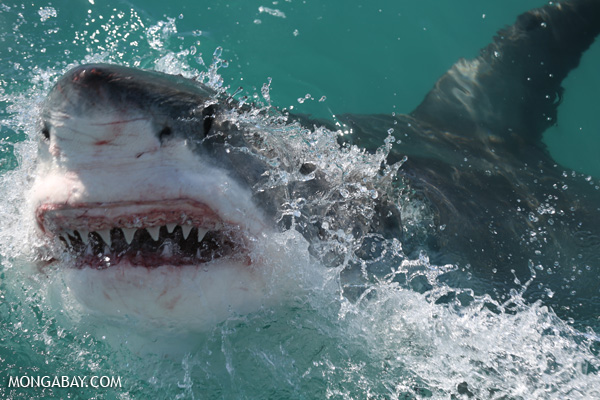 The Antarctic would still be too cold for Great White Sharks. Global warming could make the waters around Antarctica hospitable to sharks for the first time in 40 million years. Their return could have devastating ecological consequences report researchers from the University of Rhode Island. Analyzing the physiological adaptations and metabolism of sharks and other […]
The Antarctic would still be too cold for Great White Sharks. Global warming could make the waters around Antarctica hospitable to sharks for the first time in 40 million years. Their return could have devastating ecological consequences report researchers from the University of Rhode Island. Analyzing the physiological adaptations and metabolism of sharks and other […]
Giant manta ray born in captivity for first time
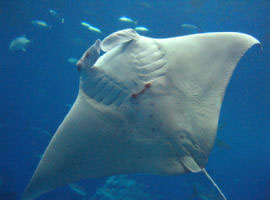 Giant manta ray born in captivity for first time Giant manta ray born in captivity for first time mongabay.com June 18, 2007 For the first time, a giant manta ray was born in captivity at an aquarium in Japan, reports the Associated Press. The baby manta ray was born Saturday at the Okinawa Churaumi Aquarium, […]
Giant manta ray born in captivity for first time Giant manta ray born in captivity for first time mongabay.com June 18, 2007 For the first time, a giant manta ray was born in captivity at an aquarium in Japan, reports the Associated Press. The baby manta ray was born Saturday at the Okinawa Churaumi Aquarium, […]
Trade in sawfish banned
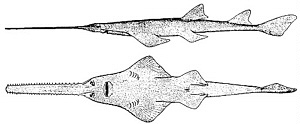 Trade in sawfish banned Trade in sawfish banned mongabay.com June 11, 2007 Trade restrictions for the endangered sawfish have been approved at the Convention on International Trade in Endangered Species (CITES) meeting the The Hague. All seven species of sawfish has been added to Appendix I of the convention, banning international commercial trade. One species, […]
Trade in sawfish banned Trade in sawfish banned mongabay.com June 11, 2007 Trade restrictions for the endangered sawfish have been approved at the Convention on International Trade in Endangered Species (CITES) meeting the The Hague. All seven species of sawfish has been added to Appendix I of the convention, banning international commercial trade. One species, […]
Sharks do not win CITES protection
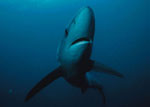 Sharks do not win CITES protection Sharks do not win CITES protection mongabay.com June 8, 2007 Two endangered species of sharks failed to win protection at the Convention on International Trade in Endangered Species (CITES) meeting in The Hague. The proposal to list the spiny dogfish and the porbeagle shark, an initiative that was widely […]
Sharks do not win CITES protection Sharks do not win CITES protection mongabay.com June 8, 2007 Two endangered species of sharks failed to win protection at the Convention on International Trade in Endangered Species (CITES) meeting in The Hague. The proposal to list the spiny dogfish and the porbeagle shark, an initiative that was widely […]
Shark fin does not cure cancer
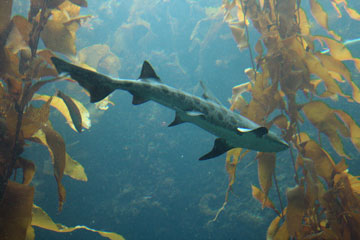 Shark fin does not cure cancer Shark fin does not cure cancer Study reports shark cartilage does not help fight lung cancer mongabay.com June 3, 2007 Shark cartilage, long believed in traditional medicine to be an anti-cancer agent, confers no health benefits in surviving lung cancer reports an extensive study presented at the 43rd annual […]
Shark fin does not cure cancer Shark fin does not cure cancer Study reports shark cartilage does not help fight lung cancer mongabay.com June 3, 2007 Shark cartilage, long believed in traditional medicine to be an anti-cancer agent, confers no health benefits in surviving lung cancer reports an extensive study presented at the 43rd annual […]
Chinese support shark conservation, but still demand shark fin
 Chinese support shark conservation, but still demand shark fin Chinese support shark conservation, but still demand shark fin mongabay.com May 25, 2007 There is growing public support in China for shark conservation measures, but little understanding of the role of shark finning in declining shark populations, reveals a survey by WildAid, an environmental group. Shark […]
Chinese support shark conservation, but still demand shark fin Chinese support shark conservation, but still demand shark fin mongabay.com May 25, 2007 There is growing public support in China for shark conservation measures, but little understanding of the role of shark finning in declining shark populations, reveals a survey by WildAid, an environmental group. Shark […]
Shark has virgin birth
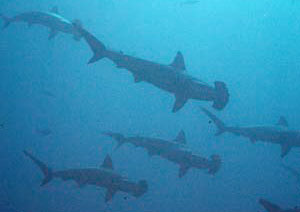 Shark has virgin birth Shark has virgin birth mongabay.com May 23, 2007 A captive hammerhead shark gave birth to a pup without mating, reported researchers on Wednesday. It is the first time that parthenogenesis, as virginal birth as called, has been observed in a shark. Writing in the journal Biology Letters, a team of scientists […]
Shark has virgin birth Shark has virgin birth mongabay.com May 23, 2007 A captive hammerhead shark gave birth to a pup without mating, reported researchers on Wednesday. It is the first time that parthenogenesis, as virginal birth as called, has been observed in a shark. Writing in the journal Biology Letters, a team of scientists […]
Overfishing of sharks causing shellfish decline
 Overfishing of sharks causes shellfish decline Overfishing of sharks causes shellfish decline mongabay.com March 29, 2007 Overfishing of large sharks is reducing the abundance of shellfish reports a study published in the March 30 issue of the journal Science. A team of Canadian and American biologists has found that population declines in large predatory shark […]
Overfishing of sharks causes shellfish decline Overfishing of sharks causes shellfish decline mongabay.com March 29, 2007 Overfishing of large sharks is reducing the abundance of shellfish reports a study published in the March 30 issue of the journal Science. A team of Canadian and American biologists has found that population declines in large predatory shark […]
New shark species discovered in Indonesia
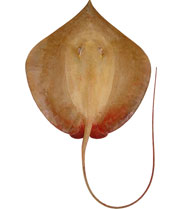 New shark species discovered in Indonesia New shark species discovered in Indonesia Rhett A. Butler, mongabay.com February 28, 2007 Scientists discovered at least 20 previously unknown species in the first comprehensive survey of Indonesia’s sharks and rays in nearly 150 years. Six of their discoveries have now been formally described, while the others will be […]
New shark species discovered in Indonesia New shark species discovered in Indonesia Rhett A. Butler, mongabay.com February 28, 2007 Scientists discovered at least 20 previously unknown species in the first comprehensive survey of Indonesia’s sharks and rays in nearly 150 years. Six of their discoveries have now been formally described, while the others will be […]
Sharks increasingly endangered as finning, overfishing take toll
 Sharks increasingly endangered as finning, overfishing take toll Sharks increasingly endangered as finning, overfishing take toll Rhett A. Butler, mongabay.com February 23, 2007 Scientists added several species of pelagic sharks to IUCN Red List of Threatened Species after research found them to be more endangered than previously thought. Three species of thresher sharks were listed […]
Sharks increasingly endangered as finning, overfishing take toll Sharks increasingly endangered as finning, overfishing take toll Rhett A. Butler, mongabay.com February 23, 2007 Scientists added several species of pelagic sharks to IUCN Red List of Threatened Species after research found them to be more endangered than previously thought. Three species of thresher sharks were listed […]
U.S. leads world in shark attacks in 2006
 U.S. leads world in shark attacks in 2006 U.S. leads world in shark attacks in 2006 mongabay.com February 13, 2007 The United States led the world in shark attacks in 2006, according to figures released from the University of Florida’s International Shark Attack File. The U.S. had 38 shark attacks, down from 40 in 2005. […]
U.S. leads world in shark attacks in 2006 U.S. leads world in shark attacks in 2006 mongabay.com February 13, 2007 The United States led the world in shark attacks in 2006, according to figures released from the University of Florida’s International Shark Attack File. The U.S. had 38 shark attacks, down from 40 in 2005. […]
Unusual prehistoric shark beast captured in Japan
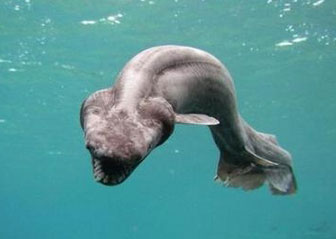 Pictures of the ‘living fossil’ courtesy of Awashima Marine Park in Japan A rare frilled shark was captured live by fishermen off the coast of Japan. The toothy eel-like creature was taken to Awashima Marine Park in Shizuoka where it later died, according to Reuters. The 5-foot (1.6 meter) long beast was believed to be […]
Pictures of the ‘living fossil’ courtesy of Awashima Marine Park in Japan A rare frilled shark was captured live by fishermen off the coast of Japan. The toothy eel-like creature was taken to Awashima Marine Park in Shizuoka where it later died, according to Reuters. The 5-foot (1.6 meter) long beast was believed to be […]
Great Barrier Reef shark populations collapsing finds study
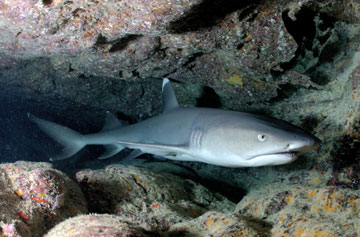 Great Barrier Reef shark populations collapsing finds study Great Barrier Reef shark populations collapsing finds study mongabay.com December 4, 2006 Coral reef shark populations are declining rapidly due to fishing according to research published in the December 5th issue of the journal Current Biology. The paper says that “no-take zones” — areas where fishing is […]
Great Barrier Reef shark populations collapsing finds study Great Barrier Reef shark populations collapsing finds study mongabay.com December 4, 2006 Coral reef shark populations are declining rapidly due to fishing according to research published in the December 5th issue of the journal Current Biology. The paper says that “no-take zones” — areas where fishing is […]
Up to 73 million sharks killed per year for their fins
 Up to 73 million sharks killed per year for their fins Up to 73 million sharks killed per year for their fins mongabay.com October 3, 2006 Between 26 million and 73 million sharks are killed each year for their fins according to a new paper published in the October 2006 edition of Ecology Letters. The […]
Up to 73 million sharks killed per year for their fins Up to 73 million sharks killed per year for their fins mongabay.com October 3, 2006 Between 26 million and 73 million sharks are killed each year for their fins according to a new paper published in the October 2006 edition of Ecology Letters. The […]
New species of ‘walking’ shark discovered
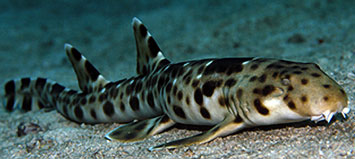 New species of ‘walking’ shark discovered New species of ‘walking’ shark discovered Conservation International September 18, 2006 Two recent expeditions led by Conservation International (CI) to the heart of Asia’s “Coral Triangle” discovered dozens of new species of marine life including epaulette sharks, “flasher” wrasse and reef-building coral, confirming the region as the Earth’s richest […]
New species of ‘walking’ shark discovered New species of ‘walking’ shark discovered Conservation International September 18, 2006 Two recent expeditions led by Conservation International (CI) to the heart of Asia’s “Coral Triangle” discovered dozens of new species of marine life including epaulette sharks, “flasher” wrasse and reef-building coral, confirming the region as the Earth’s richest […]
Sharks tracked by satellite
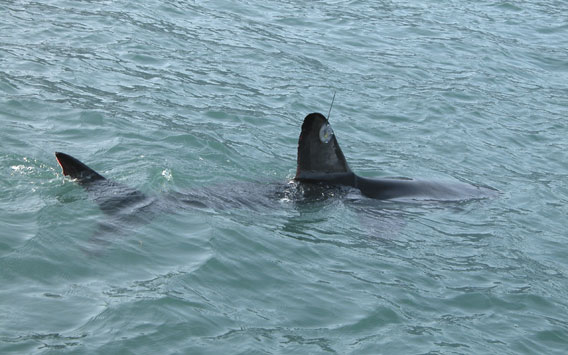 Sharks tracked by satellite Sharks tracked by satellite Stanford University news release October 9, 2005 Tagged salmon shark. Image courtesy of Stanford Electronic tags broadcasting from the dorsal fins of salmon sharks reveal that these top predators migrate from the glacial waters of Alaska to the warm seas off Hawaii, according to a new study […]
Sharks tracked by satellite Sharks tracked by satellite Stanford University news release October 9, 2005 Tagged salmon shark. Image courtesy of Stanford Electronic tags broadcasting from the dorsal fins of salmon sharks reveal that these top predators migrate from the glacial waters of Alaska to the warm seas off Hawaii, according to a new study […]
Feeds: news | india | latam | brasil | indonesia
 The recent top stories from Mongabay Latam, our Spanish-language service, include a call to cover climate change, the dangers of opposing Colombia’s largest hydropower plant, and the most inspiring conservation news of 2018. ‘We are not doing enough’: 25 media groups commit to cover climate change “Journalists across the continent have a profound obligation to […]
The recent top stories from Mongabay Latam, our Spanish-language service, include a call to cover climate change, the dangers of opposing Colombia’s largest hydropower plant, and the most inspiring conservation news of 2018. ‘We are not doing enough’: 25 media groups commit to cover climate change “Journalists across the continent have a profound obligation to […] The top stories from our Spanish-language service, Mongabay Latam, looked at jail sentences for wildlife traffickers in Bolivia; conserving river dolphins in Venezuela and culling lionfish in Colombia; and shark bycatch in Chile. Jaguar-tooth traffickers get up to four years’ prison in Bolivia A Bolivian court has set a legal precedent by sentencing traffickers in […]
The top stories from our Spanish-language service, Mongabay Latam, looked at jail sentences for wildlife traffickers in Bolivia; conserving river dolphins in Venezuela and culling lionfish in Colombia; and shark bycatch in Chile. Jaguar-tooth traffickers get up to four years’ prison in Bolivia A Bolivian court has set a legal precedent by sentencing traffickers in […] The top stories from our Spanish-language service, Mongabay Latam, investigated Colombia’s roadkill rates; Chile’s marine forests; and Chinese energy projects in Ecuador. Mammals pay highest toll on Colombia’s highways Plans to double Colombia’s highway network by 2035 represent a major threat to wildlife conservation. A roadkill app and research have documented some 11,000 roadkill incidents, […]
The top stories from our Spanish-language service, Mongabay Latam, investigated Colombia’s roadkill rates; Chile’s marine forests; and Chinese energy projects in Ecuador. Mammals pay highest toll on Colombia’s highways Plans to double Colombia’s highway network by 2035 represent a major threat to wildlife conservation. A roadkill app and research have documented some 11,000 roadkill incidents, […] The top stories last week from our Spanish-language service, Mongabay Latam, followed the fate of Suriname’s hunted jaguars, Bogota’s urban forest preserve, and Chile’s Humboldt Archipelago. Suriname’s jaguars killed for arthritis creams and wine Suriname’s jaguar population is being decimated for the Asian market in arthritis cream, soap, aphrodisiacs and even wine, according to an […]
The top stories last week from our Spanish-language service, Mongabay Latam, followed the fate of Suriname’s hunted jaguars, Bogota’s urban forest preserve, and Chile’s Humboldt Archipelago. Suriname’s jaguars killed for arthritis creams and wine Suriname’s jaguar population is being decimated for the Asian market in arthritis cream, soap, aphrodisiacs and even wine, according to an […] The most popular stories from our Spanish-language service, Mongabay Latam, followed a new green-eyed shark species in Belize, salmon farms in Patagonia, blast fishing in Peru, a cocaine-laden plane in a Peruvian park, and an Andean bear mystery, also in Peru. Belize’s tiny sixgill shark species at risk “A little shark so adorable, you want […]
The most popular stories from our Spanish-language service, Mongabay Latam, followed a new green-eyed shark species in Belize, salmon farms in Patagonia, blast fishing in Peru, a cocaine-laden plane in a Peruvian park, and an Andean bear mystery, also in Peru. Belize’s tiny sixgill shark species at risk “A little shark so adorable, you want […] Recent top stories from our Spanish-language service, Mongabay-Latam, revealed Peruvians’ hidden shark diet, new species in Colombia’s Chiribiquete National Park, dire predictions from Mexico’s “Batman,” and more. Peruvians are eating shark and don’t know it Three out of four Peruvians recently surveyed were found to have eaten shark meat without knowing it. The problem stems […]
Recent top stories from our Spanish-language service, Mongabay-Latam, revealed Peruvians’ hidden shark diet, new species in Colombia’s Chiribiquete National Park, dire predictions from Mexico’s “Batman,” and more. Peruvians are eating shark and don’t know it Three out of four Peruvians recently surveyed were found to have eaten shark meat without knowing it. The problem stems […] Shipments of hammerhead shark fins were approved by the Costa Rican government in violation of an international treaty, conservation groups allege. A school of hammerhead sharks swim near the Galapagos Islands. Costa Rica has been exporting two species of hammerheads whose trade is limited under Appendix II of CITES. Photo: Alex Hearn. On December 24, […]
Shipments of hammerhead shark fins were approved by the Costa Rican government in violation of an international treaty, conservation groups allege. A school of hammerhead sharks swim near the Galapagos Islands. Costa Rica has been exporting two species of hammerheads whose trade is limited under Appendix II of CITES. Photo: Alex Hearn. On December 24, […].jpg) Zebra Shark (Stegastoma fasciatum). Photo credit: Jürg Brand The government of Madagascar has established the Indian Ocean island’s first shark sanctuary in an area famous for its marine biodiversity, reports the Wildlife Conservation Society (WCS). The new marine protections apply to Antongil Bay, which is located in northwestern Madagascar and is known for its coral […]
Zebra Shark (Stegastoma fasciatum). Photo credit: Jürg Brand The government of Madagascar has established the Indian Ocean island’s first shark sanctuary in an area famous for its marine biodiversity, reports the Wildlife Conservation Society (WCS). The new marine protections apply to Antongil Bay, which is located in northwestern Madagascar and is known for its coral […] Researchers find that warming ocean and acidification could hit young sharks hard Fierce predatory sharks rule the oceans from the apex of the food pyramid. But climate change may be tougher than these marine hunters, a new study suggests. As oceans warm and their waters become more acidic, fewer sharks may survive their infancies. No […]
Researchers find that warming ocean and acidification could hit young sharks hard Fierce predatory sharks rule the oceans from the apex of the food pyramid. But climate change may be tougher than these marine hunters, a new study suggests. As oceans warm and their waters become more acidic, fewer sharks may survive their infancies. No […] Shark fins are usually sliced off the animal while its still alive. Photo by: WildAid/Hilton. Shark fin demand has dropped precipitously in China in just a few years, according to a new report by WildAid. The wildlife NGO has spearheaded a major media campaign, incorporating celebrities like Yao Ming, to raise awareness about the impacts […]
Shark fins are usually sliced off the animal while its still alive. Photo by: WildAid/Hilton. Shark fin demand has dropped precipitously in China in just a few years, according to a new report by WildAid. The wildlife NGO has spearheaded a major media campaign, incorporating celebrities like Yao Ming, to raise awareness about the impacts […] A long snout with teeth jutting from the sides? Check. Catfish-like barbels dangling from its chin? Got them. Gills on the side of its body? It has those, too. These are characteristics of a bizarre group of sharks known as sawsharks (family Pristiophoriforidae). And until recently, only seven species were recognized. However, following examination of […]
A long snout with teeth jutting from the sides? Check. Catfish-like barbels dangling from its chin? Got them. Gills on the side of its body? It has those, too. These are characteristics of a bizarre group of sharks known as sawsharks (family Pristiophoriforidae). And until recently, only seven species were recognized. However, following examination of […] Thousands of Carnival revelers in Trinidad wouldn’t think of missing the chance to go to Maracas Beach, the most famous strip of sand on the small Caribbean island off the northeast coast of Venezuela. Beachgoers might not think twice about eating a favorite food called “shark bake” either – at least, until now. But this […]
Thousands of Carnival revelers in Trinidad wouldn’t think of missing the chance to go to Maracas Beach, the most famous strip of sand on the small Caribbean island off the northeast coast of Venezuela. Beachgoers might not think twice about eating a favorite food called “shark bake” either – at least, until now. But this […] Shark catch in Kesennuma, Japan. Photo by Shawn Heinrichs Last month scientists released a study warning that one quarter of all sharks and rays are threatened with extinction. The research, published in the open-access journal eLife on January 21, was the result of collaboration between 300 scientists from 64 countries. It concluded that overfishing is […]
Shark catch in Kesennuma, Japan. Photo by Shawn Heinrichs Last month scientists released a study warning that one quarter of all sharks and rays are threatened with extinction. The research, published in the open-access journal eLife on January 21, was the result of collaboration between 300 scientists from 64 countries. It concluded that overfishing is […] Living whale shark. All photos courtesy of WildLifeRisk A four-year investigation by WildLifeRisk, a Hong Kong-based marine conservation group, has found that a single factory in China’s Zhejiang Province slaughters some 600 whale sharks a year to produce oil for cosmetics and health supplements. While trade in whale shark products is prohibited under the the […]
Living whale shark. All photos courtesy of WildLifeRisk A four-year investigation by WildLifeRisk, a Hong Kong-based marine conservation group, has found that a single factory in China’s Zhejiang Province slaughters some 600 whale sharks a year to produce oil for cosmetics and health supplements. While trade in whale shark products is prohibited under the the […] Great white shark off South Africa. Photo by Rhett A. Butler One quarter of all shark and ray species are threatened with extinction, according to a new study published in the open-access journal eLife. The paper analyzed the threat and conservation status of 1,041 species of chondrichthyans—the class of fish whose skeletons are made of […]
Great white shark off South Africa. Photo by Rhett A. Butler One quarter of all shark and ray species are threatened with extinction, according to a new study published in the open-access journal eLife. The paper analyzed the threat and conservation status of 1,041 species of chondrichthyans—the class of fish whose skeletons are made of […] Scientific American magazine recently ran an article on the rediscovery of the smoothtooth blacktip shark (Carcharhinus leiodon) in a Kuwaiti fish market. Believed extinct for over 100 years, the smoothtooth had not been seen since the naturalist Wilhelm Hein returned from a trip to Yemen in 1902. With its reappearance, scientists scoured Kuwaiti markets and […]
Scientific American magazine recently ran an article on the rediscovery of the smoothtooth blacktip shark (Carcharhinus leiodon) in a Kuwaiti fish market. Believed extinct for over 100 years, the smoothtooth had not been seen since the naturalist Wilhelm Hein returned from a trip to Yemen in 1902. With its reappearance, scientists scoured Kuwaiti markets and […] Environmental groups have blasted draft text of the Trans-Pacific Partnership (TPP) released yesterday by WikiLeaks as potentially devastating to the environment and wildlife. The massive 12-nation free trade agreement has been negotiated in secret now for almost four years, and the information release by WikiLeaks shows that key environmental safeguards in the agreement are being […]
Environmental groups have blasted draft text of the Trans-Pacific Partnership (TPP) released yesterday by WikiLeaks as potentially devastating to the environment and wildlife. The massive 12-nation free trade agreement has been negotiated in secret now for almost four years, and the information release by WikiLeaks shows that key environmental safeguards in the agreement are being […] Also see our Top 10 Environmental Stories of 2013. The discovery of a new tapir species is number seven in our first ever Top 10 List of Happy Environmental Stories. Pictured here is a pair of Kobomani tapirs caught on camera trap. The individual on the left is a female and on the right a […]
Also see our Top 10 Environmental Stories of 2013. The discovery of a new tapir species is number seven in our first ever Top 10 List of Happy Environmental Stories. Pictured here is a pair of Kobomani tapirs caught on camera trap. The individual on the left is a female and on the right a […] Great white shark in South Africa. China has banned shark fin and bird’s nest soup from being served at official state banquets, reports Chinese state media. The move, announced Sunday via a notice from the Community Party’s Central Committee and the State Council, is part of a broader move to crack down on corruption and […]
Great white shark in South Africa. China has banned shark fin and bird’s nest soup from being served at official state banquets, reports Chinese state media. The move, announced Sunday via a notice from the Community Party’s Central Committee and the State Council, is part of a broader move to crack down on corruption and […] Indonesia’s flag carrier won’t transport shark fins any more Indonesia’s national carrier Garuda Indonesia has joined a growing number of airlines looking to curb the international shark fin trade by banning the transport of shark fins and other shark products on their aircraft. WWF-Indonesia, which helped campaign for the ban, called the new Garuda policy […]
Indonesia’s flag carrier won’t transport shark fins any more Indonesia’s national carrier Garuda Indonesia has joined a growing number of airlines looking to curb the international shark fin trade by banning the transport of shark fins and other shark products on their aircraft. WWF-Indonesia, which helped campaign for the ban, called the new Garuda policy […] Authorities in Costa Rica have identified a new method used by fishermen to circumvent a ban on killing sharks for their fins. According to an INTERPOL alert, fishermen are now leaving a band of skin to keep the fin attached to the spine when they kill sharks. This approach takes advantage of an apparent loophole […]
Authorities in Costa Rica have identified a new method used by fishermen to circumvent a ban on killing sharks for their fins. According to an INTERPOL alert, fishermen are now leaving a band of skin to keep the fin attached to the spine when they kill sharks. This approach takes advantage of an apparent loophole […] Peruvian fishermen slaughtered dolphins to use as bait for shark fishing, an undercover investigation has revealed. Footage showed infant and adult dolphins being harpooned then stabbed and clubbed before, in some cases, being cut open and butchered while still alive. The slaughtered dolphins were cut up and used as bait. Dolphins are also killed for […]
Peruvian fishermen slaughtered dolphins to use as bait for shark fishing, an undercover investigation has revealed. Footage showed infant and adult dolphins being harpooned then stabbed and clubbed before, in some cases, being cut open and butchered while still alive. The slaughtered dolphins were cut up and used as bait. Dolphins are also killed for […] Overfishing for sharks is having detrimental effects on coral reefs, finds a new study published in the journal PLOS One. The research is based on long-term monitoring reefs off northwestern Australia. The authors, led by Jonathan Ruppert, formerly of the University of Toronto and now with York University, compared community structure between several atoll-like reefs. […]
Overfishing for sharks is having detrimental effects on coral reefs, finds a new study published in the journal PLOS One. The research is based on long-term monitoring reefs off northwestern Australia. The authors, led by Jonathan Ruppert, formerly of the University of Toronto and now with York University, compared community structure between several atoll-like reefs. […] A species of shark that uses its fins to “walk” along the bottom of the ocean floor has been discovered off the coast of Indonesia. The shark, Hemiscyllium halmahera, uses its fins to wiggle along the seabed and forage for small fish and crustaceans, scientists from Conservation International said on Friday. The shark, which has […]
A species of shark that uses its fins to “walk” along the bottom of the ocean floor has been discovered off the coast of Indonesia. The shark, Hemiscyllium halmahera, uses its fins to wiggle along the seabed and forage for small fish and crustaceans, scientists from Conservation International said on Friday. The shark, which has […] Polka-dotted and striped. Massive but docile. That’s the whale shark for you – the largest fish and shark in the world. But despite being major tourist attractions, the lives of these awe-inspiring creatures of the ocean remain far from being demystified. However, a team of researchers from Australia may now have some answers to where […]
Polka-dotted and striped. Massive but docile. That’s the whale shark for you – the largest fish and shark in the world. But despite being major tourist attractions, the lives of these awe-inspiring creatures of the ocean remain far from being demystified. However, a team of researchers from Australia may now have some answers to where […] Warning: some photos may be disturbing or graphic. In a single night in March, a band of heavily-armed, horse-riding poachers slaughtered 89 elephants in southern Chad, thirty of which were pregnant females. The carnage was the worst poaching incident of the year, but even this slaughter paled in comparison to the 650 elephants killed in […]
Warning: some photos may be disturbing or graphic. In a single night in March, a band of heavily-armed, horse-riding poachers slaughtered 89 elephants in southern Chad, thirty of which were pregnant females. The carnage was the worst poaching incident of the year, but even this slaughter paled in comparison to the 650 elephants killed in […] A giant mako shark caught by a sports-fisherman in California Monday has spurred a conversation about declining shark populations worldwide, reports the Associated Press. The female shark caught Monday off Huntington Beach by Jason Johnston of Mesquite, Texas, weighed in at 1,323 pounds and measured 11 feet long and eight feet around at its midsection. […]
A giant mako shark caught by a sports-fisherman in California Monday has spurred a conversation about declining shark populations worldwide, reports the Associated Press. The female shark caught Monday off Huntington Beach by Jason Johnston of Mesquite, Texas, weighed in at 1,323 pounds and measured 11 feet long and eight feet around at its midsection. […] Blue shark (Prionace glauca) off southern California. Photo by: Mark Conlin/NMFS. A recent study published in mongabay.com’s open access journal Tropical Conservation Science raises concerns about levels of heavy metals, particularly lead (Pb), present in shark meat, as well as the decline of shark abundance due to global fishing pressures. Sharks are primarily caught as […]
Blue shark (Prionace glauca) off southern California. Photo by: Mark Conlin/NMFS. A recent study published in mongabay.com’s open access journal Tropical Conservation Science raises concerns about levels of heavy metals, particularly lead (Pb), present in shark meat, as well as the decline of shark abundance due to global fishing pressures. Sharks are primarily caught as […] The scalloped hammerhead shark is one of five sharks and two manta rays that won protection today at CITES, so long as it isn’t overturned. Photo by: Stacy Jupiter/WCS. Today, for the first time, sharks and rays have won the vote for better protection under CITES (the Convention on International Trade in Endangered Species), the […]
The scalloped hammerhead shark is one of five sharks and two manta rays that won protection today at CITES, so long as it isn’t overturned. Photo by: Stacy Jupiter/WCS. Today, for the first time, sharks and rays have won the vote for better protection under CITES (the Convention on International Trade in Endangered Species), the […] Scalloped hammerheads (Sphyrna lewini) off Cocos Island, Costa Rica. This species is up for protection by CITES this month if nations votes in its favor. Photo by: Barry Peters. While a new study warns that up to 100M sharks are killed annually, there are signs out of China that demand for shark fin may be […]
Scalloped hammerheads (Sphyrna lewini) off Cocos Island, Costa Rica. This species is up for protection by CITES this month if nations votes in its favor. Photo by: Barry Peters. While a new study warns that up to 100M sharks are killed annually, there are signs out of China that demand for shark fin may be […] The 3rd Annual New York Wildlife Conservation Film Festival (WFCC.org) runs from January 30 – February 2, 2013. Ahead of the event, Mongabay.com is running a series of Q&As with filmmakers and presenters. For more interviews, please see our WCFF feed. Mobula Rays at Isla Mujeres, Mexico in 2012. Photo by Shawn Heinrichs Tens of […]
The 3rd Annual New York Wildlife Conservation Film Festival (WFCC.org) runs from January 30 – February 2, 2013. Ahead of the event, Mongabay.com is running a series of Q&As with filmmakers and presenters. For more interviews, please see our WCFF feed. Mobula Rays at Isla Mujeres, Mexico in 2012. Photo by Shawn Heinrichs Tens of […] Sharks are among the most feared of all the world’s predators, yet humans kill tens of millions of sharks for every person who falls victim to shark attack. Part of our fear stems from lack of understanding. A new eBook however tries to change that. Jeff Corwin, an Emmy Award Winning TV host, has this […]
Sharks are among the most feared of all the world’s predators, yet humans kill tens of millions of sharks for every person who falls victim to shark attack. Part of our fear stems from lack of understanding. A new eBook however tries to change that. Jeff Corwin, an Emmy Award Winning TV host, has this […] A forest elephant, which is considered by some to be a distinct species of elephant in Africa, in Gabon. Both forest elephants and savannah elephants are increasingly killed for their tusks. The Wildlife Conservation Society (WCS) estimates that 30,000 elephants will be killed this year along for the black market trade. Photo by: Rhett A. […]
A forest elephant, which is considered by some to be a distinct species of elephant in Africa, in Gabon. Both forest elephants and savannah elephants are increasingly killed for their tusks. The Wildlife Conservation Society (WCS) estimates that 30,000 elephants will be killed this year along for the black market trade. Photo by: Rhett A. […] Green sea turtle released back into its natural habitat after being raised for 10 months. Photo by: Sea Turtles 911. Earlier this month, Sea Turtles 911, a conservation organization in China, released two green sea turtles (Chelonia mydas) and a juvenile whale shark (Rhincodon typus) back into the wild. “These two animals share the ocean, […]
Green sea turtle released back into its natural habitat after being raised for 10 months. Photo by: Sea Turtles 911. Earlier this month, Sea Turtles 911, a conservation organization in China, released two green sea turtles (Chelonia mydas) and a juvenile whale shark (Rhincodon typus) back into the wild. “These two animals share the ocean, […] Brent Stewart tags a whale shark with a radio-frequency identification (RFID) tag in Indonesia. Photo: © CI/Mark Erdmann. Researchers have a caught a juvenile—though still massive—whale shark on camera sucking fish out of a hole in an Indonesian fishing net. Posted on YouTube.com, the video has gone viral and has been viewed by 1.2 million […]
Brent Stewart tags a whale shark with a radio-frequency identification (RFID) tag in Indonesia. Photo: © CI/Mark Erdmann. Researchers have a caught a juvenile—though still massive—whale shark on camera sucking fish out of a hole in an Indonesian fishing net. Posted on YouTube.com, the video has gone viral and has been viewed by 1.2 million […] Captive whale shark in the Georgia aquarium. Photo by: Zac Wolf. The death of one of the world’s largest recorded whale sharks (Rhincodon typus) in the Arabian Sea provoked a sudden global interest in these massive shark. Weighing 14.5 tons, the fish in question made ‘whale shark ‘whale shark’ the number 3 top search in […]
Captive whale shark in the Georgia aquarium. Photo by: Zac Wolf. The death of one of the world’s largest recorded whale sharks (Rhincodon typus) in the Arabian Sea provoked a sudden global interest in these massive shark. Weighing 14.5 tons, the fish in question made ‘whale shark ‘whale shark’ the number 3 top search in […] Leopard Shark (Triakis semifasciata). Photo by Rhett Butler. Analyzing the DNA sequences of 4,383 specimens of sharks and rays, researchers have discovered 79 potentially new species, raising both the known diversity of this predacious family and concerns that many species are likely more imperiled than thought. Already 32 percent of open ocean sharks and rays […]
Leopard Shark (Triakis semifasciata). Photo by Rhett Butler. Analyzing the DNA sequences of 4,383 specimens of sharks and rays, researchers have discovered 79 potentially new species, raising both the known diversity of this predacious family and concerns that many species are likely more imperiled than thought. Already 32 percent of open ocean sharks and rays […] Researchers from the Wildlife Conservation Society, the University of Exeter, and the Government of Mexico have published the first-ever satellite telemetry study on the manta ray, the world’s largest ray species. The findings will help inform ecosystem-based management plans for the rays, which are in decline worldwide due to fishing and accidental capture. Photo credit: […]
Researchers from the Wildlife Conservation Society, the University of Exeter, and the Government of Mexico have published the first-ever satellite telemetry study on the manta ray, the world’s largest ray species. The findings will help inform ecosystem-based management plans for the rays, which are in decline worldwide due to fishing and accidental capture. Photo credit: […] Remote camera traps, which have become a hugely important conservation tool on land during the past decade, have now gone underwater. Marine biologists have used underwater video camera traps to compare the population of Caribbean reef sharks (Carcharhinus perezii) in Belize’s protected areas versus fishing areas in a new study in the open-access journal PLoS […]
Remote camera traps, which have become a hugely important conservation tool on land during the past decade, have now gone underwater. Marine biologists have used underwater video camera traps to compare the population of Caribbean reef sharks (Carcharhinus perezii) in Belize’s protected areas versus fishing areas in a new study in the open-access journal PLoS […] Victories won by activists around the world tops our list of the big environmental stories of the year. In this photo: a young woman is placed in handcuffs and arrested for civil disobedience against the Keystone XL Pipeline in the U.S. In all, 1,252 people were arrested in the two week long action. Photo by: […]
Victories won by activists around the world tops our list of the big environmental stories of the year. In this photo: a young woman is placed in handcuffs and arrested for civil disobedience against the Keystone XL Pipeline in the U.S. In all, 1,252 people were arrested in the two week long action. Photo by: […] Matt Miller is director of communications for The Nature Conservancy in Idaho, a position he’s held for ten years. He is responsible for the chapter’s publications and digital media. He writes for the Conservancy’s blogs Cool Green Science and Idaho Nature Notes. He has also completed two conservation fellowships for the Conservancy’s programs in Colombia […]
Matt Miller is director of communications for The Nature Conservancy in Idaho, a position he’s held for ten years. He is responsible for the chapter’s publications and digital media. He writes for the Conservancy’s blogs Cool Green Science and Idaho Nature Notes. He has also completed two conservation fellowships for the Conservancy’s programs in Colombia […] Blue shark with longline hook. Photo by: Terry Goss. A photo of a shark with a rusting hook in its maw is the grand prize winner of the Ocean in Focus photo contest, which seeks to raise awareness for conservation issues in the oceans. The image is of a blue shark (Prionace glauca) taken off […]
Blue shark with longline hook. Photo by: Terry Goss. A photo of a shark with a rusting hook in its maw is the grand prize winner of the Ocean in Focus photo contest, which seeks to raise awareness for conservation issues in the oceans. The image is of a blue shark (Prionace glauca) taken off […] California governor Jerry Brown on Friday signed legislation banning the the importation, possession and sale of shark fins in California. The move follows similar bans in Washington, Oregon and Hawaii and comes as shark populations are on the decline worldwide. In signing the legislation, Brown called the practice of shark finning “cruel” and damaging to […]
California governor Jerry Brown on Friday signed legislation banning the the importation, possession and sale of shark fins in California. The move follows similar bans in Washington, Oregon and Hawaii and comes as shark populations are on the decline worldwide. In signing the legislation, Brown called the practice of shark finning “cruel” and damaging to […] The Republic of the Marshall Islands has created the world’s biggest shark reserve: so large that all of Mexico could fit comfortably inside. With new legislation, commercial shark fishing is now completely banned in Marshall Islands’ 768,547 square miles (1,990,530 square kilometers) of ocean. The new shark sanctuary not only bans commercial fishing, but deems […]
The Republic of the Marshall Islands has created the world’s biggest shark reserve: so large that all of Mexico could fit comfortably inside. With new legislation, commercial shark fishing is now completely banned in Marshall Islands’ 768,547 square miles (1,990,530 square kilometers) of ocean. The new shark sanctuary not only bans commercial fishing, but deems […] Leopard Shark (Triakis semifasciata). Photo by Rhett Butler. California moved a step closer to banning the sale and trade of shark fin with the passage Tuesday of Senate Bill 376. The bill, which passed 25-9, now goes the governor, whose approval would make the ban law. The bill was introduced to the California State Assembly […]
Leopard Shark (Triakis semifasciata). Photo by Rhett Butler. California moved a step closer to banning the sale and trade of shark fin with the passage Tuesday of Senate Bill 376. The bill, which passed 25-9, now goes the governor, whose approval would make the ban law. The bill was introduced to the California State Assembly […] The Honduran island of Roatan. Photo by: Rhett A. Butler. Endangered sharks are finding more sanctuaries. Honduras has announced that commercial shark fishing will be banned from its 92,665 square miles (240,000 square kilometers) of national waters. Honduras says the ban, which follows a moratorium on shark fishing, will bring in tourism revenue and preserve […]
The Honduran island of Roatan. Photo by: Rhett A. Butler. Endangered sharks are finding more sanctuaries. Honduras has announced that commercial shark fishing will be banned from its 92,665 square miles (240,000 square kilometers) of national waters. Honduras says the ban, which follows a moratorium on shark fishing, will bring in tourism revenue and preserve […] Tourism in Palau makes sharks worth more alive than dead finds a new study. Here a diver in Palau swims with five reef sharks. Photo by: Todd Essick. For the Pacific island nation of Palau, sharks are worth much more alive than dead. A new study by the Australian Institute of Marine Science (AIMS) has […]
Tourism in Palau makes sharks worth more alive than dead finds a new study. Here a diver in Palau swims with five reef sharks. Photo by: Todd Essick. For the Pacific island nation of Palau, sharks are worth much more alive than dead. A new study by the Australian Institute of Marine Science (AIMS) has […] Last year Hawaii banned the sale of shark fins; California may be next. Bill 376, introduced by two Democrats, would outlaw the sale of shark fins, including the popular Asian delicacy shark fin soup, in the US’s most populous state. One of the bill’s sponsors, Paul Fong, said at a new conference as reported by […]
Last year Hawaii banned the sale of shark fins; California may be next. Bill 376, introduced by two Democrats, would outlaw the sale of shark fins, including the popular Asian delicacy shark fin soup, in the US’s most populous state. One of the bill’s sponsors, Paul Fong, said at a new conference as reported by […] Last week the US Senate passed the Shark Conservation Act, which bolsters the prohibition of shark-finning in US waters and puts the US at the forefront of shark conservation. Finning involves catching a live shark, cutting off its fins, then dumping it back into the water where it suffers a slow death of asphyxiation on […]
Last week the US Senate passed the Shark Conservation Act, which bolsters the prohibition of shark-finning in US waters and puts the US at the forefront of shark conservation. Finning involves catching a live shark, cutting off its fins, then dumping it back into the water where it suffers a slow death of asphyxiation on […] Sharks dwell in the ocean, wolves on land; sharks are a type of fish, wolves are a mammal; sharks go back some 400 million years, wolves only some 2 million years. So, these animals should have little in common, right? However, a new study in Frontiers in Ecology and the Environment points to surprising similarities […]
Sharks dwell in the ocean, wolves on land; sharks are a type of fish, wolves are a mammal; sharks go back some 400 million years, wolves only some 2 million years. So, these animals should have little in common, right? However, a new study in Frontiers in Ecology and the Environment points to surprising similarities […] Dolphins, whales, and dugongs will be safe from hunting in the waters surrounding the Pacific nation of Palau. At the Convention on Biological Diversity (CBD) in Nagoya, Japan, Palau’s Minister of the Environment, Natural Resources and Tourism, Harry Fritz, announced the establishment of a marine mammal sanctuary covering over 230,000 square miles (600,000 square kilometers) […]
Dolphins, whales, and dugongs will be safe from hunting in the waters surrounding the Pacific nation of Palau. At the Convention on Biological Diversity (CBD) in Nagoya, Japan, Palau’s Minister of the Environment, Natural Resources and Tourism, Harry Fritz, announced the establishment of a marine mammal sanctuary covering over 230,000 square miles (600,000 square kilometers) […] Shark attack survivors urged the United Nations to take measures to protect sharks, which are increasingly threatened by unsustainable fishing practices. Brought together by the Pew Environment Group, nine shark attack victims—Achmat Hassiem of South Africa, Paul de Gelder of Australia, James Elliott of Britain, Yann Perras of France, Vincent Motais de Narbonne of Réunion, […]
Shark attack survivors urged the United Nations to take measures to protect sharks, which are increasingly threatened by unsustainable fishing practices. Brought together by the Pew Environment Group, nine shark attack victims—Achmat Hassiem of South Africa, Paul de Gelder of Australia, James Elliott of Britain, Yann Perras of France, Vincent Motais de Narbonne of Réunion, […] If you take a teaspoon and dip it into the ocean what will you have? Some drops of lifeless water? Only a few decades ago this is what scientists would have said, however, the development of increasingly powerful microscopes have shown us a world long unknown, which has vital importance for the survival of one […]
If you take a teaspoon and dip it into the ocean what will you have? Some drops of lifeless water? Only a few decades ago this is what scientists would have said, however, the development of increasingly powerful microscopes have shown us a world long unknown, which has vital importance for the survival of one […] Kristian Teleki, Vice President for Science Initiatives for SeaWeb and former Director of the International Coral Reef Action Network (ICRAN), spoke with Laurel Neme on her “The WildLife” radio show and podcast about the biology of corals, threats to coral reefs, and what can be done to halt their decline. This interview originally aired May […]
Kristian Teleki, Vice President for Science Initiatives for SeaWeb and former Director of the International Coral Reef Action Network (ICRAN), spoke with Laurel Neme on her “The WildLife” radio show and podcast about the biology of corals, threats to coral reefs, and what can be done to halt their decline. This interview originally aired May […] Citibank Hong Kong has canceled its promotion of shark fin soup after activists cried foul, according to the New York Times. The branch had offered Citibank card holders 15 percent off a shark fin soup dinner at Maxim’s Chinese Cuisine for the month of July. But the bank has since canceled the promotion early after […]
Citibank Hong Kong has canceled its promotion of shark fin soup after activists cried foul, according to the New York Times. The branch had offered Citibank card holders 15 percent off a shark fin soup dinner at Maxim’s Chinese Cuisine for the month of July. But the bank has since canceled the promotion early after […] Governor of Hawaii, Linda Lingle, has signed into law a ban on shark-fin soup beginning July 1st, 2011, according to Reuters. The soup is currently served in a number of Chinese restaurants in Hawaii, but the trade has decimated certain shark species due to overfishing. Restaurants will be allowed to finish their inventory of shark […]
Governor of Hawaii, Linda Lingle, has signed into law a ban on shark-fin soup beginning July 1st, 2011, according to Reuters. The soup is currently served in a number of Chinese restaurants in Hawaii, but the trade has decimated certain shark species due to overfishing. Restaurants will be allowed to finish their inventory of shark […] The biodiversity crisis, the climate crisis, the deforestation crisis: we are living in an age when environmental issues have moved from regional problems to global ones. A generation or two before ours and one might speak of saving the beauty of Northern California; conserving a single species—say the white rhino—from extinction; or preserving an ecological […]
The biodiversity crisis, the climate crisis, the deforestation crisis: we are living in an age when environmental issues have moved from regional problems to global ones. A generation or two before ours and one might speak of saving the beauty of Northern California; conserving a single species—say the white rhino—from extinction; or preserving an ecological […] As a child I read about the near-extinction of the American bison. Once the dominant species on America’s Great Plains, I remember books illustrating how train-travelers would set their guns on open windows and shoot down bison by the hundreds as the locomotive sped through what was left of the wild west. The American bison […]
As a child I read about the near-extinction of the American bison. Once the dominant species on America’s Great Plains, I remember books illustrating how train-travelers would set their guns on open windows and shoot down bison by the hundreds as the locomotive sped through what was left of the wild west. The American bison […] Only the porbeagle shark received protection today from the Convention on International Trade in Endangered Species (CITES). Seven other shark species failed to win international protection despite plummeting populations due to overfishing. Once again, Japan led the opposition to regulating the trade in white-tipped sharks and scalloped hammerheads, including two look-alike species: the great hammerhead […]
Only the porbeagle shark received protection today from the Convention on International Trade in Endangered Species (CITES). Seven other shark species failed to win international protection despite plummeting populations due to overfishing. Once again, Japan led the opposition to regulating the trade in white-tipped sharks and scalloped hammerheads, including two look-alike species: the great hammerhead […] Sharks that dwell in the Maldives can breathe a sigh of relief: the island nation has declared 90,000 square kilometers of the Indian Ocean a safe-haven for sharks, banning shark fishing as well as any trade in shark fins. “The Maldives were one of the first countries to recognize that sharks were a key reason […]
Sharks that dwell in the Maldives can breathe a sigh of relief: the island nation has declared 90,000 square kilometers of the Indian Ocean a safe-haven for sharks, banning shark fishing as well as any trade in shark fins. “The Maldives were one of the first countries to recognize that sharks were a key reason […] The Gulf of California’s once rich marine ecosystem is in trouble. Surveys from 1999 and 2009 revealed that during the ten-year-period 60 percent of the areas showed signs of degradation, including the loss of top predators necessary to keep an ecosystem healthy, for example sharks, groupers, and snappers. “In these studies, whether reefs or mangroves, […]
The Gulf of California’s once rich marine ecosystem is in trouble. Surveys from 1999 and 2009 revealed that during the ten-year-period 60 percent of the areas showed signs of degradation, including the loss of top predators necessary to keep an ecosystem healthy, for example sharks, groupers, and snappers. “In these studies, whether reefs or mangroves, […] One hundred and thirteen countries have signed on to an agreement to protect seven migratory sharks currently threatened with extinction byway of the Convention on the Conservation of Migratory Species of Wild Animals (CMS), according to the UN Environment Program (UNEP). The agreement prohibits hunting, fishing, or deliberate killing of the great white shark, basking […]
One hundred and thirteen countries have signed on to an agreement to protect seven migratory sharks currently threatened with extinction byway of the Convention on the Conservation of Migratory Species of Wild Animals (CMS), according to the UN Environment Program (UNEP). The agreement prohibits hunting, fishing, or deliberate killing of the great white shark, basking […] Environmentalists say that the International Commissions for the Conservation of Atlantic Tuna (ICCAT) did not do enough in their yearly meeting to protect the ocean’s sharks. Member countries of ICCAT agreed on a ban big eye thresher sharks. However, Mexico was granted an exemption, allowing it to catch 110 big eye threshers, which is classified […]
Environmentalists say that the International Commissions for the Conservation of Atlantic Tuna (ICCAT) did not do enough in their yearly meeting to protect the ocean’s sharks. Member countries of ICCAT agreed on a ban big eye thresher sharks. However, Mexico was granted an exemption, allowing it to catch 110 big eye threshers, which is classified […] Great white sharks tracked swimming underneath Golden Gate bridge. Researchers have long thought that white sharks migrated across oceans, but a new study in the Proceedings of the Royal Society B shows that the population in the northeastern Pacific Ocean, along California, hasn’t mixed with other white sharks for tens of thousands of years. “White […]
Great white sharks tracked swimming underneath Golden Gate bridge. Researchers have long thought that white sharks migrated across oceans, but a new study in the Proceedings of the Royal Society B shows that the population in the northeastern Pacific Ocean, along California, hasn’t mixed with other white sharks for tens of thousands of years. “White […] The discovery of Eastern Pacific black ghostshark Hydrolagus melanophasma is notable for a number of reasons. It is the first new species of cartilaginous fish—i.e fish whose skeletons are made entirely of cartilage, such as sharks, rays, and skate—to be described in California water since 1947. It is also a representative of an ancient and […]
The discovery of Eastern Pacific black ghostshark Hydrolagus melanophasma is notable for a number of reasons. It is the first new species of cartilaginous fish—i.e fish whose skeletons are made entirely of cartilage, such as sharks, rays, and skate—to be described in California water since 1947. It is also a representative of an ancient and […] A 20-foot-long, 5,000 pound basking shark washed up on a Long Island beach yesterday, reports CNN. The shark died shortly after authorities arrived on the scene. The cause of death is unknown, although the possibility of a boat strike has been ruled out. Basking sharks can reach a length of 35 feet and weigh up […]
A 20-foot-long, 5,000 pound basking shark washed up on a Long Island beach yesterday, reports CNN. The shark died shortly after authorities arrived on the scene. The cause of death is unknown, although the possibility of a boat strike has been ruled out. Basking sharks can reach a length of 35 feet and weigh up […] The first global study of open ocean (pelagic) sharks and rays found that 32 percent of the species are threatened with extinction largely due to overfishing and bycatch, making pelagic sharks and rays more threatened than birds (12 percent), mammals (20 percent), and even amphibians (31 percent), which are considered to be undergoing an extinction […]
The first global study of open ocean (pelagic) sharks and rays found that 32 percent of the species are threatened with extinction largely due to overfishing and bycatch, making pelagic sharks and rays more threatened than birds (12 percent), mammals (20 percent), and even amphibians (31 percent), which are considered to be undergoing an extinction […] Researchers with the Massachusetts Mariner Fisheries have uncovered the secret life of the world’s second largest fish, known for its cavernous mouth. The basking shark, which measures over 10 meters and weighs as much as seven tons, has long baffled scientists by disappearing from view half of every year. A new study from Current Biology […]
Researchers with the Massachusetts Mariner Fisheries have uncovered the secret life of the world’s second largest fish, known for its cavernous mouth. The basking shark, which measures over 10 meters and weighs as much as seven tons, has long baffled scientists by disappearing from view half of every year. A new study from Current Biology […] The world’s largest living fish, the whale shark, is threatened by interbreeding, according to a new study in PLoS ONE. Comparing the DNA of 68 individual whale sharks from eleven locations across the globe, geneticists found that the whale sharks had little genetic variation between the populations. “Our data show that whale sharks found in […]
The world’s largest living fish, the whale shark, is threatened by interbreeding, according to a new study in PLoS ONE. Comparing the DNA of 68 individual whale sharks from eleven locations across the globe, geneticists found that the whale sharks had little genetic variation between the populations. “Our data show that whale sharks found in […] Photos: Hundreds of strange and unknown marine species discovered Hundreds of rare and bizarre marine species discovered Jeremy Hance, mongabay.com November 9, 2008 More discoveries from the Census of Marine Life
Photos: Hundreds of strange and unknown marine species discovered Hundreds of rare and bizarre marine species discovered Jeremy Hance, mongabay.com November 9, 2008 More discoveries from the Census of Marine Life Sharks in trouble after nations fail to create sustainable management programs Sharks in trouble after nations fail to create sustainable management programs Jeremy Hance, mongabay.com November 6, 2008
Sharks in trouble after nations fail to create sustainable management programs Sharks in trouble after nations fail to create sustainable management programs Jeremy Hance, mongabay.com November 6, 2008 This year has been full of bad news regarding marine ecosystems: one-third of coral species threatened with extinction, dead-zones spread to 415 sites, half of U.S. reefs in fair or bad condition, increase in ocean acidification, tuna and shark populations collapsing, and only four percent of ocean considered pristine. Jeremy Jackson, director of the Scripps […]
This year has been full of bad news regarding marine ecosystems: one-third of coral species threatened with extinction, dead-zones spread to 415 sites, half of U.S. reefs in fair or bad condition, increase in ocean acidification, tuna and shark populations collapsing, and only four percent of ocean considered pristine. Jeremy Jackson, director of the Scripps […] Large shark populations fall 97% in the Mediterranean Large shark populations fall 97% in the Mediterranean mongabay.com June 12, 2008 Populations of some shark species in the Mediterranean have plunged by more than 97 percent over the past 200 years, report researchers writing in the journal Conservation Biology. Several species are at risk of extinction. […]
Large shark populations fall 97% in the Mediterranean Large shark populations fall 97% in the Mediterranean mongabay.com June 12, 2008 Populations of some shark species in the Mediterranean have plunged by more than 97 percent over the past 200 years, report researchers writing in the journal Conservation Biology. Several species are at risk of extinction. […] Fatal San Diego Shark Attack a Rare Event Fatal San Diego Shark Attack a Rare Event mongabay.com April 25, 2008 Friday morning a 66-year-old swimmer was attacked and killed by a shark off Solana Beach in San Diego county. It was the first fatal shark attack in San Diego since 1994. According to the San […]
Fatal San Diego Shark Attack a Rare Event Fatal San Diego Shark Attack a Rare Event mongabay.com April 25, 2008 Friday morning a 66-year-old swimmer was attacked and killed by a shark off Solana Beach in San Diego county. It was the first fatal shark attack in San Diego since 1994. According to the San […] Shark-repelling fishing gear in the works Shark-repelling fishing gear in the works mongabay.com April 23, 2008 Fishing gear that produces an electric field in sea water could help prevent sharks from becoming accidental bycatch, say scientists at NOAA. Introducing palladium neodymium, an electropositive alloy, to a tank full of juvenile sandbar sharks “clearly altered the […]
Shark-repelling fishing gear in the works Shark-repelling fishing gear in the works mongabay.com April 23, 2008 Fishing gear that produces an electric field in sea water could help prevent sharks from becoming accidental bycatch, say scientists at NOAA. Introducing palladium neodymium, an electropositive alloy, to a tank full of juvenile sandbar sharks “clearly altered the […] Expedition finds inverted pyramid where sharks dominate marine ecology Expedition finds inverted pyramid where sharks dominate marine ecology mongabay.com February 25, 2008 A survey of a remote Pacific archipelago turned up pristine coral reefs that could offer a “baseline” for measuring the human impact on reefs worldwide, report researchers from the Scripps Institution of Oceanography […]
Expedition finds inverted pyramid where sharks dominate marine ecology Expedition finds inverted pyramid where sharks dominate marine ecology mongabay.com February 25, 2008 A survey of a remote Pacific archipelago turned up pristine coral reefs that could offer a “baseline” for measuring the human impact on reefs worldwide, report researchers from the Scripps Institution of Oceanography […] Mysteries of the Great White Shark unveiled by researchers Mysteries of the Great White Shark unveiled Jeremy Hance, mongabay.com February 17, 2008 [corrected 2/18] The Great White Shark’s distinct populations never meet according to new research The Great White Shark has always been a creature of mystery. The world’s third largest shark has long fascinated […]
Mysteries of the Great White Shark unveiled by researchers Mysteries of the Great White Shark unveiled Jeremy Hance, mongabay.com February 17, 2008 [corrected 2/18] The Great White Shark’s distinct populations never meet according to new research The Great White Shark has always been a creature of mystery. The world’s third largest shark has long fascinated […] The Antarctic would still be too cold for Great White Sharks. Global warming could make the waters around Antarctica hospitable to sharks for the first time in 40 million years. Their return could have devastating ecological consequences report researchers from the University of Rhode Island. Analyzing the physiological adaptations and metabolism of sharks and other […]
The Antarctic would still be too cold for Great White Sharks. Global warming could make the waters around Antarctica hospitable to sharks for the first time in 40 million years. Their return could have devastating ecological consequences report researchers from the University of Rhode Island. Analyzing the physiological adaptations and metabolism of sharks and other […] Giant manta ray born in captivity for first time Giant manta ray born in captivity for first time mongabay.com June 18, 2007 For the first time, a giant manta ray was born in captivity at an aquarium in Japan, reports the Associated Press. The baby manta ray was born Saturday at the Okinawa Churaumi Aquarium, […]
Giant manta ray born in captivity for first time Giant manta ray born in captivity for first time mongabay.com June 18, 2007 For the first time, a giant manta ray was born in captivity at an aquarium in Japan, reports the Associated Press. The baby manta ray was born Saturday at the Okinawa Churaumi Aquarium, […] Trade in sawfish banned Trade in sawfish banned mongabay.com June 11, 2007 Trade restrictions for the endangered sawfish have been approved at the Convention on International Trade in Endangered Species (CITES) meeting the The Hague. All seven species of sawfish has been added to Appendix I of the convention, banning international commercial trade. One species, […]
Trade in sawfish banned Trade in sawfish banned mongabay.com June 11, 2007 Trade restrictions for the endangered sawfish have been approved at the Convention on International Trade in Endangered Species (CITES) meeting the The Hague. All seven species of sawfish has been added to Appendix I of the convention, banning international commercial trade. One species, […] Sharks do not win CITES protection Sharks do not win CITES protection mongabay.com June 8, 2007 Two endangered species of sharks failed to win protection at the Convention on International Trade in Endangered Species (CITES) meeting in The Hague. The proposal to list the spiny dogfish and the porbeagle shark, an initiative that was widely […]
Sharks do not win CITES protection Sharks do not win CITES protection mongabay.com June 8, 2007 Two endangered species of sharks failed to win protection at the Convention on International Trade in Endangered Species (CITES) meeting in The Hague. The proposal to list the spiny dogfish and the porbeagle shark, an initiative that was widely […] Shark fin does not cure cancer Shark fin does not cure cancer Study reports shark cartilage does not help fight lung cancer mongabay.com June 3, 2007 Shark cartilage, long believed in traditional medicine to be an anti-cancer agent, confers no health benefits in surviving lung cancer reports an extensive study presented at the 43rd annual […]
Shark fin does not cure cancer Shark fin does not cure cancer Study reports shark cartilage does not help fight lung cancer mongabay.com June 3, 2007 Shark cartilage, long believed in traditional medicine to be an anti-cancer agent, confers no health benefits in surviving lung cancer reports an extensive study presented at the 43rd annual […] Chinese support shark conservation, but still demand shark fin Chinese support shark conservation, but still demand shark fin mongabay.com May 25, 2007 There is growing public support in China for shark conservation measures, but little understanding of the role of shark finning in declining shark populations, reveals a survey by WildAid, an environmental group. Shark […]
Chinese support shark conservation, but still demand shark fin Chinese support shark conservation, but still demand shark fin mongabay.com May 25, 2007 There is growing public support in China for shark conservation measures, but little understanding of the role of shark finning in declining shark populations, reveals a survey by WildAid, an environmental group. Shark […] Shark has virgin birth Shark has virgin birth mongabay.com May 23, 2007 A captive hammerhead shark gave birth to a pup without mating, reported researchers on Wednesday. It is the first time that parthenogenesis, as virginal birth as called, has been observed in a shark. Writing in the journal Biology Letters, a team of scientists […]
Shark has virgin birth Shark has virgin birth mongabay.com May 23, 2007 A captive hammerhead shark gave birth to a pup without mating, reported researchers on Wednesday. It is the first time that parthenogenesis, as virginal birth as called, has been observed in a shark. Writing in the journal Biology Letters, a team of scientists […] Overfishing of sharks causes shellfish decline Overfishing of sharks causes shellfish decline mongabay.com March 29, 2007 Overfishing of large sharks is reducing the abundance of shellfish reports a study published in the March 30 issue of the journal Science. A team of Canadian and American biologists has found that population declines in large predatory shark […]
Overfishing of sharks causes shellfish decline Overfishing of sharks causes shellfish decline mongabay.com March 29, 2007 Overfishing of large sharks is reducing the abundance of shellfish reports a study published in the March 30 issue of the journal Science. A team of Canadian and American biologists has found that population declines in large predatory shark […] New shark species discovered in Indonesia New shark species discovered in Indonesia Rhett A. Butler, mongabay.com February 28, 2007 Scientists discovered at least 20 previously unknown species in the first comprehensive survey of Indonesia’s sharks and rays in nearly 150 years. Six of their discoveries have now been formally described, while the others will be […]
New shark species discovered in Indonesia New shark species discovered in Indonesia Rhett A. Butler, mongabay.com February 28, 2007 Scientists discovered at least 20 previously unknown species in the first comprehensive survey of Indonesia’s sharks and rays in nearly 150 years. Six of their discoveries have now been formally described, while the others will be […] Sharks increasingly endangered as finning, overfishing take toll Sharks increasingly endangered as finning, overfishing take toll Rhett A. Butler, mongabay.com February 23, 2007 Scientists added several species of pelagic sharks to IUCN Red List of Threatened Species after research found them to be more endangered than previously thought. Three species of thresher sharks were listed […]
Sharks increasingly endangered as finning, overfishing take toll Sharks increasingly endangered as finning, overfishing take toll Rhett A. Butler, mongabay.com February 23, 2007 Scientists added several species of pelagic sharks to IUCN Red List of Threatened Species after research found them to be more endangered than previously thought. Three species of thresher sharks were listed […] U.S. leads world in shark attacks in 2006 U.S. leads world in shark attacks in 2006 mongabay.com February 13, 2007 The United States led the world in shark attacks in 2006, according to figures released from the University of Florida’s International Shark Attack File. The U.S. had 38 shark attacks, down from 40 in 2005. […]
U.S. leads world in shark attacks in 2006 U.S. leads world in shark attacks in 2006 mongabay.com February 13, 2007 The United States led the world in shark attacks in 2006, according to figures released from the University of Florida’s International Shark Attack File. The U.S. had 38 shark attacks, down from 40 in 2005. […] Pictures of the ‘living fossil’ courtesy of Awashima Marine Park in Japan A rare frilled shark was captured live by fishermen off the coast of Japan. The toothy eel-like creature was taken to Awashima Marine Park in Shizuoka where it later died, according to Reuters. The 5-foot (1.6 meter) long beast was believed to be […]
Pictures of the ‘living fossil’ courtesy of Awashima Marine Park in Japan A rare frilled shark was captured live by fishermen off the coast of Japan. The toothy eel-like creature was taken to Awashima Marine Park in Shizuoka where it later died, according to Reuters. The 5-foot (1.6 meter) long beast was believed to be […] Great Barrier Reef shark populations collapsing finds study Great Barrier Reef shark populations collapsing finds study mongabay.com December 4, 2006 Coral reef shark populations are declining rapidly due to fishing according to research published in the December 5th issue of the journal Current Biology. The paper says that “no-take zones” — areas where fishing is […]
Great Barrier Reef shark populations collapsing finds study Great Barrier Reef shark populations collapsing finds study mongabay.com December 4, 2006 Coral reef shark populations are declining rapidly due to fishing according to research published in the December 5th issue of the journal Current Biology. The paper says that “no-take zones” — areas where fishing is […] Up to 73 million sharks killed per year for their fins Up to 73 million sharks killed per year for their fins mongabay.com October 3, 2006 Between 26 million and 73 million sharks are killed each year for their fins according to a new paper published in the October 2006 edition of Ecology Letters. The […]
Up to 73 million sharks killed per year for their fins Up to 73 million sharks killed per year for their fins mongabay.com October 3, 2006 Between 26 million and 73 million sharks are killed each year for their fins according to a new paper published in the October 2006 edition of Ecology Letters. The […] New species of ‘walking’ shark discovered New species of ‘walking’ shark discovered Conservation International September 18, 2006 Two recent expeditions led by Conservation International (CI) to the heart of Asia’s “Coral Triangle” discovered dozens of new species of marine life including epaulette sharks, “flasher” wrasse and reef-building coral, confirming the region as the Earth’s richest […]
New species of ‘walking’ shark discovered New species of ‘walking’ shark discovered Conservation International September 18, 2006 Two recent expeditions led by Conservation International (CI) to the heart of Asia’s “Coral Triangle” discovered dozens of new species of marine life including epaulette sharks, “flasher” wrasse and reef-building coral, confirming the region as the Earth’s richest […] Sharks tracked by satellite Sharks tracked by satellite Stanford University news release October 9, 2005 Tagged salmon shark. Image courtesy of Stanford Electronic tags broadcasting from the dorsal fins of salmon sharks reveal that these top predators migrate from the glacial waters of Alaska to the warm seas off Hawaii, according to a new study […]
Sharks tracked by satellite Sharks tracked by satellite Stanford University news release October 9, 2005 Tagged salmon shark. Image courtesy of Stanford Electronic tags broadcasting from the dorsal fins of salmon sharks reveal that these top predators migrate from the glacial waters of Alaska to the warm seas off Hawaii, according to a new study […]